











The Gautrain is not just a transport project, it is an economic development project focusing on reaching objectives of stimulating economic growth and job creation, promoting investment and new development.

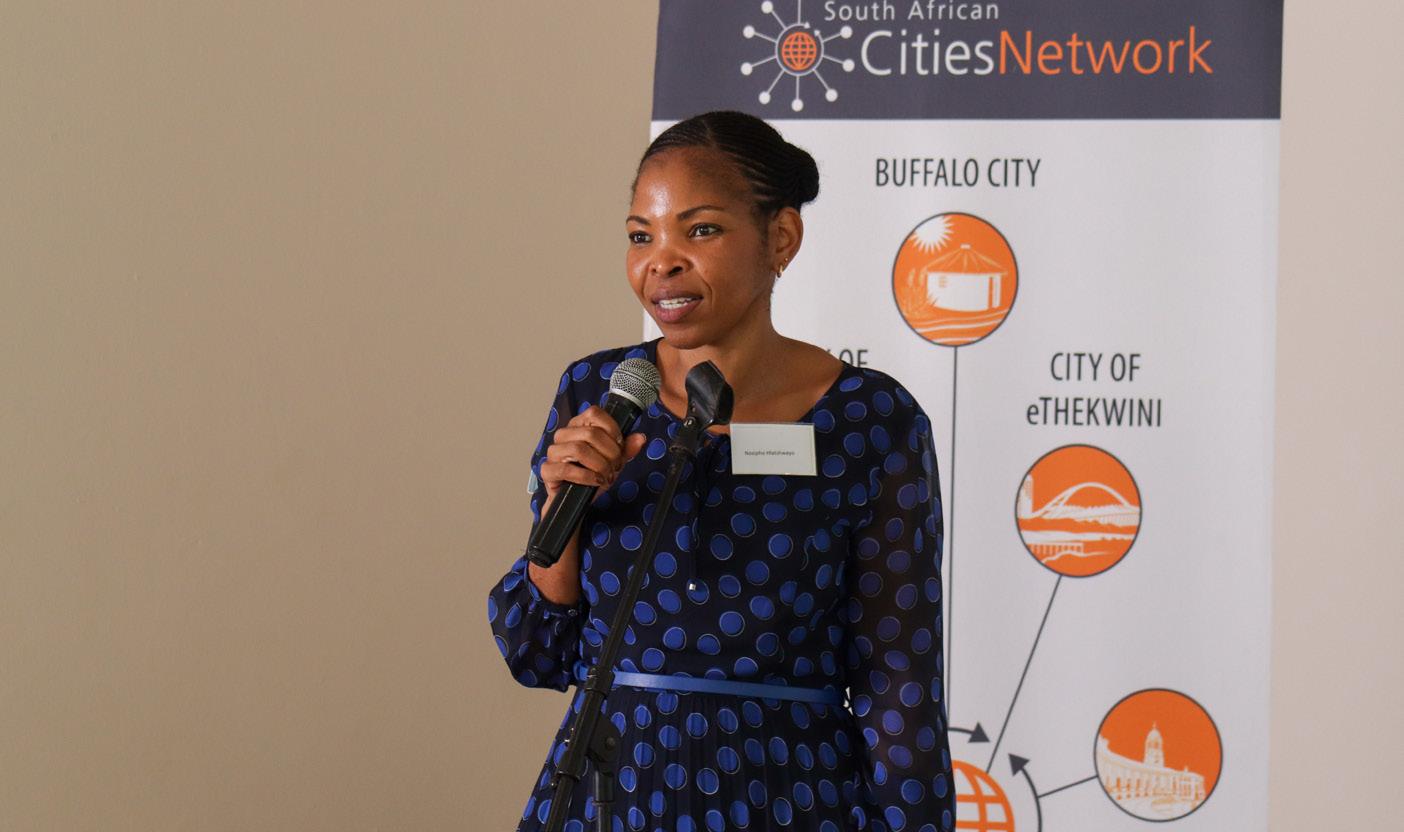
welcomes Nosipho Hlatshwayo, the new CEO
On being re-elected as President of South Africa, President Ramaphosa declared that: “Through their votes our people expect all parties to work together within the framework of our constitution - and work together as political parties to achieve the objectives of a democratic society based on non-racialism, nonsexism and justice and to ensure stability and peace.”
Indeed, the focus now has to shift to the task at hand of tackling the triple challenges of poverty, unemployment and inequality that continues to wreak havoc in the country and threatens the livelihood of so many, to promote and create prosperity for all.
As we celebrate Nelson Mandela Month the words of our former President and iconic leader Nelson Rolihlahla Mandela resonates profoundly: “As long as poverty,
injustice, and gross inequality persist in our world, none of us can truly rest.”
Fittingly Municipal Focus pays tribute to Nelson Mandela, a formidable statesman, by capturing his meaningful life and the legacy he left us.
In this JulyAugust edition of Municipal Focus we also celebrate Women’s Month, and our Front Cover story showcases the young, new CEO of South African Cities Network (SACN), Nosipho Hlatswayo, who steps in with a plethora of knowledge and experience in local government, and has filled the seat that Sithole Mbanga left when he took the reigns as SALGA’s CEO.
The Electoral Commission unpacks the seat allocation following the 2024 Elections – and as we navigate this historic juncture in the life of our country, we explore the operationalisation of the ‘unprecedented’ Government of National Unity (GNU) that
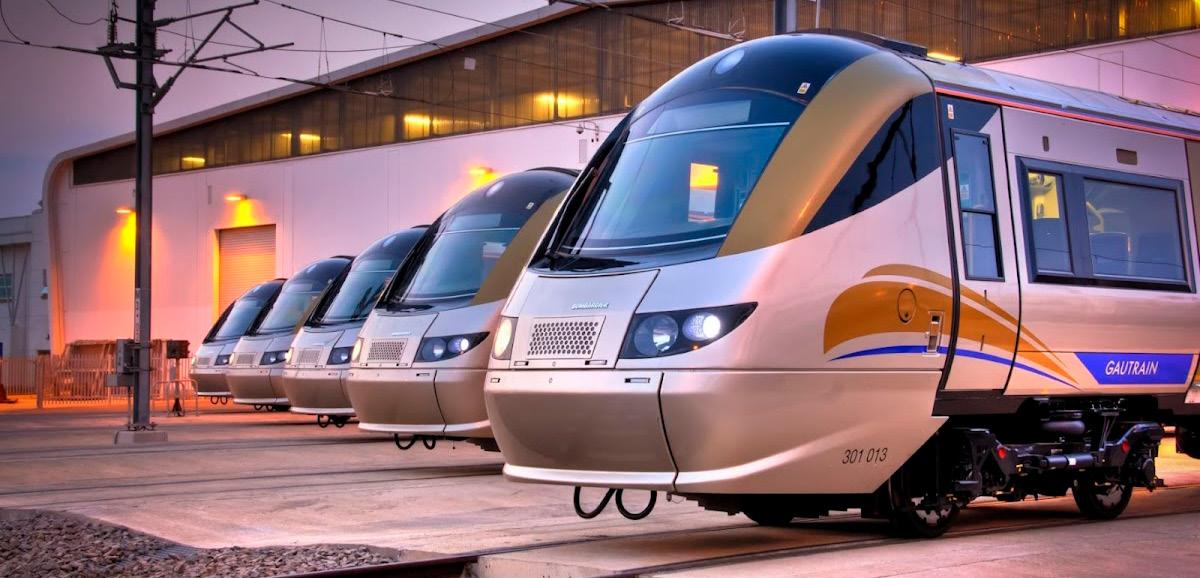

arises from the recent electoral outcomes.
The spotlight also falls on the MTN Foundation that remains committed to empowering the next generation of digital talent and is firmly ensconced in the fight against unemployment - making a practical contribution to fostering scarce skills, and encouraging women and youth to enter the digital space that is essential to the SA’s prosperity, and our international competitiveness.
This year’s TVET Month focus shines a light on Lovedale TVET College in the Eastern Cape that has nurtured the education of some of the country’s most disadvantage and vulnerable youth. This year the college celebrates 200 years of profoundly impacting the socio-political landscape of South Africa and producing many influential leaders and intellectuals.
We also take a look at Capricorn TVET College, that under the sterling leadership of Principal Lekau Mamabolo, is destined for new heights with the establishment of a specialised Skills Center at the Sheshego Campus that will enhance the college's reputation as a hub for innovation and excellence.
Enjoy the read and keep safe!


Nedbank is committed to being the business banking partner for the public sector. Our bigger-picture approach to banking is designed to provide groundbreaking solutions for your municipality. With the expertise and knowledge of our community specialists, we can ensure continuity, accessibility and quick decision-making that guides your business growth.


Think bigger. Think Nedbank Commercial Banking. For more information email us at publicsector@nedbank.co.za.














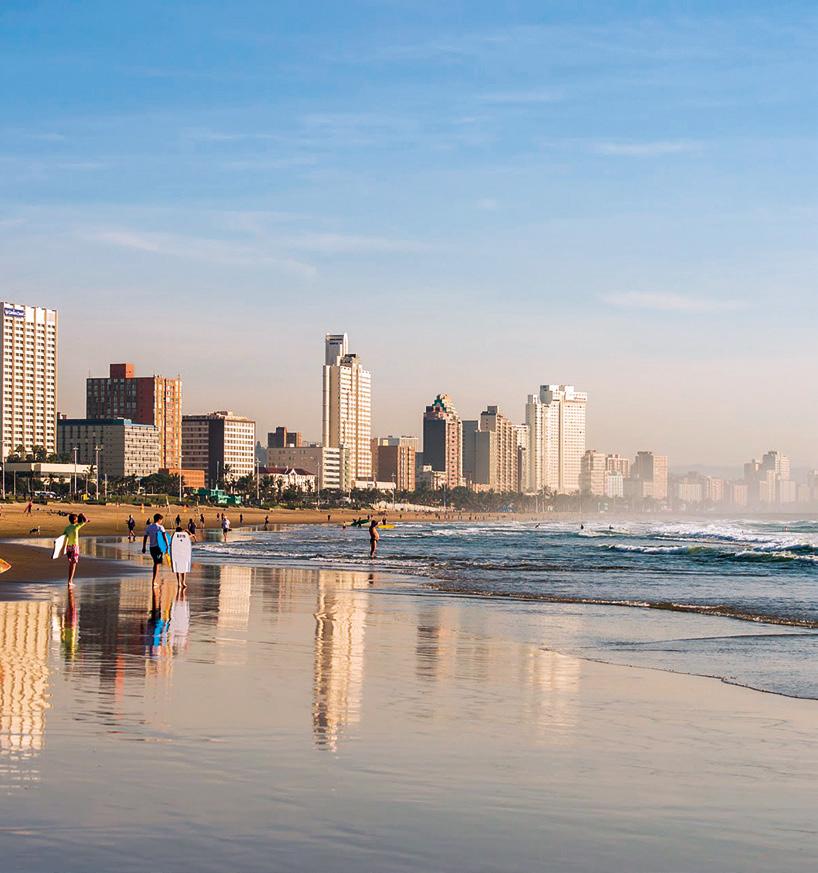




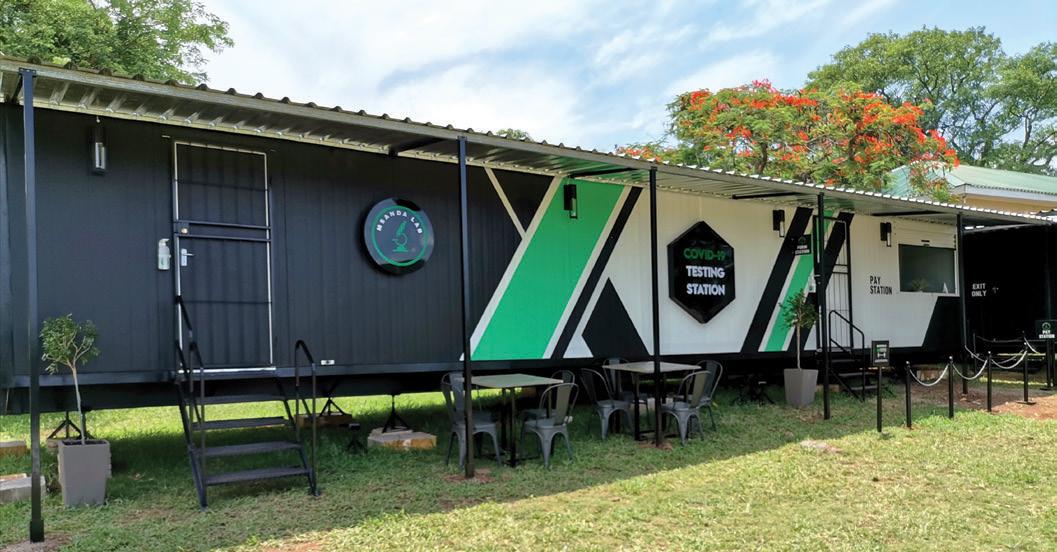

52 ELIDZ - Welcoming in new investments and a new CEO
58 MDB - On a dynamic drive to enhance public participation in demarcation processes
60 GAUTRAIN - Contribution to sustainable development
62 CONLOG Celebrating a prestigious RT29 tender win
72 eThekwini
74 Winnie Madikizela-Mandela Local Municipality
77 Rustenburg Local Municipality
78 Joburg's #Readformandela book donation drive


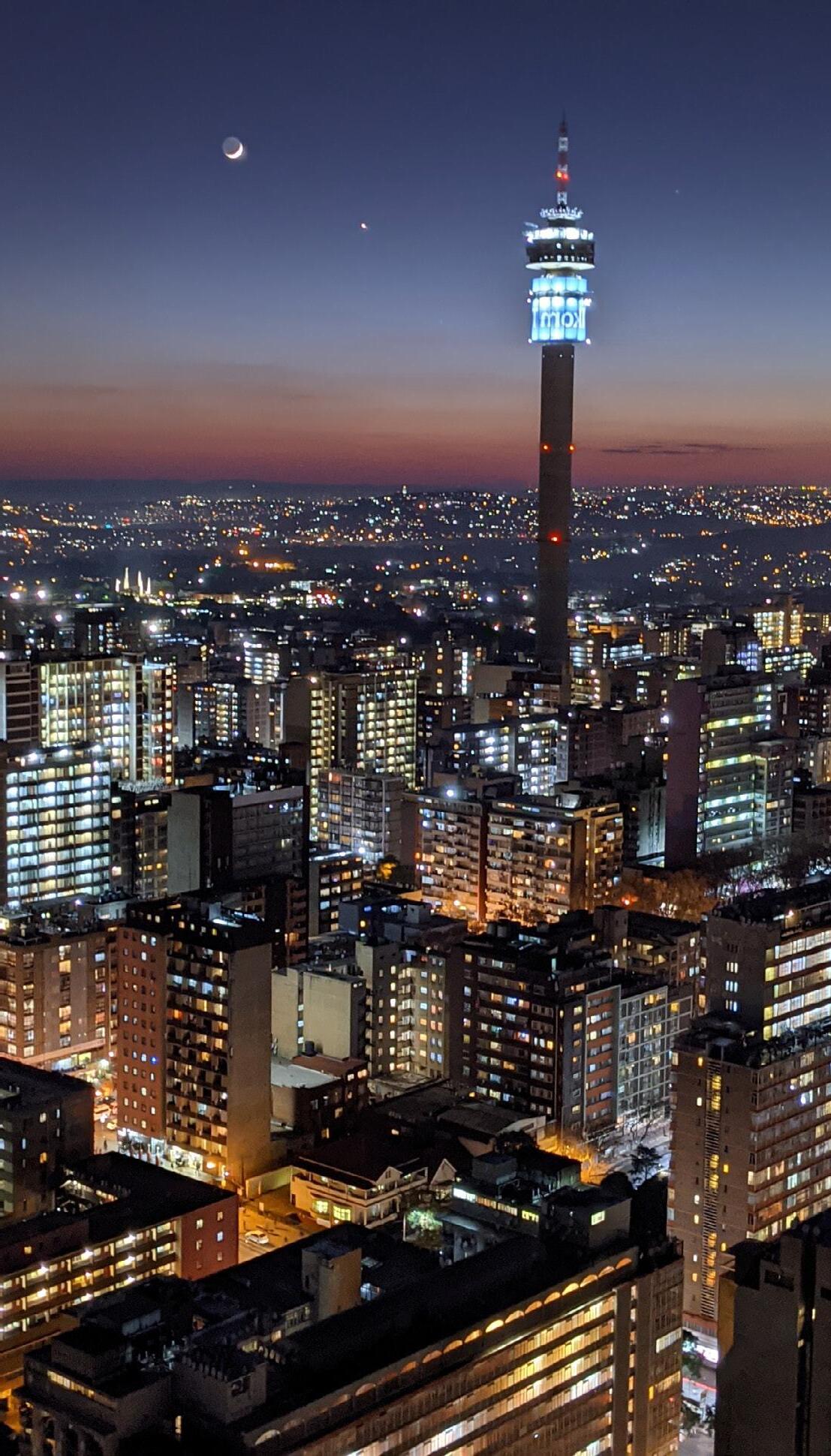
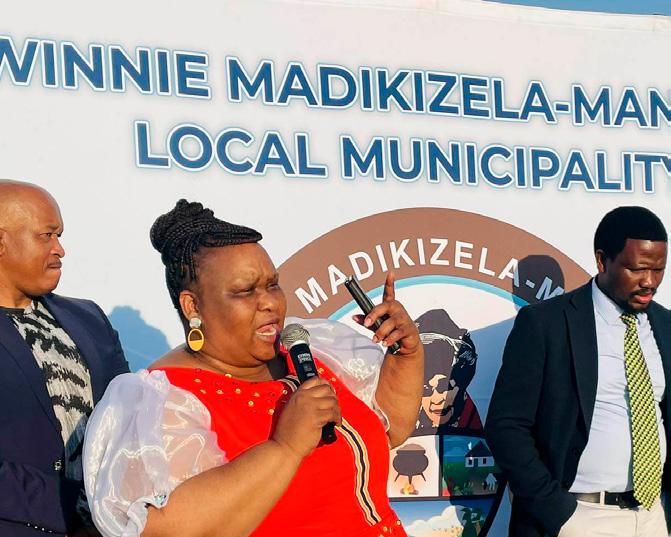
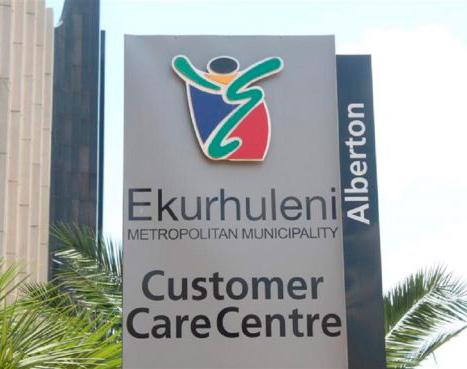


“Communications, Marketing and Advertising are indispensable tools towards success and growth in any business venture…”
“Communications, Marketing and Advertising are indispensable tools towards success and growth in any business venture…”
Kweda Media & Communications offers a diverse range of business and sales solutions, strategies and ideas that are customised to meet our clients’ standards and exceed their expectations.
Kweda Media & Communications offers a diverse range of business and sales solutions, strategies and ideas that are customised to meet our clients’ standards and exceed their expectations.
Our Vision is driven by the passion to inspire, assist and elevate business enterprises by forming strategic collaborations that will yield multiple benefits of success and growth for all.
Our Vision is driven by the passion to inspire, assist and elevate business enterprises by forming strategic collaborations that will yield multiple benefits of success and growth for all.
Kweda Media and Communications is a Proudly South African, 100% black female owned company located in Plumstead, Cape Town, registered as a private company since May 2014 - we hold a level 1 B-BBEE certificate. We are a team of multi skilled staff members who have a fresh, innovative and diverse approach to working and always willing to put in the extra time and attention to ensure great service delivery on time.
Kweda Media and Communications is a Proudly South African, 100% black female owned company located in Plumstead, Cape Town, registered as a private company since May 2014 - we hold a level 1 B-BBEE certificate. We are a team of multi skilled staff members who have a fresh, innovative and diverse approach to working and always willing to put in the extra time and attention to ensure great service delivery on time.
Your vision… our drive
Your vision… our drive


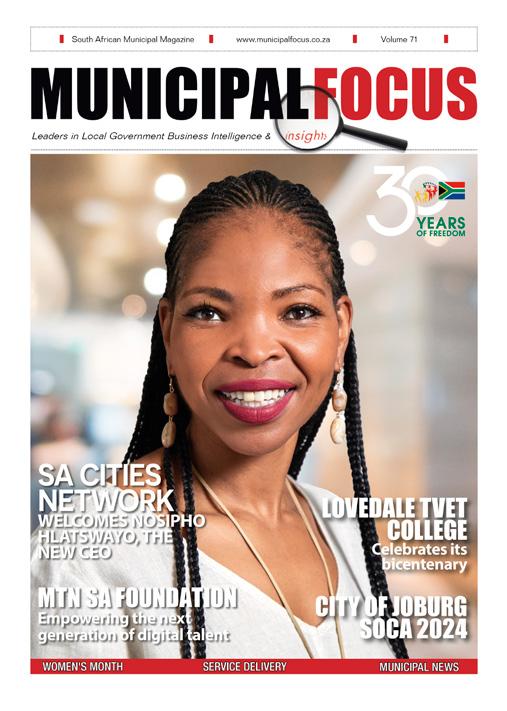
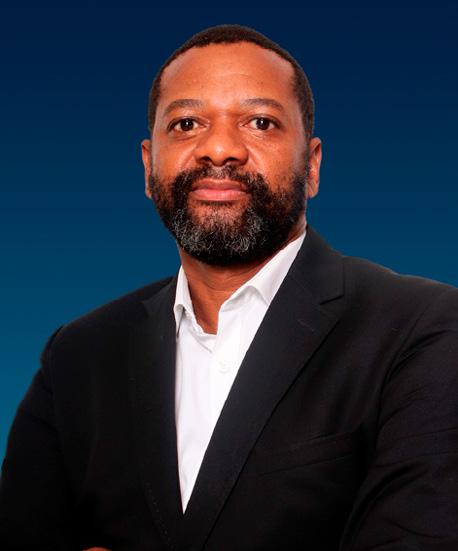

SIMO MKHIZE
SITHOLE MBANGA CEO: SA CITIES NETWORK
SIMO MKHIZE
EDITOR
PUBLISHING EDITOR
PUBLISHING EDITOR
Nardine Nelson nardine@kwedamedia.co.za +27 82 739 3932
Nardine Nelson nardine@kwedamedia.co.za +27 82 739 3932
nardine@kwedamedia.co.za +27 82 739 3932
Nardine Nelson nardine@kwedamedia.co.za +27 82 739 3932
EDITORIAL CONTRIBUTORS
EDITORIAL CONTRIBUTORS
Contributors
EDITORIAL CONTRIBUTORS
Contributors
Nelson Nkhoma
Happy Nkhoma Isaac Mahlangu
Happy Nkhoma
Isaac Mahlangu Madala Thepa
Contributors Happy Nkhoma Isaac Mahlangu Madala Thepa
Nwabisa Pondoyi Madala Thepa
Madala Thepa Mzukona Mantshontsho Madire Mashabela
Nwabisa Pondoyi Madala Thepa
MAGAZINE DESIGN & LAYOUT
MAGAZINE DESIGN & LAYOUT
MAGAZINE DESIGN & LAYOUT
MAGAZINE DESIGN & LAYOUT
Digital Pixels Studio
Digital Pixels Studio Paul Sampson paul@digital-pixels.co.za
MAGAZINE DESIGN & LAYOUT
KCDA Design Agency Jaco Kotze jk@kcda.co.za
Digital Pixels Studio Paul Sampson paul@digital-pixels.co.za
Paul Sampson paul@digital-pixels.co.za
Digital Pixels Studio Paul Sampson paul@digital-pixels.co.za
Advertising Bongani Matwa bongani@kwedamedia.co.za Nazly Leite nazly@kwedamedia.co.za
Advertising Mphumzi Njovana mphumzi@kwedamedia.co.za Nazly Leite nazly@kwedamedia.co.za
Advertising Mphumzi Njovana mphumzi@kwedamedia.co.za Nazly Leite nazly@kwedamedia.co.za
Advertising Mphumzi Njovana mphumzi@kwedamedia.co.za Nazly Leite nazly@kwedamedia.co.za
Advertising Mphumzi Njovana mphumzi@kwedamedia.co.za
Nazly Leite nazly@kwedamedia.co.za
Zelda McKop zelda@kwedamedia.co.za
Production production@kwedamedia.co.za
Production production@kwedamedia.co.za
Production Rayhaan Suleiman production@kwedamedia.co.za
Production Rayhaan Suleiman production@kwedamedia.co.za
Administration Tameryn Moses tameryn@kwedamedia.co.za admin@kwedamedia.co.za
Production production@kwedamedia.co.za
Administration Tameryn Moses tameryn@kwedamedia.co.za admin@kwedamedia.co.za
Administration/Finance Tameryn Moses tameryn@kwedamedia.co.za
DISTRIBUTION
DISTRIBUTION
SACN CEO: NOSIPHO HLATSWAYO
SITHOLE MBANGA CEO: SA CITIES NETWORK
National Assembly, National Municipalities:
GCIS, Assembly, National Provincial Municipalities:
Administration admin@kwedamedia.co.za subscriptions@kwedamedia.co.za
Subscriptions / Distribution subscriptions@kwedamedia.co.za
Marketing / Distribution Nozi Mbanjwa marketing@kwedamedia.co.za
Administration subscriptions@kwedamedia.co.za
Subscriptions / Distribution subscriptions@kwedamedia.co.za
GCIS, National Assembly, NCOP, National & Provincial Departments, Municipalities: Mayors, Managers, Heads of Procurement, Tenders and Purchasing Officers, Conferences and the Private Sector

GCIS, National Assembly, NCOP, National & Provincial Departments, Municipalities: Mayors, Managers, Heads of Procurement, Tenders and Purchasing Officers, Conferences and the Private Sector
Officers, Conferences Sector
Procurement, Tenders and Purchasing Officers, Conferences
DIGITAL E-BOOK CREATION
DIGITAL E-BOOK CREATION

www.KCDA.co.za
www.digital-pixels.co.za CCO: CELL C
www.digital-pixels.co.za CCO: CELL C
PUBLISHED BY Kweda Media & Communications
PUBLISHED BY Kweda Media & Communications






Media Communications 1 The Village Square, Main Road, Cape +27 (21) 768 0115 www.kwedamedia.co.za
1 The Village Square, Main Road, Plumstead, Cape Town Tel: +27 (21) 768 0115 www.kwedamedia.co.za
PUBLISHED BY Kweda Media & Communications 1 The Village Square, Main Road, Plumstead, Cape Town Tel: +27 (21) 768 0115 www.kwedamedia.co.za
Communications Village Main Road, Plumstead, Cape Town Tel: +27 (21) 768 0115 www.kwedamedia.co.za
1 The Village Square, Main Road, Plumstead, Cape Town Tel: +27 (21) 768 0115 www.kwedamedia.co.za
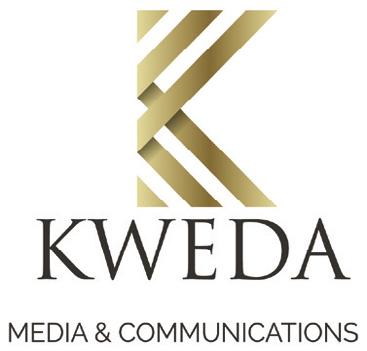
All editorial, business and production correspondence should be addressed to Municipal Focus, PO Box 12454 Plumstead 7800. Manuscripts, illustrations and other material must be accompanied by a stamped, self-addressed envelope. No responsibility can be accepted for unsolicited material. The editor reserves the right to amend and to alter copy and visual material as deemed necessary. Copyright by Kweda Media & Communications. All rights reserved. No part of this publication may be reproduced, stored in a retrieval system or transmitted by any form or any means without prior permission of the publisher. The opinions expressed in Municipal Focus are not necessarily those of the publishers.
editorial, and production correspondence should be addressed to Municipal Focus, PO Box 12454 Plumstead 7800. Manuscripts, illustrations and other material must be accompanied by a stamped, self-addressed envelope. No responsibility can be accepted for unsolicited material. The editor reserves the right to amend and to alter copy and visual material as deemed necessary. Copyright by Kweda Media & Communications. All rights reserved. No part of this publication may be reproduced, stored in a retrieval system or transmitted by any form or any means without prior permission of the publisher. The opinions expressed in Municipal Focus are not necessarily those of the publishers.
All editorial, business and production correspondence should be addressed to Municipal Focus, PO Box 12454 Plumstead 7800. Manuscripts, illustrations and other material must be accompanied by a stamped, self-addressed envelope. No responsibility can be accepted for unsolicited material. The editor reserves the right to amend and to alter copy and visual material as deemed necessary. Copyright by Kweda Media & Communications. All rights reserved. No part of this publication may be reproduced, stored in a retrieval system or transmitted by any form or any means without prior permission of the publisher. The opinions expressed in Municipal Focus are not necessarily those of the publishers.
business and production correspondence should be addressed to Municipal Focus, PO Box 12454 Plumstead 7800. Manuscripts, illustrations and other material must be accompanied by a stamped, self-addressed envelope. No responsibility can be accepted for unsolicited material. The editor reserves the right to amend and to alter copy and visual material as deemed necessary. Copyright by Kweda Media & Communications. All rights reserved. No part of this publication may be reproduced, stored in a retrieval system or transmitted by any form or any means without prior permission of the publisher. The opinions expressed in Municipal Focus are not necessarily those of the publishers.
All editorial, business and production correspondence should be addressed to Municipal Focus, PO Box 12454 Plumstead 7800. Manuscripts, illustrations and other material must be accompanied by a stamped, self-addressed envelope. No responsibility can be accepted for unsolicited material. The editor reserves the right to amend and to alter copy and visual material as deemed necessary. Copyright by Kweda Media & Communications. All rights reserved. No part of this publication may be reproduced, stored in a retrieval system or transmitted by any form or any means without prior permission of the publisher. The opinions expressed in Municipal Focus are not necessarily those of the publishers.

All GEMS members have been sent the draft 2023 GEMS Annual Integrated Report and Financial Statements containing the official notice of the 2023 GEMS Annual General Meeting (AGM) taking place virtually via the Zoom platform on Wednesday, 31 July 2024 at 15:00.
In accordance with GEMS Rule 29.6, the GEMS Board of Trustees require members wishing to attend the AGM to register online by 15:00 on Wednesday, 31 July 2024 Please note that online registration will close at 15:00. No registration to attend the AGM will be allowed after 15:00. Accordingly, if you wish to attend the AGM, kindly go to www.gems.gov.za, click on the relevant link embedded in the 2024 GEMS AGM section and:
Complete the online registration form by 15:00 on Wednesday, 31 July 2024 It is important to note that only members who have registered will be admitted to the meeting;
Acquaint yourself with the Zoom user guide, which details Zoom’s functionality; and Download the Zoom software for an enhanced Zoom/AGM experience, should you prefer this to the standard Zoom/AGM web experience.
Contact details
0860 00 4367
www.gems.gov.za enquiries@gems.gov.za



Should you be unable to attend the AGM, you may appoint a proxy to attend, speak and vote on your behalf by completing the proxy form When returning your proxy form, kindly mark it for the attention of the Principal Officer with the reference 2024 GEMS AGM Proxy It is important to note that your proxy form must reach us by 16:00 on Wednesday, 24 July 2023 to be considered.
Proxy forms may be sent to:
• Email: enquiries@gems.gov.za;
• Fax: 0861 004 367; or
• Post: GEMS, Private Bag X782, Cape Town, 8000
For copies of the following AGM meeting documents, kindly go to www.gems.gov.za and click on the relevant link embedded in the 2024 GEMS AGM section:
• 2024 GEMS AGM Member Guide;
• 2024 GEMS AGM Agenda;
• 2024 GEMS AGM Proxy Form;
• 2023 GEMS Annual Integrated Report;
• 2023 GEMS Trustee Remuneration Report; and
• 2023 GEMS AGM Action List
We thank you for your ongoing support and look forward to seeing you at the AGM.





Effective 01 July 2024, Nosipho Hlatswayo became the new CEO of the South African Cities Network (SACN).
An urbanist with extensive experience in strategy development and implementation, Nosipho’s key focus areas is program development and evaluation across different sectors, including the built environment, finance, social services and economics in public, private and non-profit industries.
As CEO she will oversee the organisation’s strategic direction, build relationships with key stakeholders and partners, and drive initiatives that contribute to the sustainable development of South African cities.
Municipal Focus (MF) took the opportunity to speak with the new CEO, Nosipho Hlatswayo, getting to learn of her journey to this key position, her credentials, her passion for ‘future cities’, and a little about the person she is.
MF: Can you share a bit about your background in local government and what has inspired your professional journey?
Growing up, I did not have an interest in studying something like the Built Environment. In fact, I wanted to study medicine, either dentistry or pharmacy. However, growing up in KwaZulu-Natal, there was this separation between our Community and an Indian Community through a buffer zone, and I was intrigued by this, a physical separation between one community and the other. Moreover, somehow, we were never allowed to integrate.
As a young child, I always questioned this, and it bothered me that that's how things were, and I couldn't find the answers. These questions drove my path into the Built Environment as they ignited my curiosity about why we lived where we lived and why certain decisions were taken on our behalf. It wasn’t just about redesigning space, but how I could play a role in the Built Environment to ensure that those excluded from the system also find a voice outside of the legislative process. So even if you are not attending an IDP Meeting, for example, how do you, at least at the basic level, know how to engage? How do I get you to know your role, your rights and responsibilities in ensuring the system is accountable outside of politics? And how do you then also be active?
Earlier on, when I got into the profession, for me, it was that “WOW”,
there are people who are studying how cities are developed, why cities have shaped the way that they are, and how we can make them better. I now play a part in addressing cities’ challenges.
MF: What are the biggest challenges currently facing South African municipalities, and what role does the SACN play in addressing these?
Let’s start by acknowledging the successes that have accumulated over time due to the relatively new transformation agenda in South Africa. The municipalities we have today were established in 2000, so we’re dealing with 24 years of a system meant to integrate people physically and ideologically. It's important not to overlook the fact that this system is in place.
In terms of the challenges that still exist, the biggest one is the change management challenge, which has several elements:
When policies are introduced to improve the lives of our citizens, that process of change needs to be effectively managed with continuity from those who have championed the change. However, the turnover in leadership in municipalities, due to instability, politically or not, has made it difficult to effectively manage change.
This constant change makes it impossible to understand what we are changing and why.
The challenge of handling different perspectives in the system of governance, which is based on various political ideologies, has resulted in delays in decision-making and negative long-term implications for the cities. This challenge affects areas such as finance, environmental sustainability, climate change, and inclusion. We are
still struggling to understand what we are aiming for, and the best route to get there, outside of the realm of politics.
Another challenge we are dealing with is communication and collaboration between the various spheres of government, to ensure that everyone works together towards a common goal.
SACN’s role is crucial in all of this. Firstly, we have an advantage because we can see the entire system and identify opportunities for interface and collaboration. Secondly, because we sit outside of government, we work with everyone and have the best interests of the cities in mind.
Through the credibility we have established over the last 20 years as an organisation, we have a role to play in bringing those outsides of government to contribute to addressing societal challenges. Working with the system within the system can be faced with hurdles or administrative challenges. Our positioning allows us to navigate these two worlds with ease and agility, bringing everyone into the room.
MF: What leadership strategies have you found most effective in your career, and how will you apply them in your new role?
I plan to inspire a shared vision by creating an environment where everyone feels comfortable challenging the process. At SACN we want to change the status quo to enable others to act, meaning that we want to create a conducive environment for things to happen. If you’re asking what I bring to the table as the woman at the helm of SACN then I would have to say amongst others;
1. Leading from the heart and encouraging from the heart is essential. >
Celebrating people’s accomplishments.
3. Understanding that people are human beings and that work should not become a task that affects their personal lives and health.
MF: What are the short- and long-term vital strategic priorities for the South African Cities Network?
As part of our 10-year strategy extending to 2030, we are committed to deeply embedding ourselves within cities. By living and working closely with municipalities, we aim to fully understand their challenges and priorities, allowing us to co-create programs that effectively address their needs. Our ongoing commitment is to collaborate with cities and all of society to work towards liveable, safe, resource-efficient cities and towns that are socially integrated, economically inclusive, and globally competitive, where residents actively participate in urban life.
MF: How do you intend to foster collaboration across all of society to support municipalities and urban development?
Establishing sustainable partnerships is one of our core strategic objectives, and we place a high value on collaboration. Our approach to partnerships involves listening, understanding, and co-creating solutions. One of our key strengths is providing a platform that brings together diverse voices in urban development. This is achieved through our peer-to-peer learning platforms, various learning events, and flagship projects such as our Annual Urban Festival. We will continue to be a thought leader, a network of cities, and a convener of vital conversations, supporting municipalities and fostering urban development.
MF: What have been some of the most significant milestones in your career so far, and how have they prepared you for this role?
The highlights of my career have always been not about the position, but what I've been able to do with the platform that I've been given. Starting new initiatives in an organisation, seeing them succeed, and, in some instances, seeing them adopted as practice. Some of the key roles I’ve occupied include:
1. Group Head of Strategy at The City of Tshwane, responsible for strategy development, implementation, monitoring and evaluation
2. Being part of the South Africa Leadership Forum, where I was nominated
3. Starting something completely new at the City of Tshwane.
How has this prepared me for my new role?
1. I've constantly been reminded that if I have to succeed, I need to build a team or community that is of one mind that can buy into what we are trying to do because there is no loud voice in a community. Still, all voices are critical, and they contribute to building whatever we’re trying to achieve.
2. My past experiences have allowed me to work with and to understand diverse stakeholders from businesses, NGOs, and academic institutions, and whoever we are working with, to get them to see themselves as part of that project.
MF: What advice do you have for young people aspiring to leadership positions in urban development and management?
Firstly, things are always going to change, and the best thing one can do is to be curious. Be curious about

what is happening in your space and what is happening outside of your space, and connect the dots to see what opportunities these changes present for yourself, the sector and the industry.
Secondly, create networks of people; don’t be shy to do this; surround yourself with people who know better than you, who are more intelligent than you, and people who challenge you because only through that will you be able to learn, test some of your assumptions, and rethink some of your positions you hold. To follow the phrase, “strong opinions, loosely held”.
My advice to the young people who aspire to be leaders in the sector is to find ways outside of your regular

work to contribute to society and make it your mission to make a change. It does not need to be work-related. Find something that you are passionate about that is not only for your benefit but is for the greater good of society.
MF: We can see that you’re passionate about the work of the SACN, what about your role excites you the most?
I am ready to make a meaningful impact to our country’s urban future through my leadership role.
I'm zealously passionate about the future as an element of strategic thinking.
And as much as we are all focusing on solving the challenges of today's
actualities, we sometimes need help imagining the future we'd like to see. Venturing into this ‘future space’ is very exciting for me. What will the future of work look like in our municipalities? How will people commute in our cities? How will people engage with the government in the age of AI?
Technology is impacting everything; how does that impact space, and how do we design space around these technological advancements? So, all these questions about the future and how they can influence our strategies excite me, and it's the terrain we want to get into as the SACN.
So, looking into the future or at future exercises is exciting because it's something that has not been done that much by local government, or by
government in general. It will also allow us to utilise the various data sets that exist abundantly.
MF: What are your expectations for urban development in South Africa, and what role will the South African Cities Network play in shaping that future?
As the world evolves, so too does the landscape in which we operate. Pressing issues such as climate change, for instance, compel us to think and act differently, adapting our strategies to meet these new challenges. The SACN will be an organisation at the forefront of that change by generating futurefocused knowledge to guide evidencebased planning and efficient resource allocation in local government.
South Africa’s 2024 general elections have come and gone, but the seat calculation and allocation process remains a pivotal aspect of the democratic framework. By ensuring proportional representation, the system strives to reflect the nation's diverse political landscape, fostering inclusivity and accountability.


The 2024 elections marked a significant evolution in South Africa's democratic process. The inclusion of independent candidates represented a step towards greater inclusivity and representation, aligning with global trends towards more direct forms of democratic engagement.
With the elections come and gone, the dynamics of seat allocation come into sharp focus, playing a crucial role in shaping the political landscape. The system, designed to ensure proportional representation, aims to reflect the diverse voices of the electorate in both national and provincial legislatures.
South Africa's electoral system, based on proportional representation (PR), traditionally allocated seats in the National Assembly and provincial legislatures based on the percentage of votes each party received. This system aimed to ensure a fair reflection of the electorate's will, providing even smaller parties with a chance at representation. In 2024, the system was adapted to include independent candidates, adding a fresh layer of complexity and opportunity.
Members of the National Assembly and the nine Provincial Legislatures were elected based on a party-list, compensatory PR system. Political parties were represented in proportion to their electoral support, and, through the Electoral Amendment Act, introduced the participation of independent candidates within the current system.
To give effect to this, the 400 seats in the National Assembly have been split into two portions. One portion of 200 seats designated each province as a region, with each region allocated a number of seats depending on its population size. The electoral system for each region is still proportional representation, which means a party or independent candidate gets a
seat based on the voter support in that election. And a further 200 compensatory seats are allocated to political parties to bring back general proportionality of the seat allocation at the National Assembly.
It is for this reason that voters received three ballots – instead of the usual two ballots received in the past. They received a ballot for the provincial legislature and two ballots for National Assembly. This introduced a third ballot to accommodate independent candidates contesting a seat in the region for one of the 200 regional to National Assembly seats.
The National Assembly seats are awarded by first allocating seats for the regional representatives. Then calculating the national quota which determines the overall support for the political party to allocate the 200 national compensatory seats of the National Assembly. In final allocation you then subtract seats won at the region from each party’s national allocation to generate a remainder for compensatory proportional seat allocation. This is described in Schedule 1A of the Electoral Act. The method remains largely the same as the method used since 1994, with an adaptation to facilitate participation of independent candidates.
First, a quota is calculated to determine the number of votes required to win a seat. The quota is determined by dividing all the valid votes cast, by the number of seats available, then adding one to the result and disregarding fractions. This is calculated for each region, since each region will have a different number of seats available for contestation. The total number of valid votes cast in favour of a political party and independent candidate is then divided by the quota for each region.
Seats are allocated to each political party and independents using the quota. >
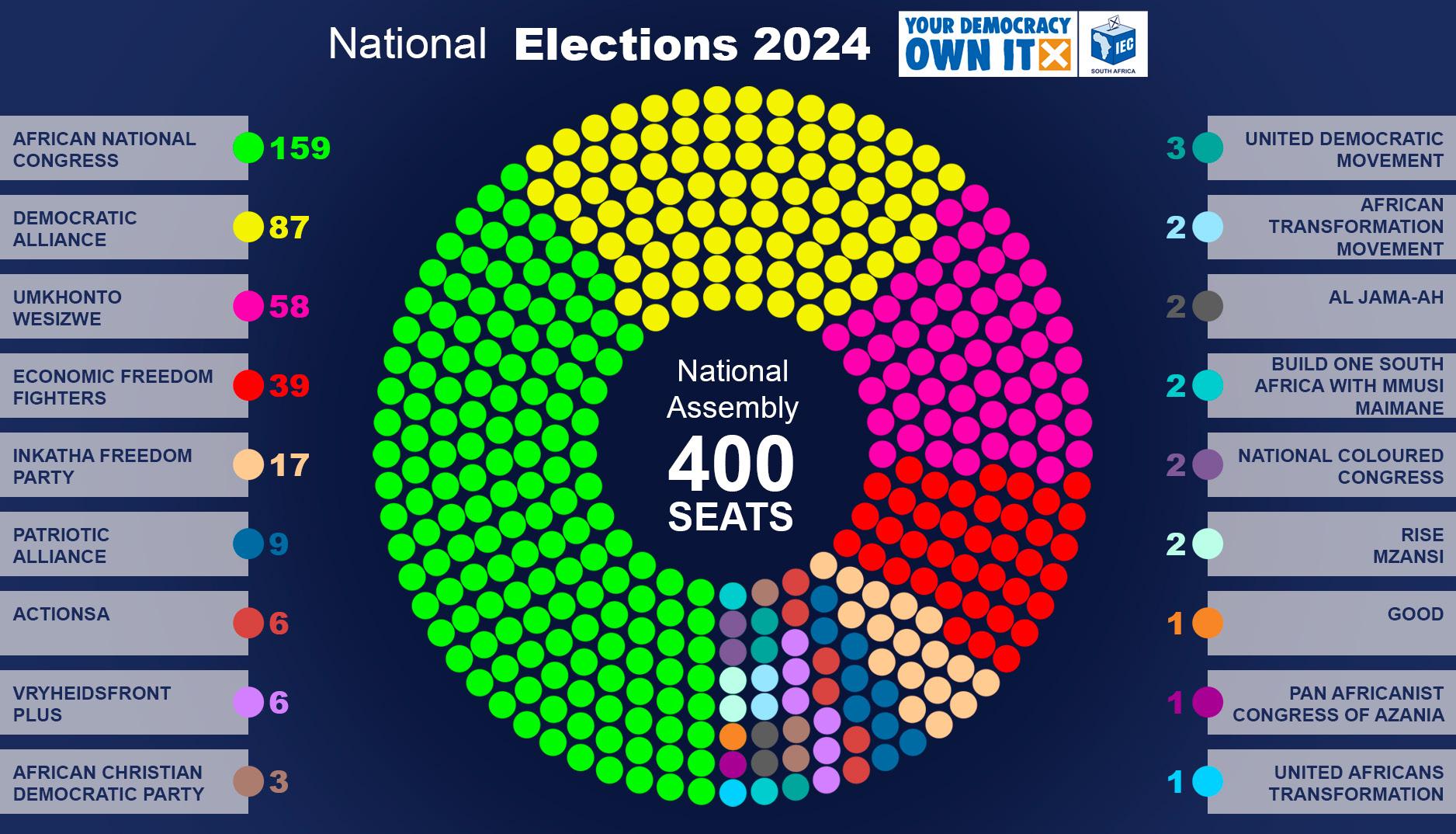
Not all the seats are allocated initially. The highest remainder method is used to allocate seats not allocated by awarding seats according to the sequence of highest surplus of votes until all seats have been allocated.
The 200 regional seats, allocated to the nine regions or provinces, were also determined for each region based on the number of registered voters in the region, with the result that more populated provinces have more regional seats than other provinces.
The Electoral Commission determined a provisional allocation of regional seats for each province to both political parties and independent candidates. Any unallocated seats were also allocated using the largest remainder method.
As it turned out, no seats were allocated to independent candidates as none received votes that met the required quota.
The 200 compensatory seats for the
national ballot with the list of political parties was calculated as follows:
All the valid votes cast for a political party, on both the regional ballots across the nine provinces and the votes cast on the national compensatory ballot for that party, are added.
This was divided by all 400 seats in the National Assembly plus one, minus seats allocated to independent candidates. The sum gave the quota required.
The total number of votes received by parties across both the regional and national compensatory ballot were divided by the quota, to yield the number of seats allocated to a party. At this stage, the allocation remains provisional. Because the votes cast for parties in this calculation includes the votes cast in the region, and therefore the seats allocated to them in relation to the proportion of votes cast for them is accounted for here, the seats allocated to that party are subtracted.
Thus, the final allocation of seats is concluded by subtracting the regional seats given to a party in the first allocation to ensure overall proportionality.
This process is similar to seat allocation to all municipalities with wards. The electoral system is a mixed system of proportional representation and Constituency based system (for ward elections).
For Provincial Legislature seats, provinces remained a single-tier multi-member constituency and the simply proportional system applied.
Political party candidates off party lists competed on the same provincial ballot as independent candidates vying for a seat in a provincial legislature. The seats are allocated by determining a quota and apply to total valid votes for the parties and independents. Those who meet the quota are allocated

the number of seats determined. If there are seats left over a second allocation is process based on ranking remainders by highest value until all seats are allocated.
View the details of the seat calculation process at: www.elections.org.za/content/ Elections/2024-National-andprovincial-elections/NPE-Seatcalculation-process/
The proportional representation system had several significant implications:
• Coalition Governments: The likelihood of coalition governments increased as no single party often wins an outright majority. This necessitates alliances and collaborations, fostering a more cooperative political environment.
• I nclusivity and Diversity: The system ensures that minority parties and marginalised groups
have a voice in the legislative process, promoting inclusivity and diversity.
• Accountability: By reflecting the electorate's will more accurately, the PR system enhances accountability, with parties needing to maintain broad appeal to secure votes.
Despite the difficulties encountered, the 2024 elections represent a credible record of the political choices of the voter in the country.
Accounts of observer experiences bear testimony to this, as does the Election Satisfaction Survey conducted by the Human Sciences Research Council. In this survey, over 90% of sampled voters during
this election were generally satisfied with the voting procedures. The voters also expressed unequivocal confidence in the Electoral Commission.
In his closing remarks at the results announcement of the 2024 elections on 2 June, Electoral Commission Chairperson Mosotho Moepya remarked: “These elections have tested the strength of our institutions, the integrity of our systems, and the resolve of our citizens. These elections were undoubtedly the most highly contested. As a nation, we have emerged triumphant, having conducted these elections with the utmost transparency, fairness, and adherence to the highest standards of democratic practice.”


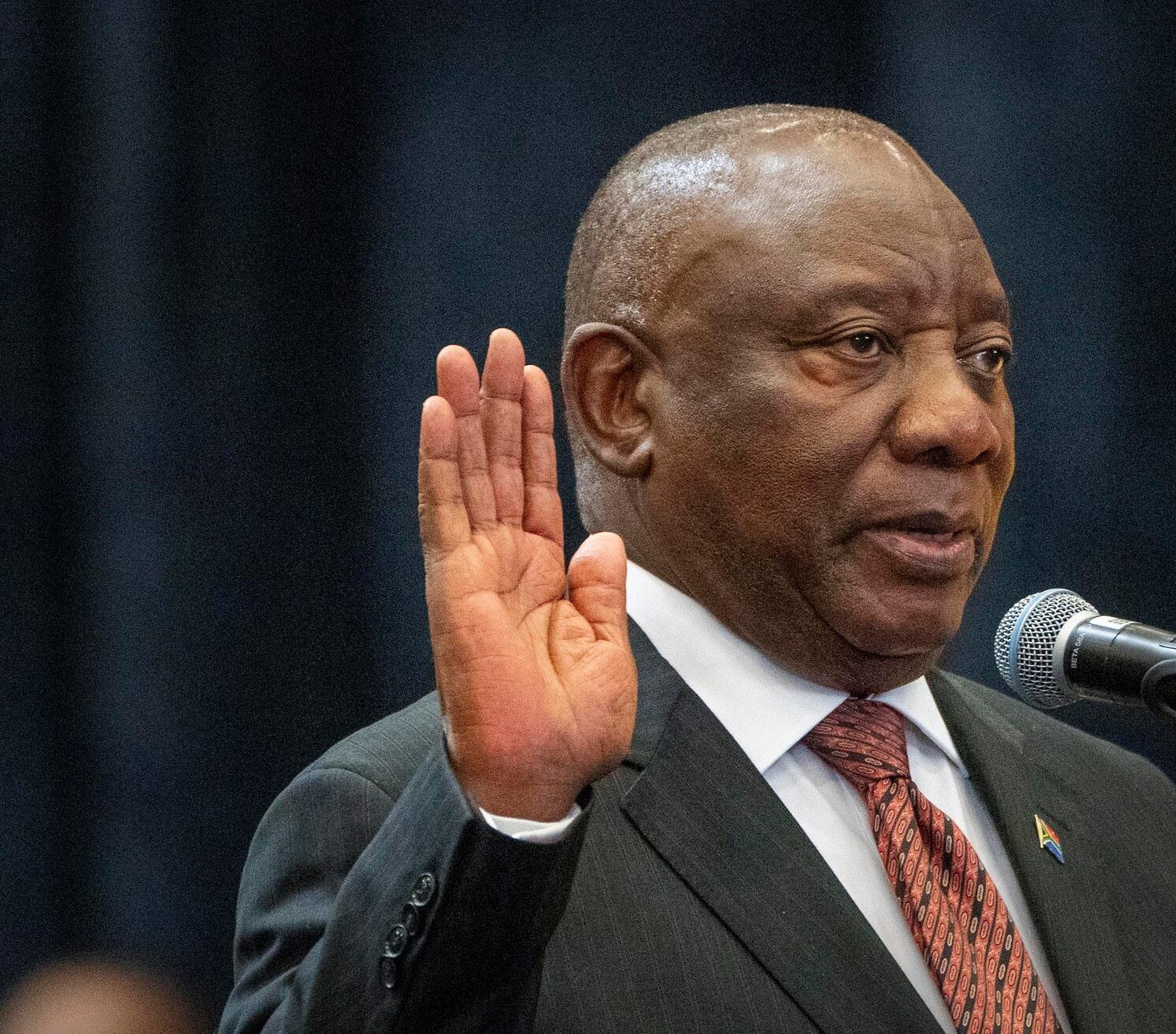
On July 3rd, 2024, South Africa marked a historic milestone with the inauguration of the Government of National Unity (GNU). This significant event saw the swearingin of the Deputy President, Ministers, and Deputy Ministers from various political parties, reflecting a broad-based coalition committed to inclusive governance. The formation of the GNU arises from the recent electoral outcomes and an agreement among political parties to collaborate, moving beyond partisan divisions to address the nation's pressing challenges.
Khumbudzo Ntshavheni Minister in The Presidency


The
It exemplifies the nation's commitment to inclusive governance, unity in diversity, and effective policy-making.
In his address on June 30th, 2024, President Cyril Ramaphosa described the GNU's establishment as "unprecedented in our democracy's history," highlighting its foundational principles and core priorities as articulated in the Statement of Intent. This framework sets the stage for a governance model that emphasizes inclusivity, collaboration, and strategic alignment with national development goals.
The operational framework of the GNU is rooted in the constitutional provisions where Executive authority is exercised collectively by the President and Cabinet members under section 85(2) of the Constitution. This collective responsibility ensures
that the implementation of national legislation, policy development, coordination of state departments, and legislative initiatives are conducted in a manner that reflects the diverse perspectives within the coalition. The President and Cabinet members share the duty of steering the country towards achieving its socio-economic objectives, ensuring that all decisions and policies are inclusive and representative of the diverse South African populace.
The GNU's decision-making process is designed to foster collaboration and consensus-building. Non-routine matters and decisions with significant financial implications are brought before the Cabinet for approval. This approach ensures that key decisions are made collectively, preventing unilateral actions that could undermine the GNU's integrity and effectiveness.
The President and individual Ministers are obligated to present significant policy issues, decisions with financial consequences, and other critical matters to the Cabinet for consideration. This process reinforces the principle of >
collective responsibility and ensures that all major decisions are aligned with the GNU's overarching goals and principles.
The GNU's strategic direction is encapsulated in the Medium-Term Strategic Framework (MTSF), which aligns with the National Development Plan (Vision 2030) and the manifestos of the coalition parties. The Forum of South Africa Directors-General (FOSAD), led by the Director-General in The Presidency, conducted a thorough analysis of the coalition parties' manifestos. The resulting proposal, discussed and adopted at the Cabinet Lekgotla on July 11th-12th, 2024, outlines the government's priorities and programme of action.
The MTSF provides a structured roadmap for achieving the GNU's objectives, with individual departments tasked with developing Strategic Plans and Annual Performance Plans that align with the MTSF targets. This alignment ensures that all government initiatives are coordinated and focused on achieving the overarching goals of
inclusive growth, socio-economic development, and national unity.
The National Treasury plays a crucial role in funding the implementation of the MTSF through the National Budget, which is tabled and approved by Parliament. The Department of Planning, Monitoring, and Evaluation (DPME) is responsible for overseeing and reporting on the implementation of the MTSF and the Annual Performance Plans. This oversight ensures that all government actions are aligned with the MTSF and that performance metrics are tracked and reported to both the President and the Cabinet. Regular reporting and evaluation of government initiatives promote accountability and transparency, essential components for building public trust and confidence in the GNU.
The transition from the 6th to the 7th Administration underscores the importance of continuity and

strategic alignment in the GNU's operations. Ministers from the 6th Administration concluded their roles on June 19th, 2024, coinciding with the assumption of office by the 7th Administration's President. The new Ministers were sworn in on July 3rd, 2024, and have since been engaging in departmental briefings and strategic planning ahead of the Cabinet Lekgotla. This transition period allows for a seamless handover of responsibilities, ensuring that the new administration can build on the achievements of its predecessor while setting the strategic direction for the future.
The GNU's establishment marks a significant milestone in South Africa's democratic evolution, emphasizing the principles of unity, inclusivity, and collaboration. By integrating diverse political viewpoints, the GNU aims to foster comprehensive policy-making that is responsive to the needs and aspirations of all South Africans. The success of the GNU hinges on the collective commitment of all stakeholders to prioritize national interests over partisan divides, working together to address the country's socio-economic challenges and promote sustainable development.
The GNU is uniquely positioned to address a wide range of national interests and challenges, leveraging the diversity of perspectives within its coalition structure. This inclusive approach allows for the development of more
comprehensive and effective policies that cater to the diverse needs of the South African populace. By incorporating inputs from various stakeholders, the GNU can develop strategies to tackle socio-economic disparities, promote sustainable development, and ensure equitable resource distribution across all regions of the country.
A key mandate of the GNU is to enhance governance structures and institutional capacity through collaboration and shared responsibility among coalition partners. This approach fosters better coordination among government departments and agencies, leading to more cohesive and integrated policy implementation. The emphasis on strategic planning and performance management ensures that the GNU's actions are focused and purposeful, enabling effective monitoring and evaluation of government initiatives. By continuously improving governance practices, the GNU aims to build a more efficient and responsive government that can effectively address the needs of its citizens.
One of the GNU's top priorities is to build a resilient and inclusive economy that benefits all South Africans. This entails promoting entrepreneurship, innovation, and investment in critical infrastructure to stimulate economic growth and job creation. The government aims to create an enabling environment for business develop-
ment, supporting small and medium-sized enterprises (SMEs) and encouraging foreign investment. Additionally, the GNU prioritizes social development and human capital investment, ensuring access to quality education, healthcare, and social services for all citizens. These initiatives are essential for enhancing the well-being and capabilities of the population, thereby fostering sustainable development and inclusive growth.
The establishment of the GNU is not only about governance and policy-making but also about promoting social cohesion and national unity. By fostering dialogue, respect, and understanding among diverse communities, the government aims to build a more cohesive and harmonious society. Celebrating South Africa's cultural diversity and heritage plays a crucial role in promoting national identity and pride. Inclusive governance practices that involve civil society and other stakeholders contribute to building trust and legitimacy in government institutions. These efforts are vital for strengthening the social fabric and fostering a sense of belonging and solidarity among all citizens.
The GNU's economic strategy focuses on strengthening key sectors to drive growth and enhance competitiveness. Key industries such as manufacturing, agriculture, mining, and services are targeted for development and support.
By investing in infrastructure, technology, and skills development, the government aims to boost productivity and innovation in these sectors. Initiatives to improve market access, streamline regulatory processes, and provide financial incentives are also part of the strategy to foster a more dynamic and competitive economy. The GNU's approach emphasizes the importance of public-private partnerships in driving economic growth and creating sustainable employment opportunities.
The operational framework of the GNU is rooted in the constitutional provisions where Executive authority is exercised collectively by the President and Cabinet members under section 85(2) of the Constitution.
The GNU recognizes the critical role of digital transformation in driving economic growth and improving service delivery. By embracing the Fourth Industrial Revolution, the government aims to harness the potential of emerging technologies such as artificial intelligence, big data, and the Internet of Things. Investments in digital infrastructure, skills development, and innovation ecosystems are central to the GNU's digital strategy. The government also prioritizes the digitalization of public services to enhance efficiency, transparency, and accessibility. By fostering a digital economy, the GNU seeks to position South Africa as a leader in technology and innovationon the African continent and beyond. >
Environmental sustainability is a key component of the GNU's agenda, reflecting a commitment to green growth and sustainable development. The government aims to balance economic growth with environmental protection, ensuring that development efforts do not compromise the health of ecosystems and natural resources. Initiatives to promote renewable energy, reduce carbon emissions, and enhance resource efficiency are central to the green growth agenda. The GNU also focuses on strengthening environmental regulations and enforcement mechanisms to protect biodiversity and combat climate change. By promoting sustainable practices across all sectors, the government seeks to create a resilient economy that can adapt to environmental challenges and ensure the wellbeing of future generations.
The GNU recognizes the importance of international relations in achieving its national development goals. By building strategic partnerships with other countries, regional organizations, and international institutions, the government aims to enhance trade, investment, and cooperation. These partnerships are crucial for accessing global markets, attracting foreign investment, and benefiting from technological and knowledge transfers. The GNU's foreign policy emphasizes the principles of mutual respect, solidarity, and cooperation, aligning with South Africa's commitment to multilateralism and global governance. By
strengthening its international relations, the government seeks to position South Africa as a key player in global affairs and contribute to regional and global stability and prosperity.
The establishment of the Government of National Unity represents a significant step forward in South Africa's democratic journey. It exemplifies the nation's commitment to inclusive governance, unity in diversity, and effective policy-making. As the GNU embarks on its mandate, it is essential or all stakeholders
to uphold the principles of transparency, accountability, and collaboration. By working together and focusing on national interests, the GNU can address socioeconomic challenges, promote sustainable development, and build a prosperous future for all South Africans. Through strategic alignment and collective action, the GNU aims to set a positive example for democratic governance and contribute to South Africa's continued progress and prosperity. The success of the GNU will depend on the collective commitment and efforts of all South Africans to build a better, more inclusive, and sustainable future for the nation.



30-31 July 2024
Emperors Palace, City of Ekurhuleni BOOK YOUR SPOT!

South Africa, like many countries globally, grapples with the challenge of youth unemployment. This is supported by statistics indicating that of the 10 million young people aged between 15-35 years in South Africa - 45,5% are unemployed. Only 2,5 million were in the labour force, either employed or unemployed.
The main reason for being inactive is discouragement, i.e. They have lost hope of finding a job that suits their skills or in the area they reside. Facing and reducing these concer-
ning statistics is the responsibility of the public and private sectors. We must provide opportunities to create a culture of learning. Adoption of technology within disadvantaged communities is one of the key areas of focus which allows a greater contribution towards bridging the digital gap and addressing the high levels of poverty, inequality and unemployment South Africa is facing.
As the digital environment rapidly evolves, it is natural that South Africa should aspire to become an
‘e-skilled’ economy. There are, however, obstacles on the path, including our lack of science, technology, engineering, and mathematics (STEM) graduates and, where these skills do exist, the development of entre-preneurial skills is required to broaden participation in the IT field.
The MTN SA Foundation has a long-standing commitment to supporting technical and digital education, and for the second year running, their investment of R14 million to equip 900 unemployed young South Africans with marketable digital skill

If South Africa is to retain and develop its promise as one of the continent’s leading economies, the digital divide that separates the “haves” from the “have-nots” must be breached.
is a vote of confidence in the potential of the nation’s youth and a positive long-term step in helping secure South Africa’s place in an increasingly digital global economy.
It is up to us to work together to enable young south Africans to compete internationally in the sector - and this is where the MTN SA Foundation has stepped up to drive skills in areas where they matter most. In 2023 they launched the Digital Skills for Digital Jobs initiative, a program that combines digital qualifications with life and entrep-reneurship skills and is focused on addressing the issue of youth unemployment in South Africa, and a total of 900 unemployed youths across all 9 provinces (i.e.,100 learners per province) were registered for the 12-month program.
A total of 674 learners (of which 60 % were females) completed the programme and graduated in December 2023.
This year MTN has been barraged by an overwhelming influx of applications and a total of 5330 applications were received.
The 900 students selected for this year’s programme received training that included basic end-computing, coding, robotics, AI, and other essential skills to prepare them for a future in the competitive IT sector. >



The training courses offered by the MTN SA Foundation in partnership with the EBL Institute and Datacomb Development Hub are designed to be inclusive and are open to unemployed men and women who are not enrolled in any formal education or training programmes.
Offerings include courses that range from the fundamentals of strategy, the Internet of Things (IoT), data and big data, cybersecurity, data analytics and artificial intelligence, to designing e-commerce websites and the requirements of the Protection of Personal Information Act (POPI).
Structured to also offer opportunities for those with entrepreneurial instincts, the programme includes modules on various facets of establishing a business, life skills, career, and personal development where programme graduates will receive their SETA accredited certificates.
MTN regards equipping young men and women with these skills as the Foundation’s contribution to empowering deserving young people drawn primarily from disadvantaged communities with the skills required to achieve personal economic freedom through rewarding professional careers. Those who take the entrepreneurial path and start businesses will unlock their potential and as their enterprises grow, will become employers, and create further opportunities.
At the same time, they are addressing the high youth unemployment rate and creating a stream of qualified people ready to enter the multi-faceted world of IT. This will, hopefully, help inspire others to enter occupations that are essential to South Africa’s economic growth.
MTN SA is particularly proud of their efforts aimed at benefitting youth and disenfranchised women. By assisting these vulnerable people with the
skills necessary to achieve their dreams, they are making tangible contributions to strengthening the socio-economic fabric of our country.
Women entrepreneurs are making their mark across commerce and industry and presently are successfully tackling the world of tech and developing businesses that impact society. To further empower South African women in the world of technology, the MTN SA Foundation has since 2022 been offering additional opportunities to ten female alumnae of the Digital Skills for Digital Jobs program to further develop their enterprises through the MTN Women in Digital Business Challenge.
The Challenge, which displays the MTN SA Foundation’s commitment to empowerment in the digital economy, offers ten female digital pioneers a prize of R100,000 each, i.e. a further investment of R 1 million into the development of women and youth xof SA. The prize money is to be used for working capital, business development, purchasing tangible assets, and investing in business technology hardware, software, or IP.
Women make up just more than 50% of the South African population but are not represented as strongly as they should be in the broad IT industry. MTN SA believes that it is up to talented women to show what they can achieve within the science, technology, information, and mathematics (STEM) sectors in a country with massive skills and youth employment challenges.
Through the MTN Women in Digital Challenge, MTN extends opportunities for women to benefit professionally through the innovative and entrep-reneurial environment they will be creating for their growth.
Hopefully, their success will inspire others and encourage other women to start businesses or seek job opportunities within the IT sector.

To help entrants change the future face of the tech industry, the Foundation only accepts applications from the female DSDJ alumnae and screening is completed through its implementation partners.
From the initial applications, the women compete in a two-day “pitching competition” where they showcase their businesses and compete for a place in the ‘Top-10’.
Following this, the “Top 10” entrepreneurs enter a four-month mentorship journey in which they receive expert advice on how to grow their businesses and the adoption of marketing strategies. In addition, they are also given help to ensure that the financial and business management skills they require to run a successful small business are improved.
Once graduating from these programmes, each of the ten successful candidates receive their R100,000 funding for developing their businesses. The Foundation’s two MTN Women in Digital Business Challenge events hosted to date showed that women were not only capable of competing in the demanding IT sector, but also made significant contributions to society by closing gaps in IT education. They offered young learners opportunities to develop their skills by offering teaching and coding skills.
It is MTN’s view that a digitally empowered society is a winning society. If South Africa is to retain and develop its promise as one of the continent’s leading economies, the digital divide that separates the “haves” from the “have-nots” must be breached, this is why they continue to invest in these programmes so that all South Africans - and especially disadvantaged communities - can be equipped with the skills they need to grow into innovative entrepreneurs and reach their dreams.
South Africa’s female entrepreneurs have the talent to be successful and deal with business obstacles.
They are determined and adaptable people who can proudly take their places in a competitive technical environment – therefore the MTN SA Foundation considers it a privilege to be able to make a practical contribution to fostering scarce skills and encouraging women and youth to enter a sector that is essential to the prosperity of our people and our international competitiveness.
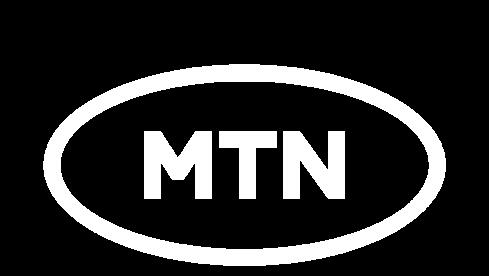
For more information on these and other MTN SA Foundation programmes, please visit www.mtn.co.za.
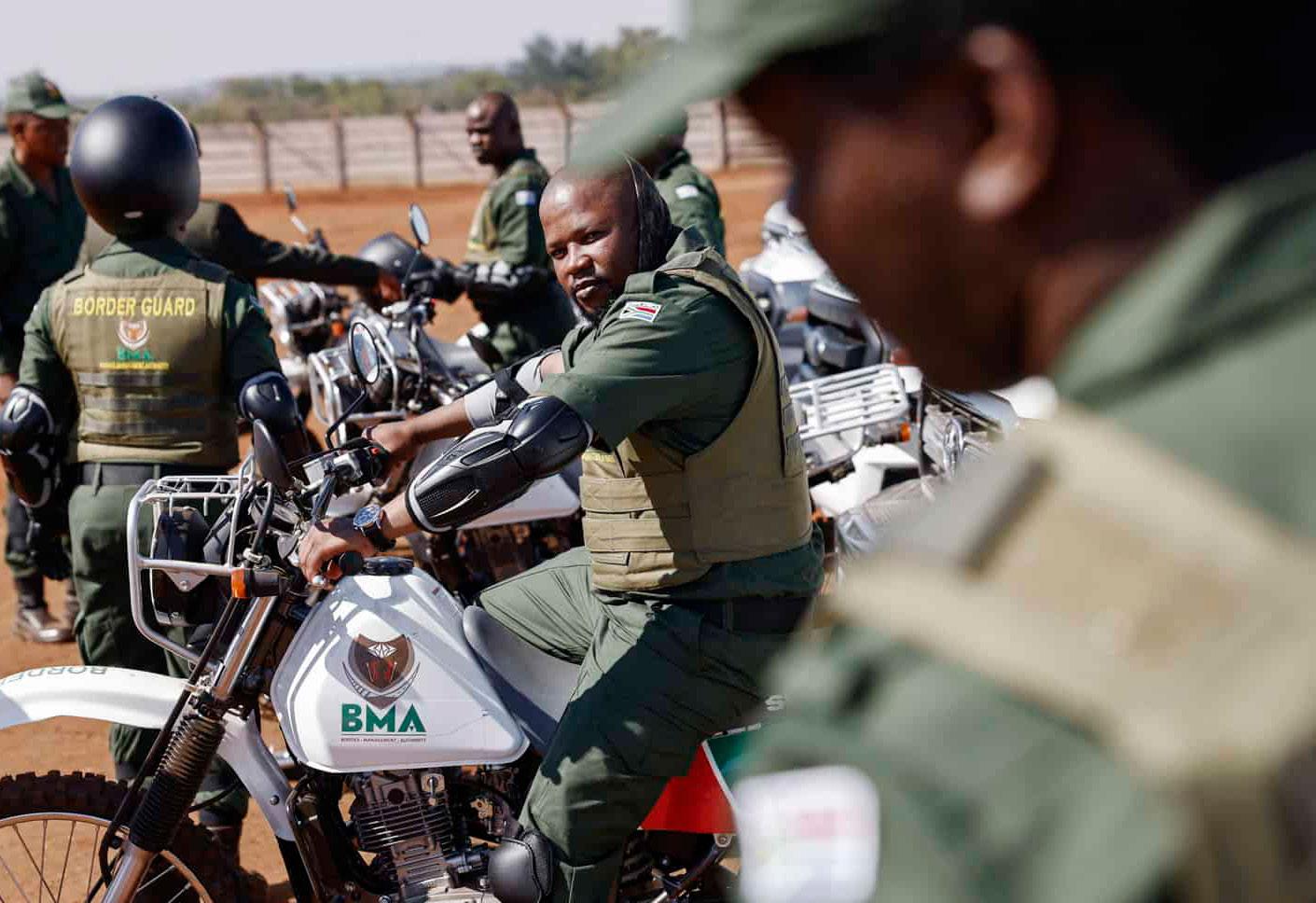
The mandate of the Border Management Authority (BMA) is to facilitate and manage the legitimate movement of people and goods across 71 ports of entry of which 52 are land, 10 are international airports, and nine are seaports.
The work of the BMA covers areas of:
• immigration
• port health
• environmental and agricultural biosecurity
This includes access control and general law enforcement at the ports of entry and border law enforcement areas. In safeguarding South Africa’s border
communities, the BMA continues to intercept prohibited items and those involved in cross border crimes are apprehended. With the Authority having celebrated its first-year anniversary since being formal establishment on the 1st of April 2023 arrests, detections and seizures have been made within the Ports of Entry within the 10km radius of the ports along the vulnerable segments of the borderline.
Cross border crime prevention is done in collaboration with key stakeholders such as the South African National Defence Force (SANDF), South Africa Police Service (SAPS) and the South African Revenue Service (SARS).
On immigration related issues, since the deployment of border guards in 2022, more than 281 000 persons were refused entry into South Africa. Over 95 000 arrests were made for immigration related transgressions as well as general criminal related issues in the border law enforcement area. In general, law enforcement operations by the BMA and other entities in the border area have resulted in the seizure of over 300 stolen vehicles since the Border Guards were deployed.
The Border Management Authority is made up of a formidable team led by Dr. Michael Masiapato as the Commissioner and Chief Executive Officer (CEO), and supported by two Deputy Commissioners, Maj Gen (rtd) David Chilembe who is in charge of Operations, and Mrs Jane Thupana who is in charge of Corporate Affairs. Commissioner Masiapato has been at the forefront of ensuring the integrity and security of the country's borders.
With his extensive experience in the justice, crime prevention, and security sectors, Dr. Masiapato has been instrumental in shaping policies and strategies to effectively manage the legitimate movement of people, goods, and services in and out of South Africa.
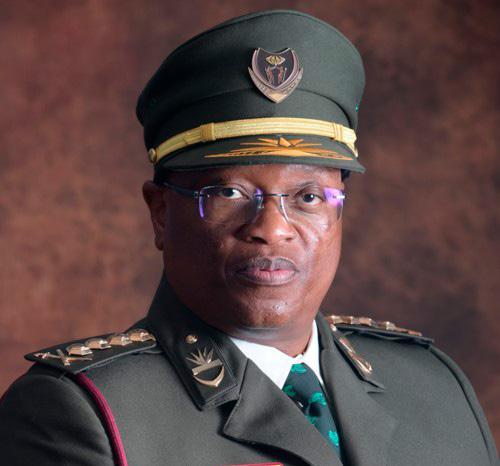


Commissioner, Dr Mike Masiapato’s journey in the public service spans over two decades during which he has worked in various capacities, including the police, defense intelligence, civilian intelligence structures, and the Financial Intel-ligence Centre. His diverse background has equipped him with a deep understanding of the complexities and challenges faced in securing the nation's borders.
Moreover, Dr. Masiapato holds two doctoral degrees - one in Literature and Philosophy from the University of Johannesburg, and another in Philosophy from the University of the Witwatersrand. He also possesses a Master's degree in Public Management from the University of Pretoria, further enhancing his knowledge and skills in public administration and policy development.
As the Commissioner and CEO of the BMA, Dr. Masiapato has been responsible for overseeing the implementation of the Border Management Authority Act, which aims to establish an integrated and coordinated border management system in South Africa. Under his leadership, the BMA has been working towards streamlining border processes, enhancing security measures, and promoting collaboration among various government agencies involved in border management.
To effectively secure South Africa's borders, the importance of collaboration and partnerships with various stakeholders, both domestically and internationally cannot be underestimated. The BMA has been actively engaged in fostering relationships with neighbouring countries, regional economic communities, and international organisations to share best practices, intelligence, and resources in border management. The BMA has also been working closely with other government agencies, such as the South African Police Service (SAPS), the South African Revenue Service (SARS), and the Department of Home Affairs, to ensure a coordinated and comprehensive approach to border security.
Dr. Masiapato as the leader of BMA acknowledges that securing South Africa's borders is not without its challenges. The country's extensive coastline, porous land borders, and the ever-evolving tactics of transnational organised crime syndicates require constant adaptation and innovation in border management strategies. However, he remains optimistic about the opportunities presented by technological advancements and international cooperation.
The BMA has been exploring the use of cutting-edge technologies, such as biometric systems, automated border
control gates, and data analytics to enhance border security and facilitate legitimate trade and travel. Moreover, Dr. Masiapato believes that strengthening regional integration and cooperation through platforms like the Southern African Development Community (SADC) and the African Union (AU) can lead to more effective border management and security across the continent.
Dr. Michael Masiapato's leadership and commitment in securing South Africa's borders have been instrumental in shaping the country's border management strategies and policies. His experience, ability, and collaborative approach have positioned him as a key figure in ensuring the integrity and security of the nation's borders. As the Commissioner and CEO of the Border Management Authority, Dr. Masiapato continues to drive innovation, foster partnerships, and adapt to the ever-changing challenges in border management. His dedication to preserving national security imperatives while helping legitimate trade and travel has been a testament to his commitment to serving the people of South Africa.
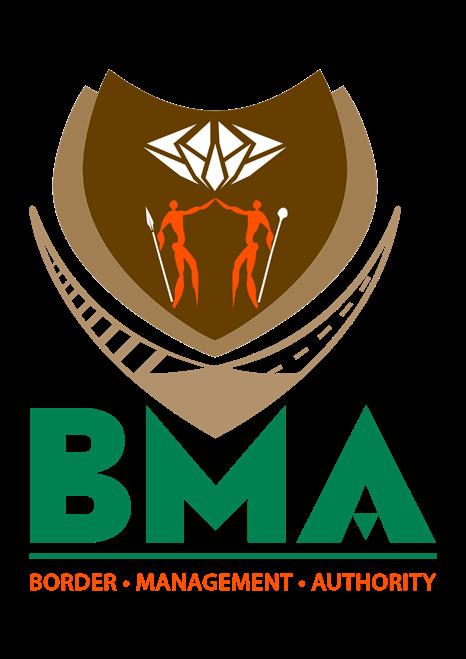

In a significant political development, Dr. Phophi Ramathuba, a distinguished medical doctor and seasoned politician, has been elected unopposed as the new Premier of Limpopo. This appointment makes her the first female Premier of Limpopo since the dawn of democracy in 1994. Dr. Ramathuba previously served with distinction as the Health MEC during the 6th administration, demonstrating her commitment to and proficiency in the healthcare sector in the province.
During her acceptance speech, Dr. Ramathuba emphasized that her election is a call to action and expressed gratitude to her predecessors, particularly outgoing
Premier Stanley Mathabatha, who entrusted her with the crucial health portfolio. She outlined the key priorities of her administration as those focused on:
• Combating Gender-Based Violence and Femicide (GBV)
• Creating job opportunities
• Improving water provision
• Enhancing tourism to promote Limpopo as a rich cultural holiday destination
Additionally, the 7th administration aims to drive industrialization and manufacturing to stimulate economic growth and development.
The new Speaker, Makoma Makurepetja, and Deputy Speaker,
“We are overly confident that Dr. Ramathuba will do justice in her new portfolio and take Limpopo to greater heights.”
Exec. Mayor of Polokwane, Makoro John Mpe
Portia Mamorobela, were also elected unopposed, further highlighting the significant representation of women in key legislative roles.
Dr. Phophi Ramathuba's remarkable journey began in the early 1970s in Ha-Mashamba village, Vhembe district, where she was raised by educator parents who instilled a love for education in her. She pursued a Bachelor of Medicine (MBCHB) at the Medical University of South Africa (MEDUNSA), now known as Sefako Makgatho Health Sciences University in Pretoria. Dr. Ramathuba's involvement in political activism dates back to her time as a medical student, where she served in various leadership roles.
Her dedication and exemplary performance in the healthcare sector led to numerous accolades, including the Premier's Service Excellence Award in 2015. Dr. Ramathuba has also been an advocate for gender and social activism and has maintained her fitness through sports participation, recently completing the Makoro 10km Marathon in March as a qualifier for the Comrades Marathon.
As Dr. Ramathuba prepares to lead Limpopo into its new chapter, all eyes are on the State of the Province Address (SOPA), where she is expected to elaborate on the government's plans for the province's future.























































































Lee Callakoppen, Principal Officer of Bonitas Medical Fund
Living a healthy lifestyle and having access to quality healthcare, has become a priority for South Africans. However, to achieve this, you need to have the right support: Financially, mentally and physically. This is where making the right choice of you and your family’s healthcare cover, is so important.
Bonitas Medical Fund – with a footprint in all provinces in South Africa - has been providing access to affordable, quality healthcare to South African corporates and families for over four decades.
“As the ‘Medical Aid for South Africa’, we have a wide and diverse membership drawn from all walks of life. Our members are entrepreneurs, SMMEs, Chief Executive Officers, newlyweds, young couples with children, retirees and minimum wage earners. In a nutshell: South Africans seeking quality healthcare at an affordable price,” says Lee Callakoppen, Principal Officer of Bonitas.

This is why Bonitas introduced the Benefit Booster in 2022 – the most innovative change in the healthcare industry since the advent of the savings account. It stretches value and equates to an increase in day-today benefits, giving members access to additional funds to use for out-ofhospital expenses at no extra cost.
“With members at the core of our business, we strive to keep abreast of their healthcare needs through extensive research and data analytics, which includes all stakeholders but specifically members, employers and healthcare providers.
“This research helps guide us in terms of how we adjust and balance the benefit enhancements and plan options to ensure we provide value to our members, while still ensuring that contributions remain affordable. There are a number of factors we feel set us apart, one is us having a member-centric approach to everything we do.”
“Essentially it is an extra out-ofhospital benefit, in addition to dayto-day benefits or savings,” explains Callakoppen. Once activated, it covers out-of-hospital claims including GP visits, acute and over-

the-counter medicine, blood tests, X-rays and non-surgical procedures such as wart removal.
Members simply need to complete a wellness questionnaire, which can be done online, or a wellness screening – which can be done at a participating pharmacy or a Bonitas wellness day – to tap into the Benefit Booster, which provides access of up to R5 000 in additional funds. Claims will be paid from this benefit first, making a member’s savings and dayto-day benefits last longer.
“There has been an intensified drive to detect, prevent and manage various chronic conditions as well as vaccinate against potential diseases and conditions," says Callakoppen. "We encourage members to make use of the free wellness screenings and tests on offer and this is one of the reasons we introduced the Be Better Benefit this year.”
The unique ‘Be Better Benefit’ is funded completely from risk and
provides a range of screening tests including an annual wellness screening, per beneficiary, to check blood pressure, blood glucose, BMI and cholesterol. Other benefits include Flu vaccines, HIV tests, lipograms, mammograms, prostate screening, pap smears, pneumococcal vaccines, whooping cough boosters, HPV vaccines, stool tests for colon cancer, dental fissure sealants, online hearing screenings and contraceptives.
This benefit ensures members have access to the necessary preventative screenings to allow for early detection of disease and to be put on the path to wellness. It is available on all options, except BonCap.
The prevalence of NonCommunicable Diseases (NCDs) has been increasing year-on-year, so have mental health issues, which is a risk factor for NCDs and vice versa.
“At Bonitas we offer support for NCDs through a range of Care programmes including audiology, HIV/AIDS, cancer, diabetes, mental health, back and neck, hip and knee replacements as well as hospital-at-home."
Callakoppen says the future for the Scheme remains as: Quality healthcare for members, affordability of contributions and the financial sustainability of the Scheme. "Our members remain the heart of our interactions and we actively strive to find ways to amplify value and drive business development.
“Our focus on care, capability and reliability, encompasses not only providing our members with the tools and preventative measures to guard against chronic conditions but to help us redefine healthcare for a new world.
"This includes helping members get value for money by stretching their benefits and managing their medical expenses. It’s a win-win for both their health and their pockets."
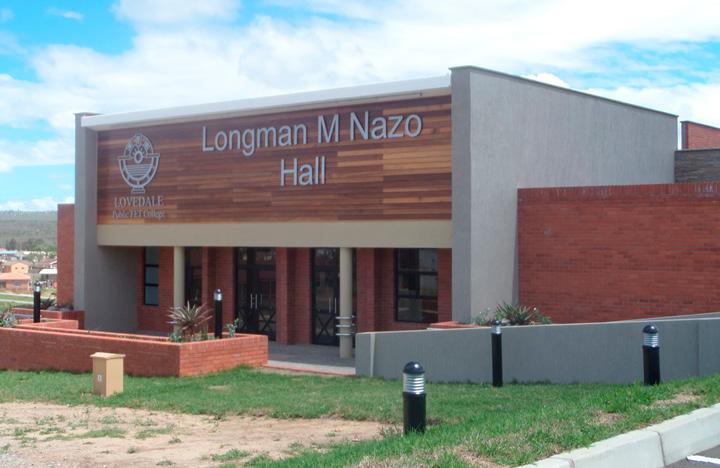
Lovedale College, a storied institution in South Africa, marks a significant milestone this year as it celebrates its bicentenary. Founded in 1824, Lovedale has been a beacon of education and enlightenment, profoundly impacting the sociopolitical landscape of South Africa and producing many influential leaders and intellectuals. As we celebrate 200 years of its existence, it is essential to reflect on its rich history, the challenges it has faced, and its enduring legacy.
Lovedale College was established by the Glasgow Missionary Society in the village of Alice, Eastern Cape. Named after Dr. John Love, the secretary of the society, Lovedale was initially conceived as a school for missionary children and indigenous African students. Its mission was to provide a comprehensive education that combined Christian teachings with vocational training.

In its early years, Lovedale distinguished itself by offering a curriculum that was progressive for its time. It included subjects such as arithmetic, geography, and history, alongside practical skills like agriculture and carpentry. This broad-based education aimed to equip students with the knowledge and skills necessary to uplift their communities.
Throughout the 19th century, Lovedale expanded its facilities and curriculum. It became one of the first institutions in South Africa to offer higher education to black students, a radical move in a country deeply entrenched in racial segregation. The college attracted students from across the African continent, establishing itself as a center of academic excellence and cultural exchange.
Lovedale’s commitment to inclusivity and quality education was evident in its faculty, which included prominent educators and missionaries who advocated for the intellectual and moral development of their students. The college’s motto, "Truth, Freedom, Service," encapsulated its ethos of nurturing informed, free-thinking individuals dedicated to serving their communities.
The advent of apartheid in 1948 marked a dark period for Lovedale. The apartheid regime's policies aimed to curtail educational opportunities for black South Africans, leading to significant challenges for the institution. Lovedale faced increasing government interference, funding cuts, and restrictive regulations designed to undermine its mission of providing quality education to all.
Despite these obstacles, Lovedale remained a bastion of resistance against apartheid. It became a hotbed of political activism, with many students and faculty members participating in the struggle for freedom and equality. Notable alumni, such as Govan Mbeki and Chris Hani, played crucial roles in the anti-apartheid movement, demonstrating the college's enduring influence on South African society.
The end of apartheid in 1994 heralded a new era for Lovedale College. The institution embraced the challenges and opportunities of a democratic South Africa, focusing on rebuilding and modernizing its facilities and curriculum. Lovedale re-established itself as a premier educational institution, offering a wide range of academic and vocational programs designed to meet the needs of a diverse student body.
In the post-apartheid era, Lovedale expanded its mission to include community development and social entrepreneurship. It launched initiatives aimed at addressing socio-economic challenges in the Eastern Cape, such as poverty, unemployment, and health disparities. Through partnerships with government agencies, NGOs, and private sector organizations, Lovedale has played a pivotal role in fostering sustainable development in the region.
As Lovedale College celebrates its bicentenary, it is an opportune moment to reflect on its rich legacy and the countless lives it has touched. The college's history is a testament to the power of education as a tool for social change and empowerment. Lovedale’s alumni network, which includes prominent leaders in various fields, stands as a testament to the institution's enduring impact.
The bicentenary celebrations are marked by a series of events, including academic conferences, cultural festivals, and community service projects. These activities aim to honor Lovedale’s past while looking forward to its future. They provide a platform for alumni, students, faculty, and community members to engage in dialogue about the role of education in addressing contemporary challenges.
Today, Lovedale College continues to uphold its founding principles of truth, freedom, and service. The institution remains committed to providing high-quality education that prepares students for the complexities of the modern world.
Lovedale’s curriculum has evolved to include cutting-edge programs in technology, business, and environmental science, reflecting the changing needs of society.
The college’s emphasis on holistic education, which integrates academic excellence with character development and social responsibility, ensures that its graduates are well-rounded individuals ready to contribute to their communities and the broader world. Lovedale’s approach to education is rooted in the belief that every student has the potential to effect positive change, a principle that has guided the institution for 200 years.
The Nelson Mandela Connection Nelson Mandela, one of Lovedale's most distinguished alumni, exemplifies the college’s impact on individual lives and society. Mandela’s time at Lovedale in the 1930s was formative, shaping his values and vision for a free and just South Africa. In his autobiography, Mandela reflects on the influence of Lovedale’s educators and the institution’s commitment to equality and justice.
Mandela’s legacy continues to inspire Lovedale’s mission. The college’s programs in leadership development and social justice are designed to cultivate the next generation of leaders who will carry forward Mandela’s vision of a democratic and inclusive society.
As Lovedale College celebrates its bicentenary, it stands as a symbol of resilience, transformation, and hope. From its humble beginnings as a missionary school to its current status as a leading educational institution, Lovedale has remained steadfast in its commitment to education as a force for good.
The bicentenary is not just a celebration of Lovedale’s past but a reaffirmation of its vision for the future. It is a call to action for all those who believe in the transformative power of education to continue supporting and advancing Lovedale’s mission.
In honoring 200 years of Lovedale College, we celebrate the countless individuals whose lives have been enriched by this remarkable institution. We also look forward to the next chapter in Lovedale’s storied history, confident that its legacy will continue to inspire and uplift for generations to come.


CONTACT DETAILS
Tel: 043 642 1331
Website: www.lovedale.edu.za
Email: headquarters@lovedale.org.za
Address: 1 Amatola Row, Qonce, 5601
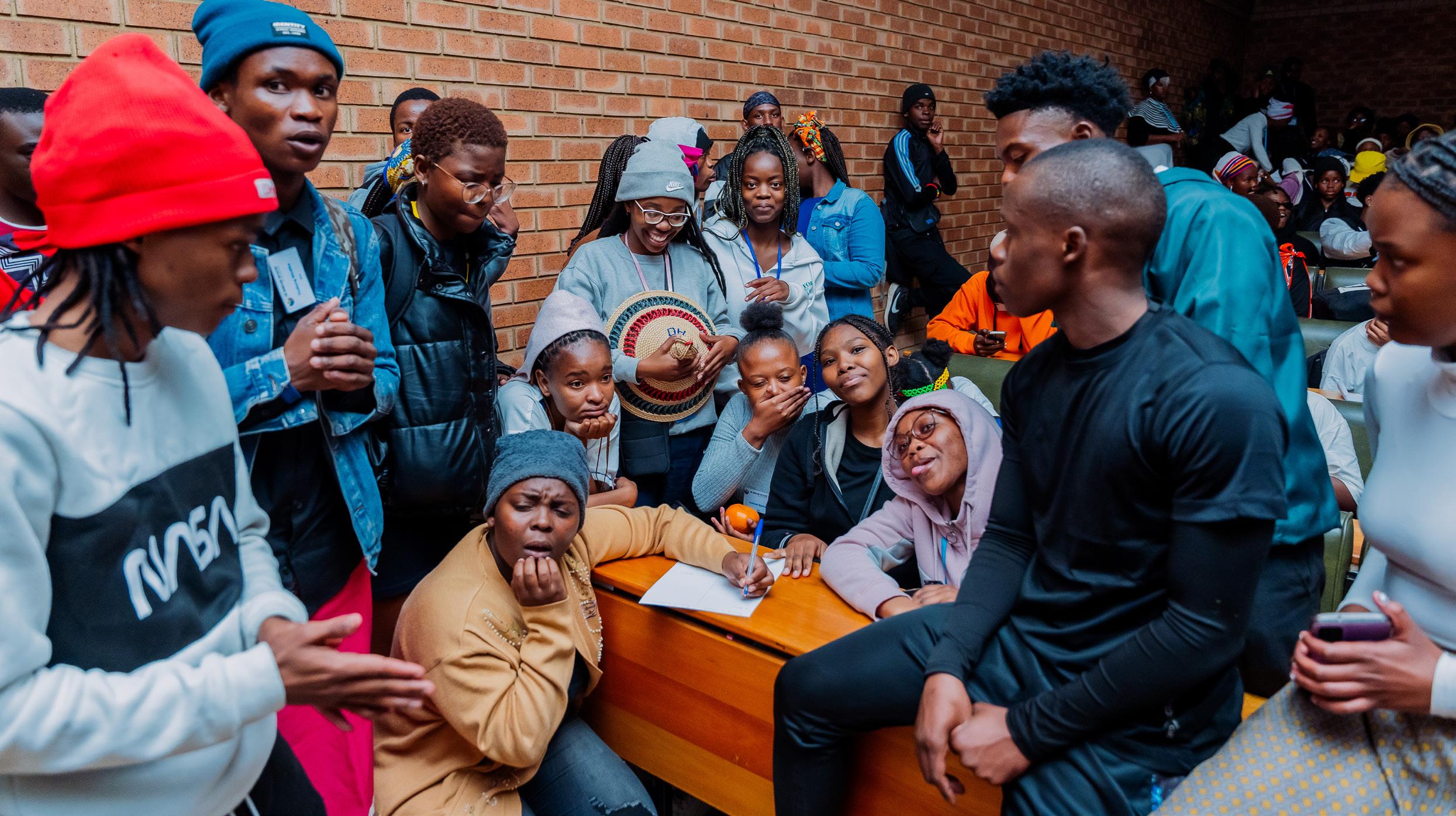

Charlene Petersen-Voss, Incoming Exec. Director, The Learning Trust
South Africa is grappling with a pervasive unemployment crisis, particularly among its youth in underserved communities, which significantly exacerbates the country's socioeconomic disparities.
Statistics reveal a staggering 45.5% unemployment rate among young people aged 15-34 years, starkly higher than the national average of 32.9% in the first quarter of 2024.
In this challenging landscape, the after-school sector has emerged as a key youth employer.
The Learning Trust (TLT) is an intermediary grantmaker providing emerging After School Programmes (ASPs) with small grants and capacity support to ensure their sustainability and growth.
TLT's strategic focus on the afterschool sector is a cornerstone of its efforts to combat youth unemployment and uplift
communities. By supporting ASPs, TLT is creating thriving educational environments that not only enhance learning outcomes but also improve employment outcomes for the youth.
The Social Employment Fund (SEF), funded by the Industrial Development Corporation of SA (IDC) has demonstrated that public employment programmes, when focused on communitybased organisations (CBOs), can achieve significant scale, quality, and sustainability. This adaptive governance model, characterised by open communication and shared learning, has been instrumental in fostering collaboration and capacity building.

TLT and its implementing partners are focusing on several strategic objectives, including:
• Mobilising funding to support non-wage costs such as training and mentoring youth.
• Sharing best-practice models to address common needs in work readiness, learning, and support materials.
• Integrating ASPs into schools and classrooms through public employment programmes like the Basic Education Employment Initiative (BEEI).
The benefits of this approach are manifold. ASPs have scaled their operations, improved programme quality, and increased the number of beneficiaries. For example, Awarenet, a long-time partner of TLT, expanded its robotics and coding programmes from 20 to 160 learners and the OLICO Maths Programme from 50 to 200 learners, thanks to SEF participants.
According to research commissioned by TLT earlier this year into the SEF programme, youth employment has seen significant gains through these efforts. Young people have acquired work experience, developed skills, built confidence, and established valuable connections, leading

to further opportunities. The SEF has also generated income for young people, helping to alleviate household financial pressures and improve their long-term employment prospects.
TLT is committed to scaling its impact through social impact investment and building systems to measure outcomes effectively.
Despite some challenges, such as the fragmented nature of the sector and varying quality among ASPs, most participants would choose to participate in SEF again, citing its positive impact on their organisations and personal development.
The after-school sector not only addresses youth unemployment but also plays a critical role in education recovery and community development. ASPs provide essential support, filling gaps left by the formal education system and offering safe spaces for learning and enrichment.

These programmes enable learners in low- and no-fee schools to improve their academic results while also serving as a significant youth employer.
Looking ahead, TLT is committed to scaling its impact through social impact investment and building systems to measure outcomes effectively. The goal is to leapfrog youth into productive work and reskill current workers for job retention and ongoing economic productivity.
Through initiatives like SEF and the dedicated efforts of after school organisations, the sector is making substantial gains in creating sustainable livelihoods and brighter futures for young people across the country.
Website: www.thelearningtrust.org
Email: info@thelearningtrust.org
Address: 173 Oxford Road, Rosebank, Johannesburg, 2196

At the helm of Capricorn TVET College since 2018 is Mr. Lekau Mamabolo, a visionary leader in education.
Born in Komaneng, Ga-Mamabolo, and raised in Seshego township, he holds a Bachelor of Arts degree from the University of Limpopo (UL) and a Higher Education Diploma and Master Degree in Development from Nelson Mandela University.
With a strong background in education and leadership, he has


spearheaded numerous initiatives to drive excellence in teaching, learning, and skills development. As a seasoned educator and leader, Mr. Mamabolo has achieved numerous milestones, including ensuring strategic goal alignment across the college community, implementing employee health and wellness programs, developing lecturer skills through training and bursaries, introduction of Primary Agriculture at Senwabarwana Campus, supported through funding from IDC, achieving unqualified audit outcomes and financial stability.
Under his leadership, the College has granted an award from Skills Initiative for Africa for the construction of new process control, water management, renewable energy workshops and a computer lab at Seshego Campus.
The Skills Initiative for Africa (SIFA) is an initiative of African Union Commission and the African Union Development Agency (AUDA-NEPAD) supported by the German government to strengthen occupational prospects of young people in Africa.


Furthermore, the project also covers curriculum development, capacity building for lecturers and scholarships for eligible and qualifying beneficiaries (focusing specifically on youth, women and people living with disabilities). This project is implemented in partnership with FESTO SA, which ensures that the equipment is technologically advanced, reliable and industry oriented, allowing personnel to be empowered with market-related skills.
The SIFA skills project, launched in 2021 by the ministry of Higher

At Capricorn
‘Achieving Excellence Together’ isn’t just a tagline; it’s a commitment to provide vocational and occupational skills training programmes to students with scarce critical skills and practical experience, in fields that present good prospects of employment opportunities.
Education, Science and Innovation, is a landmark initiative that will revolutionize skills development at Capricorn TVET College. This project aims to establish a specialized skills center at the Seshego campus, focusing on advanced manufacturing, renewable energy, and data science. The significance of this project cannot be overstated, as it will:
• Provide students with cuttingedge skills in high-demand fields
• Enhance the college's reputation as a hub for innovation and excellence
• Contribute to the economic growth and development of the region
• Address critical skills shortages in the industry
• Foster partnerships with local and international stakeholders
The project has already seen significant progress, with machinery and equipment delivery and staff training. A German expert is on board to ensure the project's success, overseeing procurement, construction management, technical assistance, supervision, quality assurance, and control.
Mr. Mamabolo's vision for the SIFA project is to create a center of excellence that will not only benefit the college community but also have a positive impact on the surrounding area. By providing students with industry-relevant skills, the project will contribute to the development of a skilled workforce, economic growth, and innovation in the region.
The expected impact of the project is the contribution to the employability of the youth, growth of the process sector, and water security in Limpopo and South Africa.
The short to long term outcome will be the emergence of new entrepreneurs in the renewable energy sector enabling the youth trained through the program to participate in the green economy.
The 2024 State of the City Address reflects a forward-thinking and holistic approach to urban governance, one that balances economic ambitions with social responsibilities and environmental imperatives. As Johannesburg moves towards this envisioned future, it stands as a beacon of hope and progress, demonstrating the power of collaborative and inclusive leadership in building a better city for all its residents.


The Executive Mayor of the City of Joburg, Cllr Kabelo Gwamanda, delivered his eagerly anticipated second State of the City Address(SOCA) on Thursday, 2 May 2024.
In his address, the Mayor laid out an ambitious and transformative agenda aimed at revitalizing the city and improving the quality of life for its residents. Delivered to a packed audience at the Johannesburg City Hall, the address highlighted key initiatives across various sectors, from infrastructure and economic development to social services and environmental sustainability.
One of the central themes of the Mayor's address was the urgent need to upgrade and expand Johannesburg's infrastructure. The city, which serves as the economic hub of South Africa, has long grappled with aging infrastructure that hampers growth and efficiency. The Mayor announced a comprehensive infrastructure development plan that includes major investments in transportation, water, and energy systems.
"We are committed to building a resilient city that can withstand the challenges of the 21st century. Our infrastructure development plan is not just about bricks and mortar; it's about creating a foundation for sustainable growth and prosperity," said Gwamanda.
The plan includes the expansion of the Rea Vaya Bus Rapid Transit (BRT) system, improvements to the road network, and the modernization of water and sanitation facilities. These projects aim to enhance connectivity, reduce congestion, and ensure reliable access to essential services for all residents. Additionally, the Mayor emphasized the importance of smart city technologies, proposing the integration of IoT (Internet of Things) solutions to monitor and manage urban systems more efficiently. >
"Smart cities are the future. By leveraging cutting-edge technology, we can optimize resource management, improve service delivery, and create a more responsive and connected urban environment," the Mayor added.
The city plans to collaborate with tech companies and research institutions to develop and implement these smart solutions, ensuring Johannesburg remains at the forefront of urban innovation.
Economic revitalization was another key focus of the address. The Mayor outlined a series of initiatives designed to stimulate growth, attract investment, and create jobs. At the heart of this strategy is the Johannesburg Economic Growth Strategy, a multifaceted plan that targets key sectors such as manufacturing, technology, and tourism.
"Our goal is to create a vibrant and inclusive economy that provides opportunities for all Johannesburg residents. We are leveraging our strengths and investing in sectors that have the potential to drive long-term growth and job creation," the Mayor emphasized.
The strategy includes incentives for businesses, support for small and medium enterprises (SMEs), and partnerships with the private sector. Additionally, the city plans to establish innovation hubs and incubators to nurture startups and foster a culture of entrepreneurship.
The Mayor also announced the launch of a new "Johannesburg Innovation Fund," designed to provide seed capital to promising startups and high-growth companies. This fund aims to attract

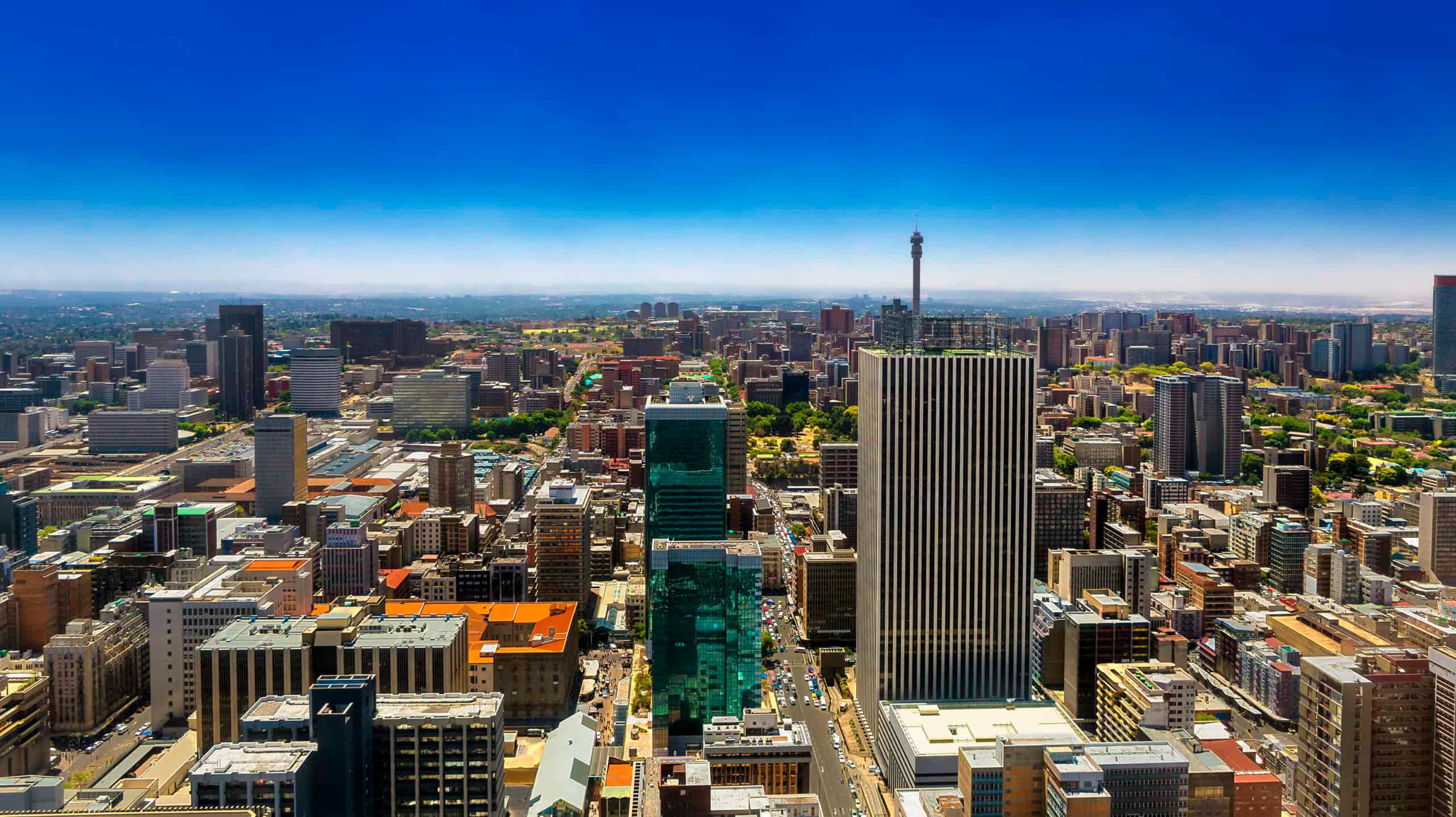
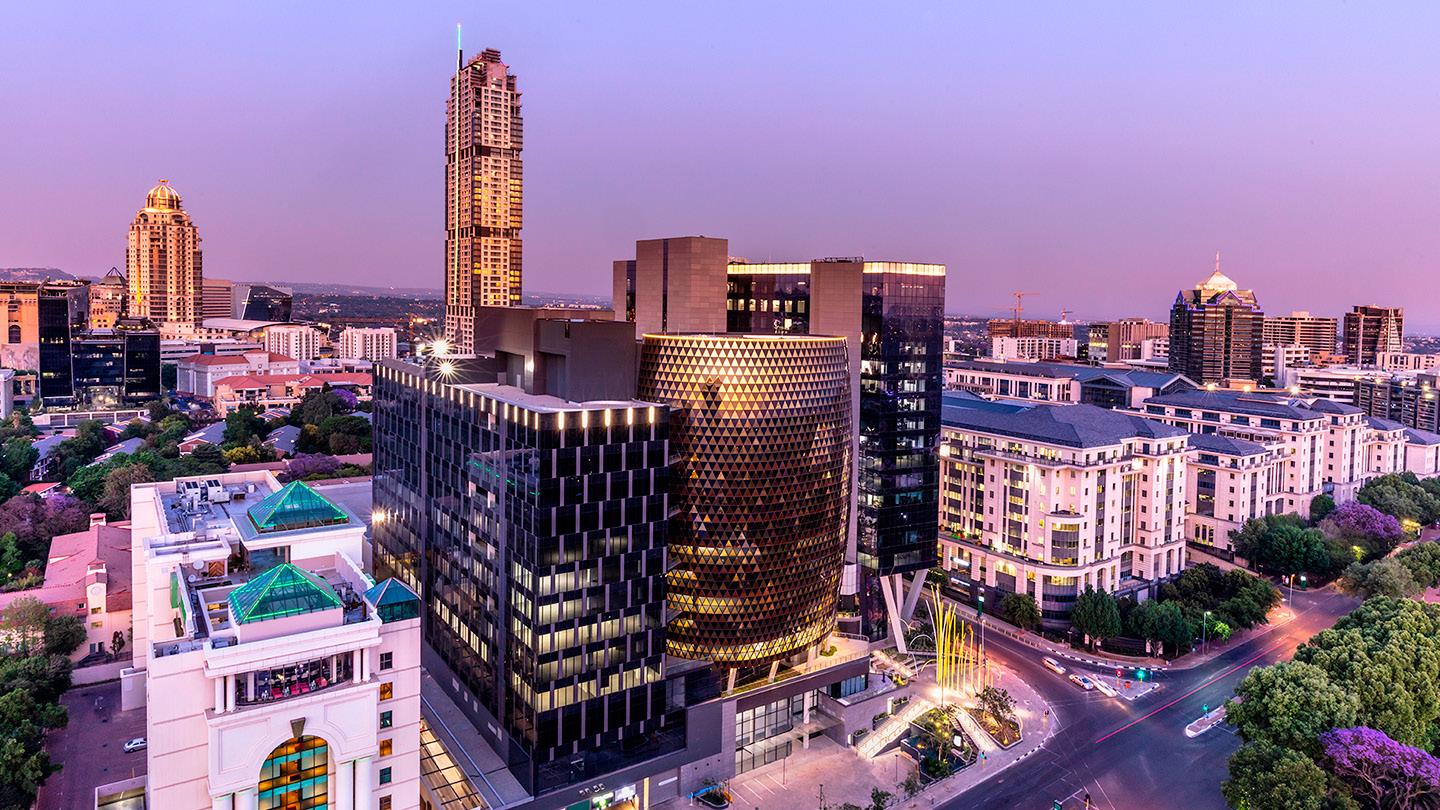
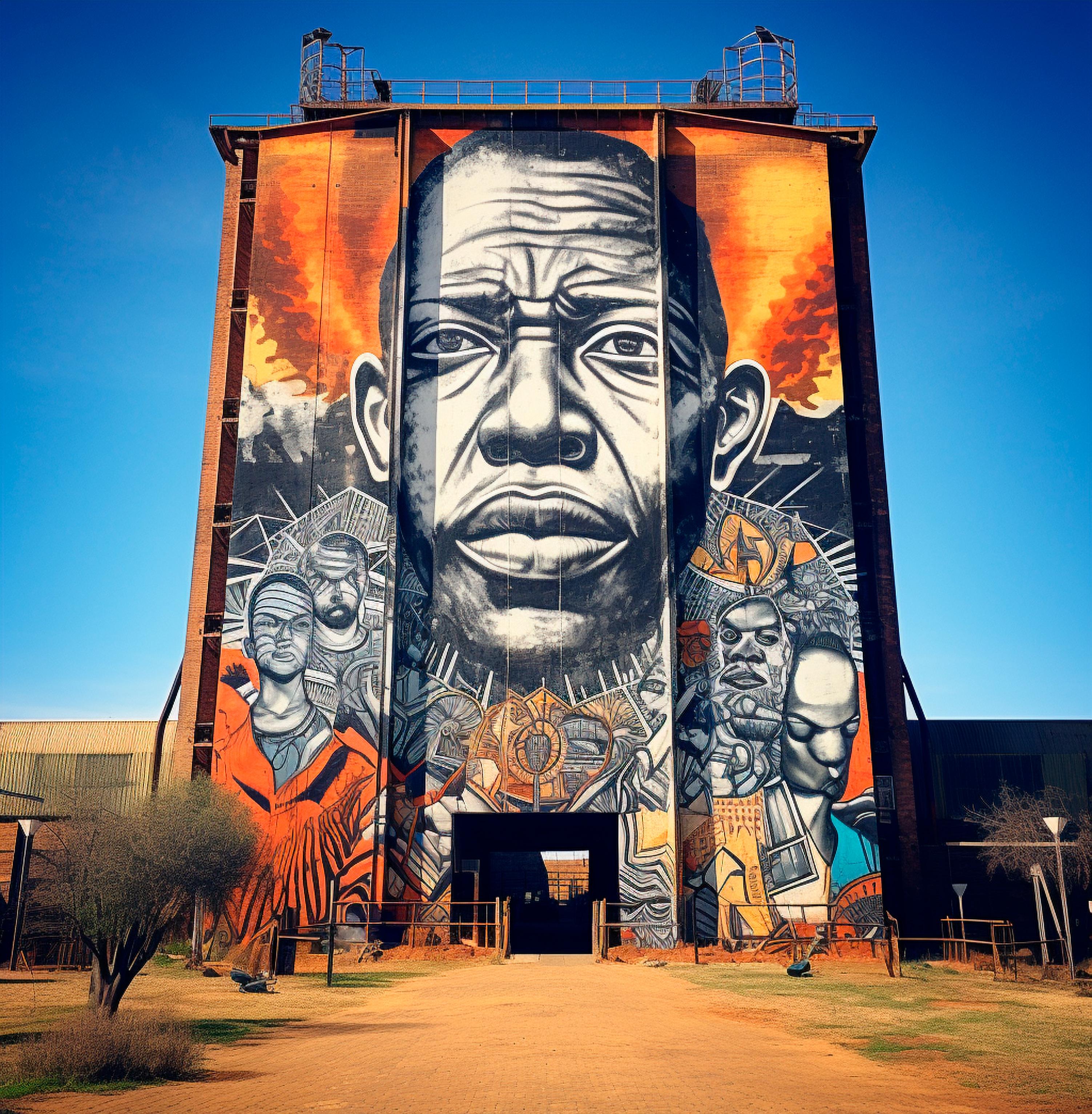
to deliver quality housing options for low- and middle-income families.
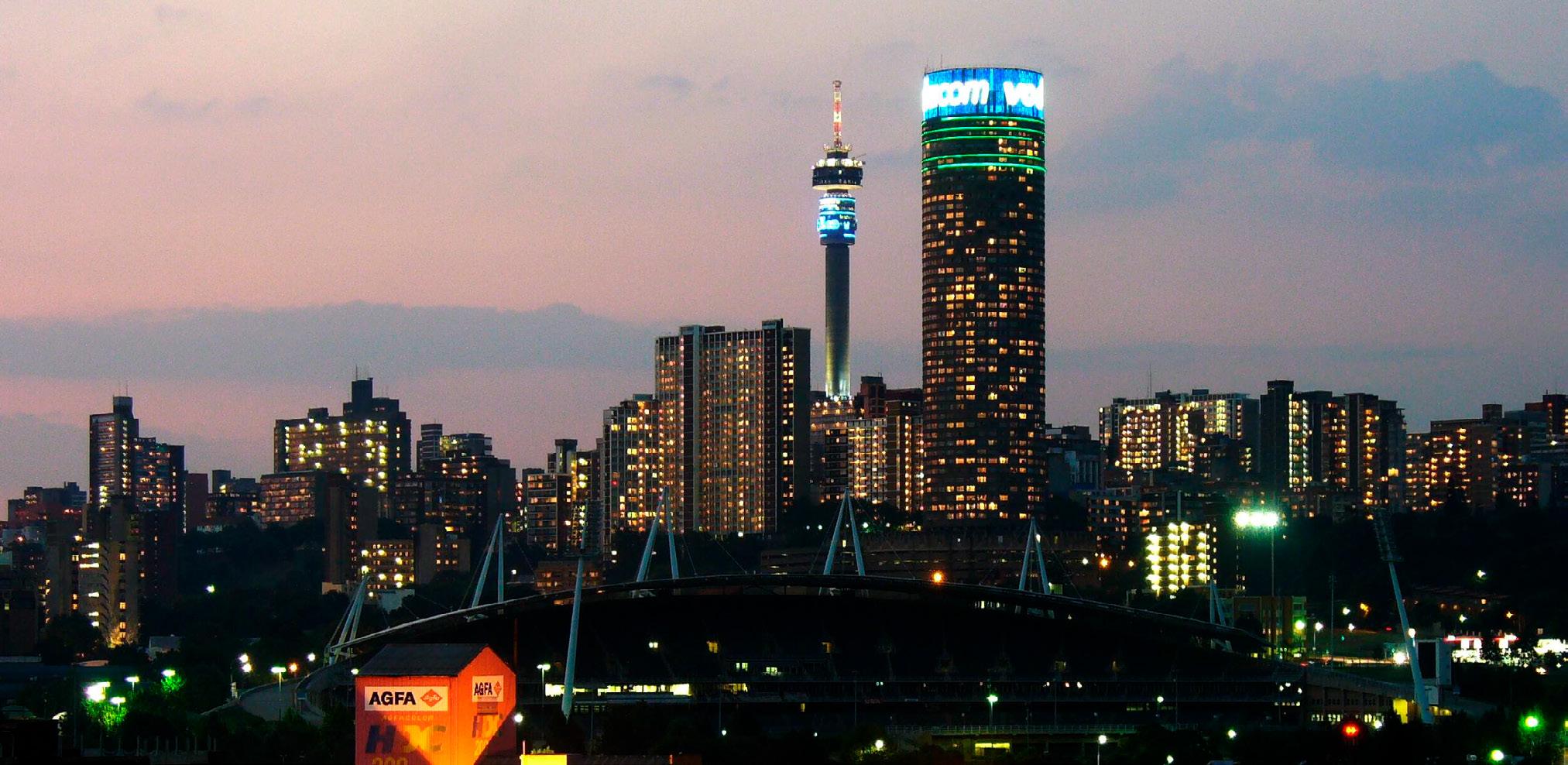


the healthcare sector, the city plans to roll out a series of mobile clinics to serve underserved communities,
services. These clinics will provide primary healthcare, maternal and
Environmental sustainability was another critical aspect of the State
mitigating the impacts of climate




Additionally, the city is investing in renewable energy projects, including the development of >
solar and wind farms. These projects will help reduce the city's reliance on fossil fuels and promote the use of clean energy.
The Mayor also announced plans to introduce incentives for businesses and households to install solar panels and adopt energy-efficient practices.
Public safety and security remain top priorities for the Johannesburg administration. In his address, the Mayor acknowledged the challenges the city faces in terms of crime and safety, and outlined a series of measures aimed at creating a safer environment for all residents.
"Safety and security are fundamental to the well-being of our residents. We are taking decisive action to address crime and enhance public safety across Johannesburg," the Mayor affirmed.
The city's safety strategy includes the deployment of additional law enforcement officers, the installation of advanced surveillance systems, and the implementation of community policing initiatives. These efforts aim to reduce crime rates, improve emergency response times, and build trust between law enforcement and the community.
A significant part of this strategy is the "Safe Streets Initiative," which focuses on improving lighting,
installing CCTV cameras, and increasing police presence in highcrime areas. The city also plans to launch community safety programs that involve residents in crime prevention efforts and promote neighborhood watch groups.
The Mayor also emphasized the importance of inclusive governance and civic engagement in shaping the future of Johannesburg. The administration is committed to fostering transparency, accountability, and public participation in decision-making processes.
"Our vision for Johannesburg is one where every resident has a voice and can contribute to the development of our city. We are strengthening our governance structures to ensure that they are inclusive, transparent, and accountable," the Mayor highlighted.
To achieve this, the city plans to enhance digital platforms for citizen engagement, establish participatory budgeting processes, and improve communication channels between the government and residents. These initiatives are designed to empower citizens and ensure that their needs and concerns are addressed effectively.
The Mayor announced the launch of the "Johannesburg Open

Data Portal," which will provide residents with access to a wealth of information about city operations, budgets, and development plans. This portal aims to promote transparency and allow residents to actively participate in monitoring and shaping the city's progress.
The State of the City Address for 2024 by the Executive Mayor of Johannesburg was a comprehensive and visionary blueprint for the future of the city. With a focus on infrastructure development, economic growth, social services, environmental sustainability, public safety, and inclusive governance, the address outlined a bold and ambitious agenda that promises to transform Johannesburg into a resilient, prosperous, and inclusive city.
As the city embarks on this journey of transformation, the commitment and collaboration of all stakeholders will be crucial in realizing this vision. The Mayor's address serves as a call to action for residents, businesses, and community organizations to come together and contribute to the development and progress of Johannesburg.
"Together, we can build a Johannesburg that is vibrant, inclusive, and sustainable. Let us work together to turn our vision into reality and create a better future for all," concluded Mayor Gwamanda.
The 2024 State of the City Address reflects a forward-thinking and holistic approach to urban governance, one that balances economic ambitions with social responsibilities and environmental imperatives. As Johannesburg moves towards this envisioned future, it stands as a beacon of hope and progress, demonstrating the power of collaborative and inclusive leadership in building a better city for all its residents.


Established in 2017 in response to the #FeesMustFall student-led movement, which exposed the high cost of obtaining a university degree in South Africa.
Along with our founding partner Standard Bank, Feenix rallies a diverse community to transform the lives of students and their families. We achieve this through a secure Crowdfunding platform where students actively raise funds for their education and through partnerships with forward-thinking businesses, where we manage Skills Development Bursary programs on their behalf. We also provide holistic support, including financial literacy, job readiness, and personal mastery education, to empower young people to thrive.
4121
Total number of students impacted from 2017 to September 30, 2023
R186.29m
Total funds raised from 2017 to September 30, 2023

Over the past six years, 3,810 lives have been positively impacted, thanks to the unwavering commitment of Standard Bank South Africa (SBSA). SBSA's dedication to advancing social, economic, and environmental progress led to the creation of Feenix, with their employees playing a key role in shaping the future of our nation. This impact is a testament to SBSA's invaluable contribution.
https://feenix.org/


Every July, South Africa and the world celebrate Nelson Mandela Month to honor the legacy of Nelson Mandela, a global icon of peace, justice, and reconciliation. This month-long commemoration, with Mandela Day on July 18th, encourages individuals and organizations to engage in acts of service and community-building, reflecting Mandela's lifelong commitment to making the world a better place.
Nelson Rolihlahla Mandela, born on July 18, 1918, in the village of Mvezo in Umtata, then part of South Africa's Cape Province, grew up in the rural village of Qunu. He was the son of Chief Henry Mandela of the Thembu tribe, and his early years were marked by traditional upbringing and education, deeply rooted in Thembu customs. Mandela was given the name "Rolihlahla," which means
"pulling the branch of a tree" or, more colloquially, "troublemaker," a prophetic name given his future role in challenging the status quo of apartheid.
Mandela's journey to becoming one of the most revered figures in modern history began when he moved to Johannesburg in 1941. He worked as a mine security officer and later as a law clerk while completing his law degree. During this period, he became increasingly involved in
the African National Congress (ANC), a political movement dedicated to ending apartheid and achieving political equality for South Africans.
In 1944, Mandela co-founded the ANC Youth League, advocating for a more radical approach to achieving political change. His involvement in the Defiance Campaign of 1952 and the Congress of the People in 1955 marked him as a prominent leader in the struggle against apartheid. The latter event led to the adoption of the Freedom Charter, a pivotal document demanding equal rights for all South Africans. The Charter declared, "The People Shall Govern!" and outlined a vision for a non-racial South Africa, an idea that was both revolutionary and dangerous in the context of the time.
Mandela's activism made him a target of the apartheid government. In 1961, he co-founded Umkhonto we Sizwe (Spear of the Nation), the ANC's armed wing, in response to the increasing state violence against anti-apartheid activists. His activities led to his arrest and, in 1962, a fiveyear prison sentence. In 1964, he was sentenced to life imprisonment for sabotage and conspiracy to overthrow the government during the Rivonia Trial. Mandela's famous speech from the dock, where he declared he was prepared to die for a democratic South Africa, resonated worldwide and cemented his status as a symbol of resistance.
Mandela spent 27 years in prison, primarily on Robben Island. Despite the harsh conditions, he remained a symbol of resistance and hope for millions around the world. His unwavering commitment to justice and equality inspired global anti-
apartheid movements and increased international pressure on the South African government. During his imprisonment, Mandela's reputation grew as an icon of resistance. The "Free Nelson Mandela" campaign became a rallying cry globally, uniting people of various nationalities and backgrounds in the fight against apartheid.
In 1990, amid growing internal and international pressure, President F.W. de Klerk ordered Mandela's release. This event marked a turning point in South African history. Mandela's release was followed by negotiations to end apartheid, culminating in the country's first democratic elections in 1994, where Mandela was elected as South Africa's first black president. His release symbolized hope and the possibility of a peaceful transition from a deeply divided society to one striving for equality and unity.
Mandela's presidency (1994-1999) focused on reconciliation and nationbuilding. He established the Truth
and Reconciliation Commission (TRC) to address the atrocities committed during the apartheid era. The TRC provided a platform for victims and perpetrators to tell their stories, fostering understanding and healing. Mandela's leadership and vision for a united South Africa earned him global admiration and numerous awards, including the Nobel Peace Prize in 1993. His approach to governance was characterized by inclusivity and a dedication to rebuilding a nation fractured by decades of institutionalized racism and discrimination.
After retiring from politics, Mandela continued his humanitarian work through the Nelson Mandela Foundation, which focuses on promoting his legacy of peace, human rights, and social justice. Mandela passed away on December 5, 2013, but his legacy continues to inspire generations. His postpresidential years were marked by continued advocacy for social justice, including efforts to combat HIV/ AIDS in South Africa, and supporting peace and reconciliation in other conflict zones around the world. >

The Nelson Mandela Museum, located in Qunu and Mthatha in the Eastern Cape, is a testament to Mandela's enduring legacy. The museum, established in 2000, serves as a cultural and historical repository, preserving Mandela's life story and the history of South Africa's struggle for freedom.
The museum is spread across three sites: the Bhunga Building in Mthatha, the Qunu site, and the Mvezo site. Each location offers unique insights into Mandela's life and the broader context of the antiapartheid struggle.
The Bhunga Building in Mthatha houses a collection of gifts and memorabilia presented to Mandela during his presidency. The exhibits provide a glimpse into the global admiration for Mandela and the impact of his work. The building also features an exhibition titled "Dear Mr. Mandela... Dear Mrs. Parks: Children's Letters, Global Lessons," showcasing letters from children around the world to Mandela and Rosa Parks, highlighting their influence on young minds. This collection underscores Mandela's global influence and his commitment to education and youth empowerment.
The Qunu site, where Mandela spent much of his childhood, offers visitors a chance to experience the environment that shaped his early years. The site includes a museum, an open-air theatre, and a replica of Mandela's childhood home. This location allows visitors to connect with Mandela's roots and understand the cultural heritage that influenced his values and beliefs. The lush land-scapes and rural settings provide a stark contrast to the harsh urban realities Mandela later confronted in Johannesburg.

Mvezo, Mandela's birthplace, is another significant part of the museum. This site includes a traditional village that reflects the Thembu way of life, providing context to Mandela's upbringing. It also features exhibits on Mandela's family history and the Thembu lineage. Visitors can gain insight into the cultural and historical context that shaped Mandela's early life and his deep connection to his heritage.
Nelson Mandela Month is not just a time for reflection but also a call to action. It encourages individuals and organizations to engage in community service, embodying Mandela's spirit of ubuntu – a belief in a universal bond of sharing that connects all humanity.
Throughout July, various activities and events take place, including educational programs, charity drives, and community service projects. These initiatives aim to address social issues such as poverty, inequality, and education, reflecting Mandela's lifelong dedication to creating a better world. The emphasis on community service during this month serves as a reminder of Mandela's own dedication to public service and his belief in the power of collective action to bring about social change.
Nelson Mandela's life story is a testament to the power of resilience, courage, and compassion. His legacy continues to inspire people worldwide to fight for justice and equality. The Nelson Mandela Museum serves as a poignant reminder of his contributions and the ongoing struggle for human rights.
As we celebrate Nelson Mandela Month, let us honor his memory by taking action to improve our communities, foster unity, and promote social justice. In doing so, we keep alive the spirit of a man who devoted his life to the betterment of humanity. Mandela's enduring influence reminds us that the fight for justice and equality is an ongoing journey that requires commitment, empathy, and a steadfast belief in the potential for positive change.
Tel:
Website: www.nelsonmandelamuseum.org.za
Address:
Corner Nelson Mandela Drive & Owen Street, Bhunga Building, Mthatha, 5009


It’s not always easy staying on top of the latest innovations in your field. But at Electra Mining Africa 2024, you’ll find all the latest cutting-edge technology on display, hear talks from trailblazers in the industry and meet hundreds of exhibitors across the areas of mining, electrical, automation, manufacturing, power and transport, all in one venue.
Taking place from 2-6 September at the Expo Centre in Nasrec, Johannesburg, this year’s event will be one of the biggest Electra Mining Africa exhibitions to date. Extending across 35,000+ m² of exhibition space accommodating over 850 exhibitors, its focus is largely on local industry suppliers and manufacturers, together with a smaller international contingent from countries including the UK, USA, Canada, Australia, Italy, Germany, Switzerland, Taiwan, India and China. It’s very much a South African show for a South African market.
Electra Mining Africa offers an outstanding opportunity for exhibitors and visitors to come together to do business, to sell and to buy, which stimulates trade in the industrial, manufacturing and mining sectors of the South African economy.
“We’re looking forward to this year’s show,” says Gary Corin, Managing Director of Specialised Exhibitions, a division of Montgomery Group. “With over five decades of experience and as the largest trade show of its kind in Southern Africa, Electra Mining Africa presents a very unique platform for bringing together related industry sectors all under one roof. Large organisations and SMMEs will be represented across the areas
of mining, electrical, automation, manufacturing, power and transport. They come here to trade. To share and exchange value, whether that’s technology or products or solutions. They come here for five days to do business in one of the biggest trading markets that this country has to offer.”
Exhibitors make sales at the show, generate qualified leads, and build new customer and distributor partnerships. Visitors have the opportunity to see, evaluate and compare the latest products and services that meet their business and operational needs.
“We’re excited about the New Products and Innovation Awards that will be taking place again this year, organised in partnership with the South African Capital Equipment Export Council. Thousands of new products and innovations will be displayed at the show, with hundreds of live demonstrations bringing machinery and equipment to life,” explained Charlene Hefer, Portfolio Director at Specialised Exhibitions.
“An Inward Buying Mission will ring in buyers from neighbouring African countries, Europe and South America, all interested in what our local industry can offer. We’re also thrilled that the automation hall, a huge attraction in 2022, has received overwhelming support from industry again this year and will be filled with ground-breaking innovations.
"Also back this year, the Forklift Driver competition organised in conjunction with Lifting Africa and LEEASA, where Forklift operators will be competing for the coveted title of Forklift Driver Champion. Education and learning remain a key element of the show with expert speakers presenting at the various conferences and free-to-attend seminars.”
“Electra Mining Africa is going to be a great show and the innovation on display will be mindblowing,” concludes Hefer.
For further information, visit www.electramining.co.za

Five days with thousands of products on display and thousands of face-to-face interactions








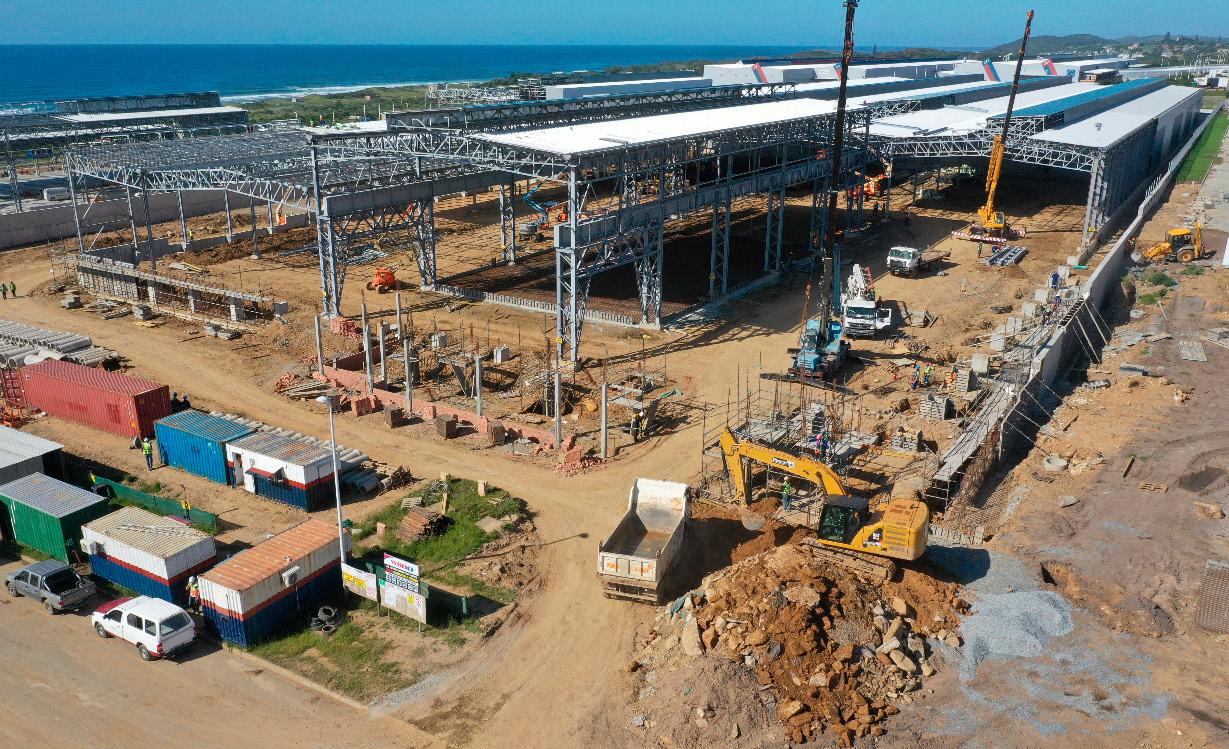

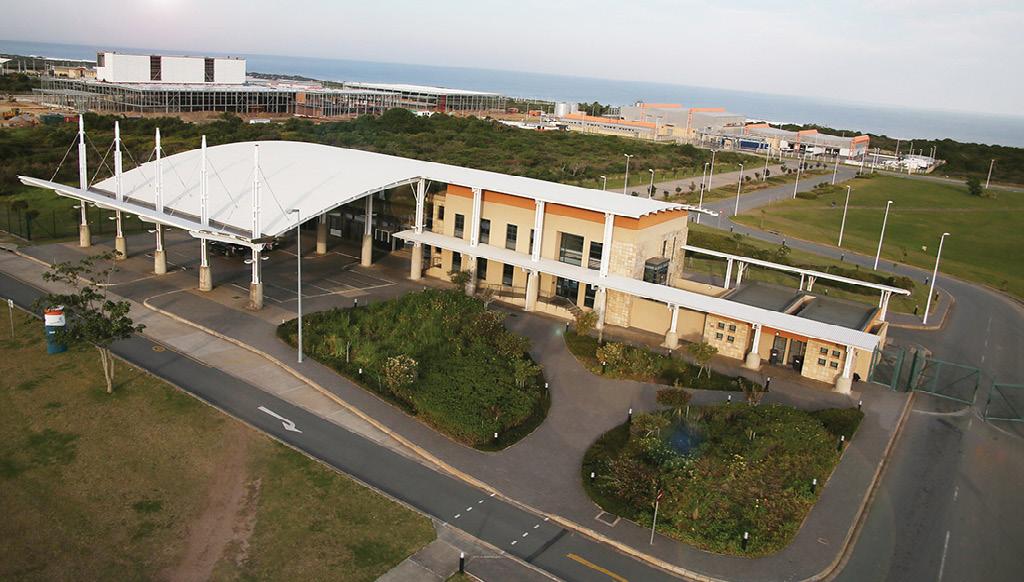
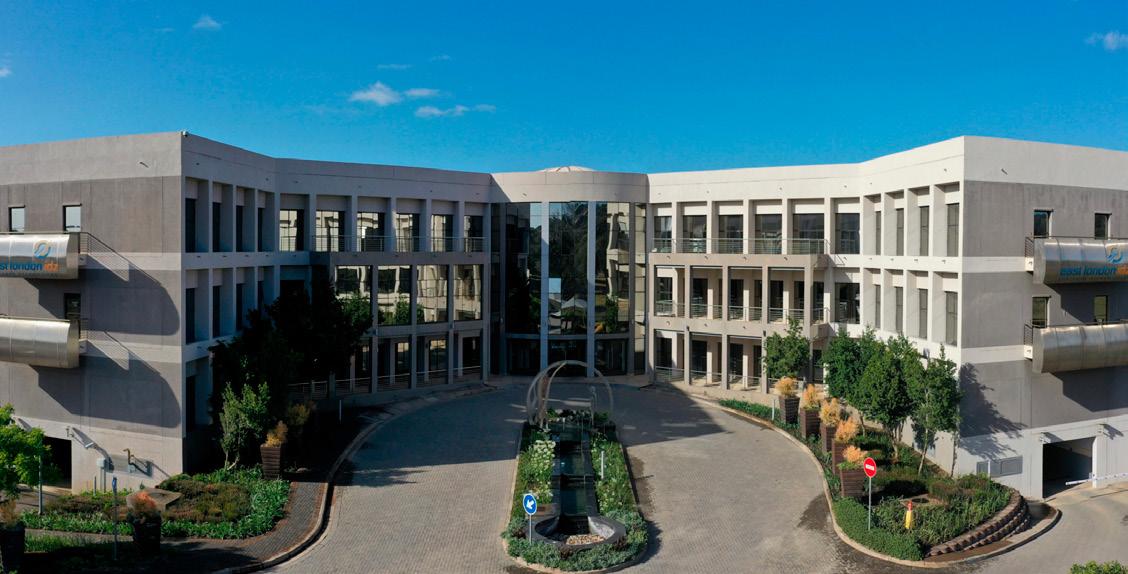
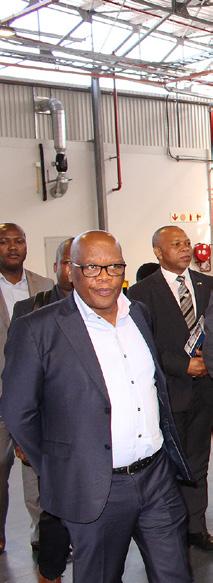
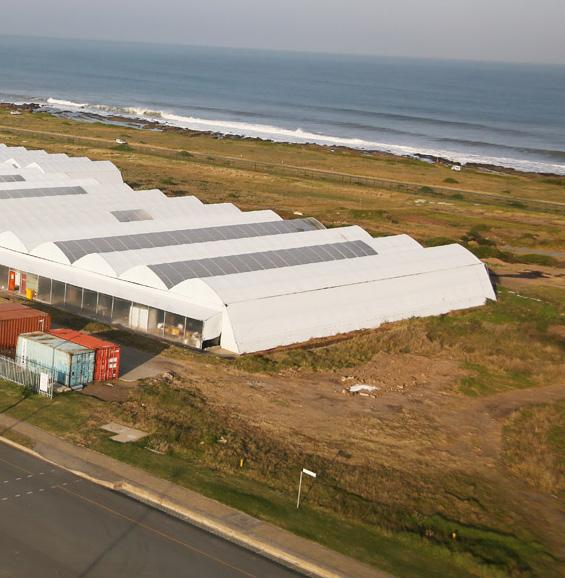
The East London Industrial Development Zone is a leading industrial park in South Africa, dedicated to promoting industrial growth and economic development in the Eastern Cape. The ELIDZ provides world-class infrastructure, strategic support, and investment opportunities to businesses, fostering a dynamic and sustainable industrial environment.
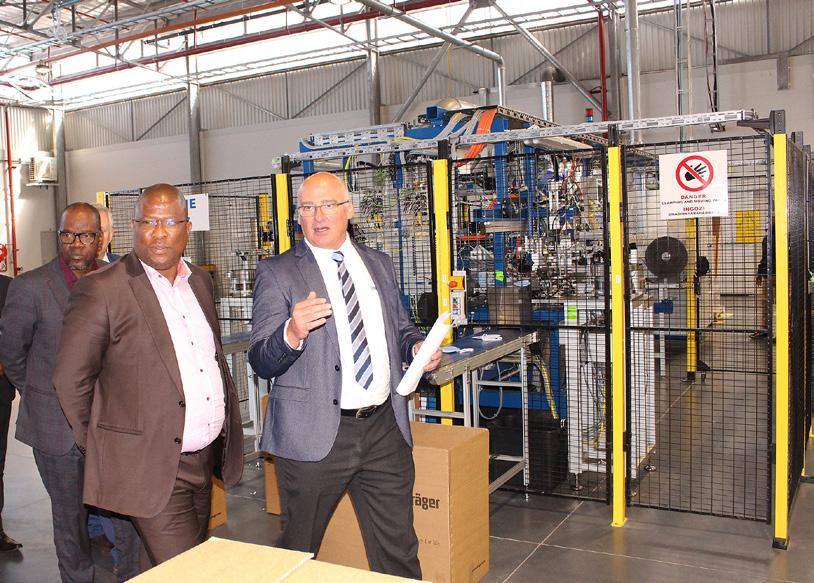

The East London Industrial Development Zone (ELIDZ) has appointed Mr. Thembela Zweni as its new Chief Executive Officer (CEO), effective 1 July 2024.
With over 18 years of experience in the industrial sector and a proven track record, Mr. Zweni's appointment represents a significant milestone in ELIDZ's journey towards fostering industrial growth and economic development in the Eastern Cape.
During his tenure at ELIDZ, Mr. Zweni has held various executive positions and served as the Chief Operations Officer since 2016. His recent role as interim CEO has been marked by notable achievements, including enhanced stakeholder engagement, improved operational efficiencies, and a renewed focus on sustainable development.
Professor Mlungisi Makalima, Chairperson of the ELIDZ Board of Directors, expressed enthusiasm about Mr. Zweni's appointment, highlighting his extensive experience and deep understanding of strategic objectives. Mr. Zweni's vision for ELIDZ involves strengthening partnerships with local and
international investors, fostering a culture of innovation, and ensuring that the organization remains at the forefront of industrial development in South Africa.
In his statement, Mr. Zweni expressed his honour and excitement in taking on the role of CEO and emphasised his commitment to working with the team, stakeholders, and partners to further drive the growth and development of the industrial sector in the Eastern Cape.
The ELIDZ’s commitment to attracting diverse investments to the Buffalo City Metro, has not only catalyzed economic advancement in the Eastern Cape, but has also contributed to the broader economic landscape.
Under Mr. Zweni's leadership, ELIDZ aims to continue its pivotal role in driving industrial development by expanding infrastructure, fostering innovation, and strengthening partnerships. His extensive experience and strategic vision are expected to contribute to sustained growth and prosperity for the local community and the broader economy.
ELIDZ's announcement of Mr. Zweni's appointment comes at a pivotal time as the organization seeks to further its impact on the region's economic landscape.
At the time of the ELIDZ Investor Launch and Stakeholder Engagement event, held on the 25th April >
the ELIDZ announced significant investments totaling approximately R1.3 billion, aimed at elevating the renewable energy sector and stimulating job creation within the zone and are expected to generate around 1134 new employment opportunities.
At the event Eastern Cape Province Premier Lubabalo Oscar Mabuyane expressed excitement about the new operationalised investments and highlighted the significance of the investments in fostering economic growth within the Eastern Cape.
The recent influx of investments into the ELIDZ underscores the growing confidence in the potential for economic growth and development within the Eastern Cape.
The event was attended by various dignitaries, including the Honourable Premier Oscar Mabuyane and Mr. Mlungisi Mvoko, the then MEC for the Department of Economic Development, Environmental Affairs and Tourism (DEDEAT), along with new investors and board members. MEC Mvoko highlighted the significance of these investments in creating job and business opportunities and boosting the economy of the Eastern Cape. He expressed his gratitude to the outgoing ELIDZ former CEO, Mr. Kondlo for his contributions to the institution and the province.
One of the key investments comes from Bushveld Electrolyte Company (Pty) Ltd, which is a joint operation between Bushveld Electrolyte Company (Pty) Ltd and the Industrial Development Corporation (IDC). This initiative, valued at R400 million, is expected to create

approximately 59 new direct jobs and aims to establish capacity for vanadiumbased electrolyte supply to the global Vanadium Redox Flow Battery (VRFB) market and supply chain.
Thezi Langa (Pty) Ltd: Another notable investment is from Thezi Langa (Pty) Ltd, valued at R920 million, aimed at developing a 50MW photovoltaic solar plant. This initiative is projected to create 1000 direct and indirect jobs during a two-year construction period and an estimated 25 new direct jobs during a 20-year operation and management period. The goal of this investment is to increase independent energy generation capacity within the Eastern Cape and provide renewable energy to both private and public sectors.
RAM Hand-to-Hand Couriers: In addition, RAM Hand-to-Hand Couriers is set to establish its Eastern Cape base Hub within the ELIDZ with a value of R18 million, which is expected to contribute 50 direct jobs at the ELIDZ Hub. This expansion initiative aligns with the company's goal to enhance its logistics infrastructure.
The ELIDZ, known for its commitment to driving industrial development, has been instrumental in attracting diverse investments to the Buffalo City Metropolitan Municipality (BCMM) region. The ELIDZ's efforts have not only catalyzed economic advancement in the Eastern Cape but have also contributed to
the broader economic landscape. Despite facing challenges, the ELIDZ continues to play a pivotal role in revitalizing the local economy and creating a conducive environment for both foreign and direct investments. The recent influx of investments underscores the growing confidence in the potential for economic growth and development within the Eastern Cape.
In summary, the investments announced by the ELIDZ mark a significant step forward in enhancing the renewable energy sector, creating employment opportunities, and fostering economic growth within the Eastern Cape. These developments are indicative of the region's potential as a strategic hub for innovative manufacturing and renewable energy initiatives.
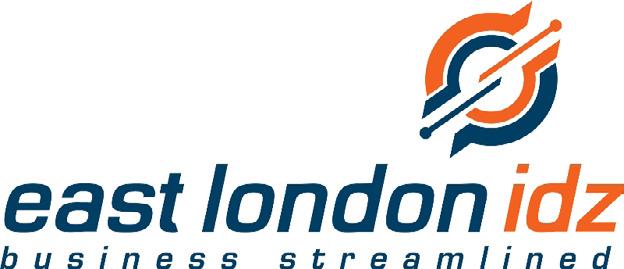
CONTACT INFORMATION
Address:
Lower Chester Road Sunnyridge East London, 5201 South Africa
Call: 043 702 8200
E-mail: info@elidz.co.za
Website: www.elidz.co.za
“We believe that Nestlé’s example can be replicated by other companies in the food manufacturing value chain as their contribution to achieving low-carbon emissions, which as we know will have significant economic, social and environmental benefits for South Africa.”
- Zinhle
Tyikwe, CEO, Consumer Goods Council of South Africa

In celebration of Sustainability Month and World Milk Day, NESTLÉ® NESPRAY® announced the expansion of its groundbreaking, low-carbon dairy farming initiative in South Africa. Building on the success of the Skimmelkrans Dairy pilot in George, Western Cape, 96 farms along the Garden Route have now adopted these innovative practices, setting a new standard for sustainable milk production in South Africa.
NESTLÉ® NESPRAY®’s "farm to glass" journey transforms traditional dairy farming through regenerative agriculture. The 96 farms joining the movement supply fresh milk to the NESTLÉ® NESPRAY® factory in Mossel Bay.
The aim is to continue reducing carbon emissions while enhancing biodiversity. Results from the Skimmelkrans Dairy pilot to date quote annual averages of 500 tonnes of manure processed,
14.5 million litres of recycled water, and 6000 tonnes of carbon sequestrated through soil work. The intervention also includes cutting-edge techniques such as biological pest control and zero tillage, which minimise chemical use, improve soil health, and boost crop yields. Over and above these, a 285 kVA is renewable energy from solar installation using solar power.
Takudzwa Mupfurutsa, Business
Executive Officer: Dairy, at Nestlé East and Southern Africa (ESAR), said of the initiative, “Our commitment to sustainability is unwavering. The expansion of our low-carbon pilot farm is testament to the success of regenerative agriculture in sustainable dairy farming.”
George Kuyler, CEO at Skimmelkrans Dairy added, “The switch to regenerative agriculture has transformed our farm. Not only are we seeing better yields, but we’re also contributing to a healthier environment.”
Speaking on these initiatives, Zinhle Tyikwe, CEO, Consumer Goods Council of South Africa said, “achieving low carbon under the UN SDG goals is a global imperative that requires the collective effort of governments, companies and society at large. In this regard, the Skimmelkrans project is a
laudable and shining example of efforts by Nestlé to reach waste free and low-carbon emissions by 2050. Nestlé is leading in showing that being environmentally sustainable and ensuring circularity can be profitable and make financial sense, while protecting the environment. We believe that Nestlé’s example can be replicated by other companies in the food manufacturing value chain as their contribution to achieving low-carbon emissions, which as we know will have significant economic, social and environmental benefits for South Africa.”
Skimmelkrans Dairy, the other 96 low carbon dairy farms and the NESTLÉ® NESPRAY® factory together employ in excess of 1000 individuals, indirectly impacting over 13000 people in our community. All these individuals contribute to the production of this proudly South African brand.
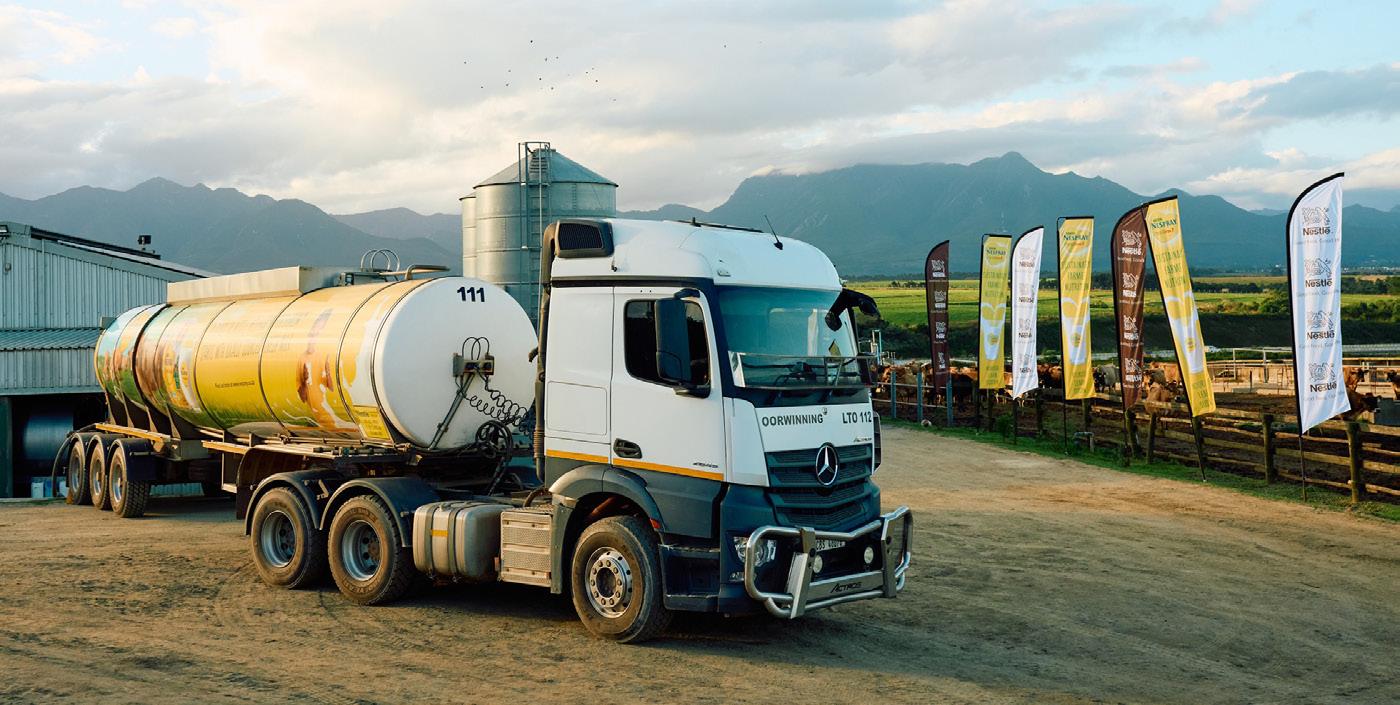

Proudly South African CEO, Eustace Mashimbye, said of the initiative, “Nestlé fully espouses the values of companies that are affiliated with Proudly South African, the national Buy Local campaign, with the principal value being the fact that our members have to contribute to the growth of the economy and the creation of jobs. Nestlé does this through increasing their levels of local content, across their respective value chains, including amongst others, the sourcing of milk locally from local farms as well as driving import replacement by sourcing packaging items and other raw materials for their products locally.
In this way, jobs are created across the entire value chain and not only in their direct operations. The entrenchment of sustainability in their processes and sourcing strategies is another criteria that Proudly South African members have to comply with, which Nestlé fully complies with, and is evident in all their current processes, including with their suppliers.”
Looking ahead, NESTLÉ® NESPRAY® aims to expand this initiative further, inspiring other dairy farms across Africa. By 2050, the goal is to achieve net-zero emissions, proving that sustainable practices are not only viable but also beneficial for industry and the planet.
“The advancements at Skimmelkrans Dairy and the expansion to influence the other 96 farms underscores NESTLÉ® NESPRAY®’s dedication to innovation and sustainability. These efforts will continue to support local economies, provide nutrient-dense products, and protect our planet for generations to come,” concluded Mupfurutsa.
For more information visit: https://www.Nestlé-esar.com/brands/ dairy/nespray

Established in 1999, The Municipal Demarcation Board (MDB), an independent authority has continued to deliver its mandate without fear, favour or prejudice. The MDB’s mandate is derived from the Municipal Demarcation Act (Act No. 27 of 1998) and Municipal Structures Act (Act No. 117 of 1998) as amended. As such, the organisation is geared towards enhancing its processes towards delivering spatial democracy within the confines of these legislation that governs it.
• Determine and re-determine Municipal Boundaries
• Delimit ward boundaries for Local Government Elections
• Conduct Municipal Capacity Assessments; to ascertain whether municipalities have the requisite capability to fulfil their constitutional obligations; therefore, advice the responsible MECs on allocation of powers and functions between Local and District Municipalities; and
• Provide advisory services on related local Government matters.
The Board comprises of ten (10) Board members of which five (5) are women. Members of the Board are selected through a process that culminates in interviews conducted by an independent panel headed by a Judge of the Constitutional Court, and appointed by the President of the Republic of South Africa. The current Board was appointed on
01 March 2024 and will serve until 2029.
The organisation has an overall staff complement of 47 employees, with 28 (59%) of which are women. Furthermore, the organisation has achieved an unqualified audit report for the past five consecutive years under the leadership of astute and capable women Chief Financial Officers (CFOs).
This is a true testament of the organisation's commitment to empower women in all areas of development. Women owned companies are therefore invited to register to conduct business with the MDB.



• MDB has commenced with the education and awareness of the Municipal Ward Delimitation/ change process well ahead of time to allow for intensified public participation ahead of the local government elections (LGE).
• The MDB delimits wards every five years preceding the local government elections (LGE) in line with the Municipal Structures Act 117 0f 1998, schedule 1 as amended (MSA).
• The education and awareness campaign will be rolled out in all Provinces from July- September 2024 targeting all MDB stakeholders such as Traditional Leadership, Ward Councillors, Ward Committees, Municipal Officials, members of the public etc.
• The MDB will, thereafter, draft the first set of draft wards and present these at the public consultation meetings scheduled between April and May 2025. Members of the public and stakeholders will be afforded an opportunity to engage on the draft set of wards and make comments or submit their own proposals. Although this process is not legislated as per the Municipal Structures Act, it will be conducted to reflect MDB's resolve to enhance its public participation processes.
• Communities and stakeholders are requested to lookout for updates of the process on the MDB website and social media platforms.
• Members of the public are encouraged to actively participate in the process and familiarize themselves with the step-by-step status update of the process. Contact Us: Tel: 012 342 2481 Web: www.demarcation.org.za Follow Us on social media platforms: Facebook/
The Gautrain service is integrated and offers quick, easy, and seamless mobility with reduced travel times and value for money to the user.
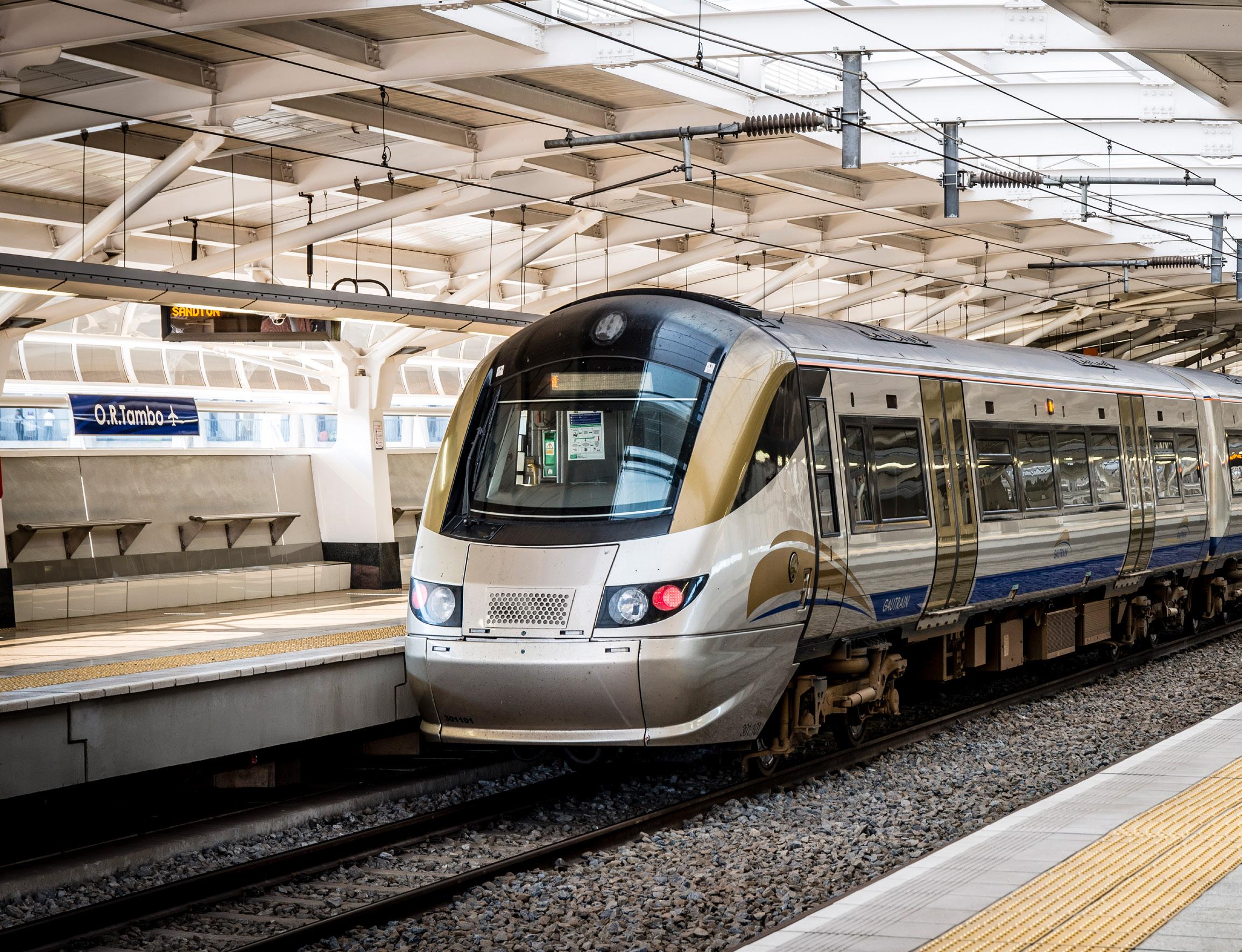
The Gautrain Management Agency’s (GMA) sustainable development strategy considers the inter-relationship between transport, the environment, the economy, and society.
The Gautrain service is a sustainable and smart mode of transport with numerous socio-economic benefits. Amongst these benefits are
environmental benefits, economic growth and contributing to the revitalisation of the rail sector in Gauteng. The service is integrated and offers quick, easy, and seamless mobility with reduced travel times and value for money to the user.
The Gautrain's contribution to sustainable development makes good business sense when the spin-
off effects, such as increased job creation and overall economic growth, are taken into consideration. An independent economic impact study commissioned by the GMA found that for every R1.00 spent on Gautrain, R1.72 has been added to the Gauteng economy. The study concluded that the Gautrain continues to deliver jobs and investment in Gauteng.
Integration is key to ensuring a seamless journey when using public transport, in 2011 the GMA partnered with the Alexandra Taxi Association (ATA) and the Alexandra, Randburg, Midrand and Sandton Taxi Association (ARMSTA) to operate the Midibus Feeder and Distribution Service (MFDS) at the Gautrain Marlboro station. The MFDS is an extension to the Gautrain service and offers accessibility to efficient, safe, and reliable public transport service

in areas where other modes of transport services are not suitable. Thirteen years later, additional midibus routes have been introduced and are operating at Gautrain Centurion and Hatfield stations.
The Gautrain’s environmental advantages are also worth highlighting. Shifting from using a private car to the Gautrain is environmentally friendly and contributes to the reduction of carbon footprint. Carbon emissions from Gautrain are considerably lower per passenger – passengers opting to travel by Gautrain reduce their carbon footprint by 52% per trip. The environmental benefits also translate into health benefits relating to respiratory diseases and road accidents that are significantly higher for road transport when compared to rail transport as the safer mode.
Development (SED), the Gautrain project contributes positively to society and enhances economic growth in the Gauteng. Since inception, the Gautrain project has been breaking new ground to ensure that specific socio-economic development objectives are met. Gautrain has delivered a spectrum of jobs during its construction and operational phases. The SED deliverables directly demonstrate the benefits of the Gautrain in terms of amongst others: – skills transfer and shareholding by black persons and women, in particular procurement, subcontracting and employment equity elements.
Besides driving economic growth and creating jobs, the GMA continues to work towards economic, spatial and social transformation through the modernisation of public transport infrastructure and urban develop-ment through Smart Mobility. The Gautrain has strengthened existing development nodes in Gauteng by promoting and restructuring urban areas and revitalising the Johannesburg, Pretoria and Ekurhuleni central business districts. The findings of the independent economic impact study revealed that the Gautrain has continued to:
• deliver jobs and positively impacts social investment;
• influence transport choices;
• reinforce development nodes;
• integrate Gauteng and its communities; and
• change perceptions and attract investment.
Land use changes occur as market forces influence changes in property use to the optimal purpose, which in turn could lead to increases in values, rent and therefore rateable income. A key feature of urban spatial transformation is densification in nodal development areas and precincts and intensification along the rail corridor. The first indicator is the increased demand for residential property surrounding Gautrain’s stations. Approximately 59% of all office development activity in major South African nodes is located around Gautrain stations. Gautrain is making a significant contribution to creating a larger and more economically powerful Gauteng region.
Gautrain has changed the image of public transport in the province, reduced travel distances and also plays a role in promoting domestic tourism. The perception and behaviors related to public transport usage in Gauteng has since changed and this is encouraging more sustainable land use and development patterns which are centered around transport nodes and infrastructure.
Twitter – @TheGautrain Facebook –www.facebook.com/gautrain
Website – www.gma.gautrain.co.za
Call Centre – 0800 42887246
SMS alert line – 32693
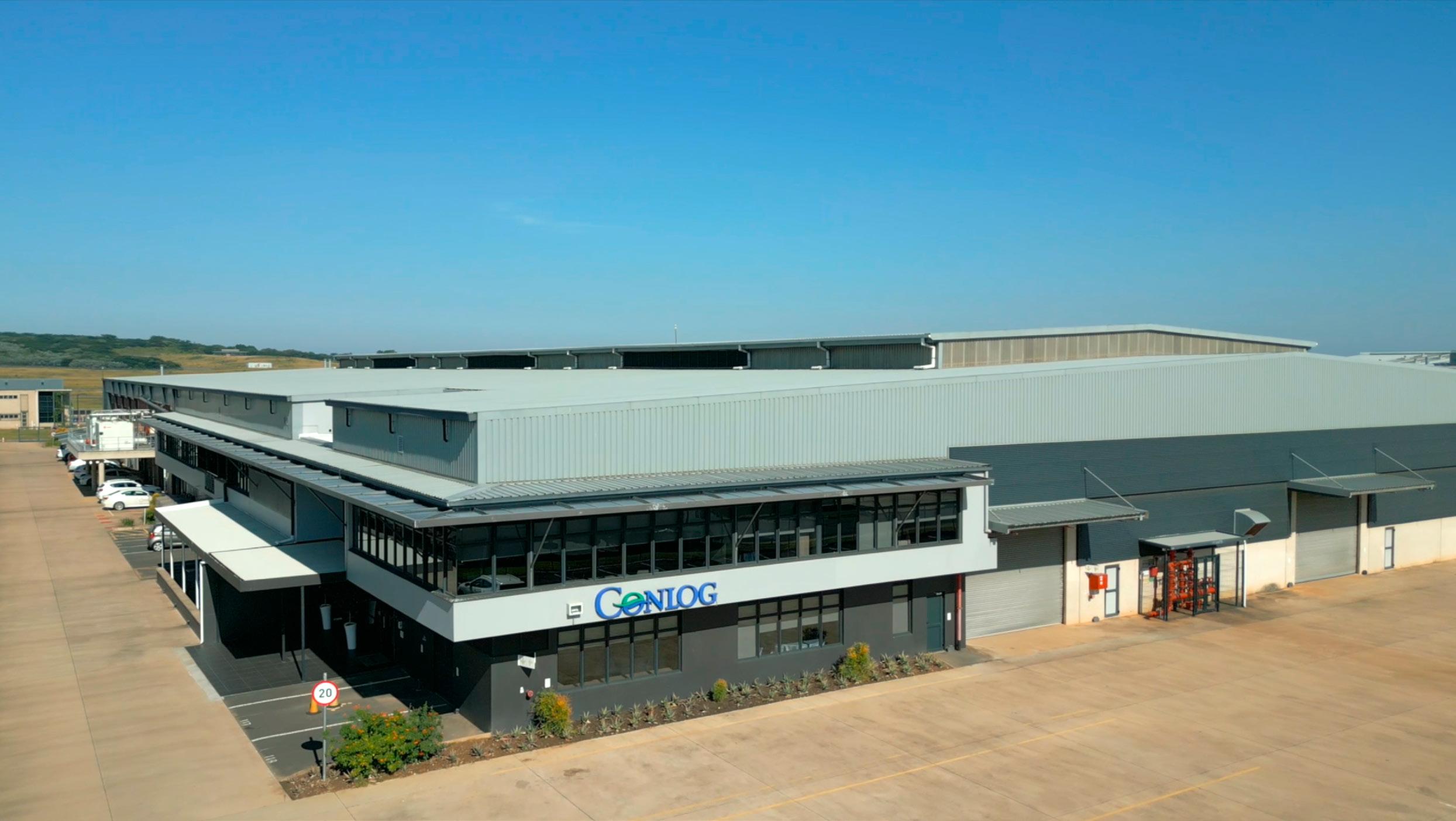
Conlog is proud to announce that it has been awarded the RT29 tender by the South African National Treasury, marking a significant milestone in the company's journey. This prestigious recognition positions Conlog as a key supplier for smart prepaid electricity and water meters across South Africa.
The RT29 tender, a groundbreaking transversal contract, signifies a new era of efficient and effective procurement, aimed at addressing the country's pressing utility challenges.
As a black industrialist-focused business, Conlog is committed to creating jobs, fostering innovation,
and contributing to the nation's economic and social well-being.
This milestone achievement marks the beginning of a new era in smart metering for South Africa, with Conlog leading the way in delivering cutting-edge solutions that address the nation's most pressing utility challenges.
The RT29-2024 tender focuses on the audit and Token Identifier (TID) conversion of existing prepayment meters, alongside the supply, delivery, installation, management,
and maintenance of smart metering solutions for a period of 36 months. This initiative is a testament to the government's innovative approach to procurement, ensuring rapid and collaborative access to cutting-edge technology.
"For me, this award is a turning point as it alters the procurement practice, making the process quicker, efficient, and effective," said Logan Moodley, CEO of Conlog. "This transversal contract minimizes the burden on local municipalities, enabling them to benefit from the speed and collaborative nature of the procurement process."
South African municipalities face significant financial challenges, with outstanding customer bills amounting to R348 billion and a debt of R58.5 billion owed to Eskom. Amidst an ongoing energy crisis, the need for smart meters has become critical to manage demand response and ease the strain on the national grid.
"Conlog is uniquely positioned to address these challenges," Moodley emphasized. "As the only true South African Original Equipment Manufacturer (OEM) on the panel, we have been intently focused on building technology that responds to the specific problem statements in our market. Our smart prepayment metering solutions for electricity and water are tailored to South Africa's unique needs.
"Smart meters place more control in the hands of municipalities and consumers alike," Moodley noted. "They support demand management, load management, and provide real-time visibility into utility usage, which is essential for avoiding catastrophic load shedding events and managing water scarcity."
Conlog's smart metering solutions will be implemented across South Africa's 257 municipalities, offering numerous benefits:
• Revenue collection and enhancement: Smart meters enable accurate billing and effective revenue collection, crucial for municipalities struggling with unpaid bills.
• Demand management: These meters provide tools for load management, helping to avoid load shedding and manage energy consumption more effectively.
• Transparency and quality of life: Consumers will enjoy accurate billing, improved transparency in utility services, and convenient avenues for purchasing prepaid services.
Conlog's achievement is not just about technological innovation; it's also about economic and social impact. The company's world-class manufacturing facility in KwaZulu-Natal, adjacent to a significant logistics hub, ensures the rapid deployment of products nationwide. Conlog's commitment to job creation is evident through its investment in training and certification for contractors, facilitated by its MERSETA-accredited training facility.
"We have created jobs and have the opportunity to create more through our participation on this panel," said Moodley. "Our technology not only addresses demand and load management but also creates economic stimulus within the sector."
Acknowledging Eskom's efforts to solve short-term challenges, Conlog recognizes the crucial role of technology in medium to long-term solutions. "Our smart meters support municipalities and Eskom in avoiding load shedding by enabling precise control over energy distribution," Moodley explained. "This not only prevents inconvenience for consumers but also contributes to a more sustainable energy management practice."
Conlog’s smart meters empower consumers by providing tools to monitor and measure their consumption of electricity and water, enhancing their quality of life through improved interaction with utility services.
The RT29 tender is the first national transversal contract for metering, reflecting a refreshing and innovative procurement practice in South Africa. "We are fully supportive of the government's and Eskom's interventions," Moodley stated. "This groundbreaking approach is innovative, and we are proud to be part of this transformative journey."
“The RT29 tender, a groundbreaking transversal contract, signifies a new era of efficient and effective procurement aimed at addressing the country’s pressing utility challenges.”
- Logan Moodey, CEO of CONLOG
Winning the RT29 tender is a proud moment for Conlog, reflecting the company's dedication to excellence and its commitment to supporting South Africa's growth and development. As a black industrialistfocused business, Conlog is committed to creating jobs, fostering innovation, and contributing to the nation's economic and social well-being.
"As a truly South African OEM, we are dedicated to creating value and driving growth within the sector," Moodley concluded. "Our participation in the RT29 tender is a testament to our capability and commitment to solving South Africa's utility challenges."
For more information on how Conlog's smart metering solutions can benefit your municipality, please contact us at RT29@conlog.com or call our team of experts.
This milestone achievement marks the beginning of a new era in smart metering for South Africa, with Conlog leading the way in delivering cutting-edge solutions that address the nation's most pressing utility challenges.
Tel: +27 (31) 268-1111
Fax: +27 (31) 268-1500
Email: Info@conlog.com Website: www.conlog.com
Durban Address: 10 Mzimkhulu Drive, Dube Trade Port, La Mercy, 4407
JHB Address: 21A Woodlands Office Park, 851 Woodlands Drive, Woodmead, 2080

The primary role of South Africa’s 257 municipalities is to provide water, electricity, refuse removal, sanitation and other services to millions of households. This mammoth task requires extensive resources.
Municipalities collectively spent R532 billion in 2022. This total includes both operational and capital expenditure, published in two separate statistical releases. If we consider the Census 2022 national population count of 62,0 million, this equates to an average municipal expenditure of R8 572 per resident. At a more granular level, the municipalities of Gauteng recorded the highest level of municipal spending per resident, at R12 060. Eastern Cape, Mpumalanga and Limpopo registered the lowest values. (see figure 1)
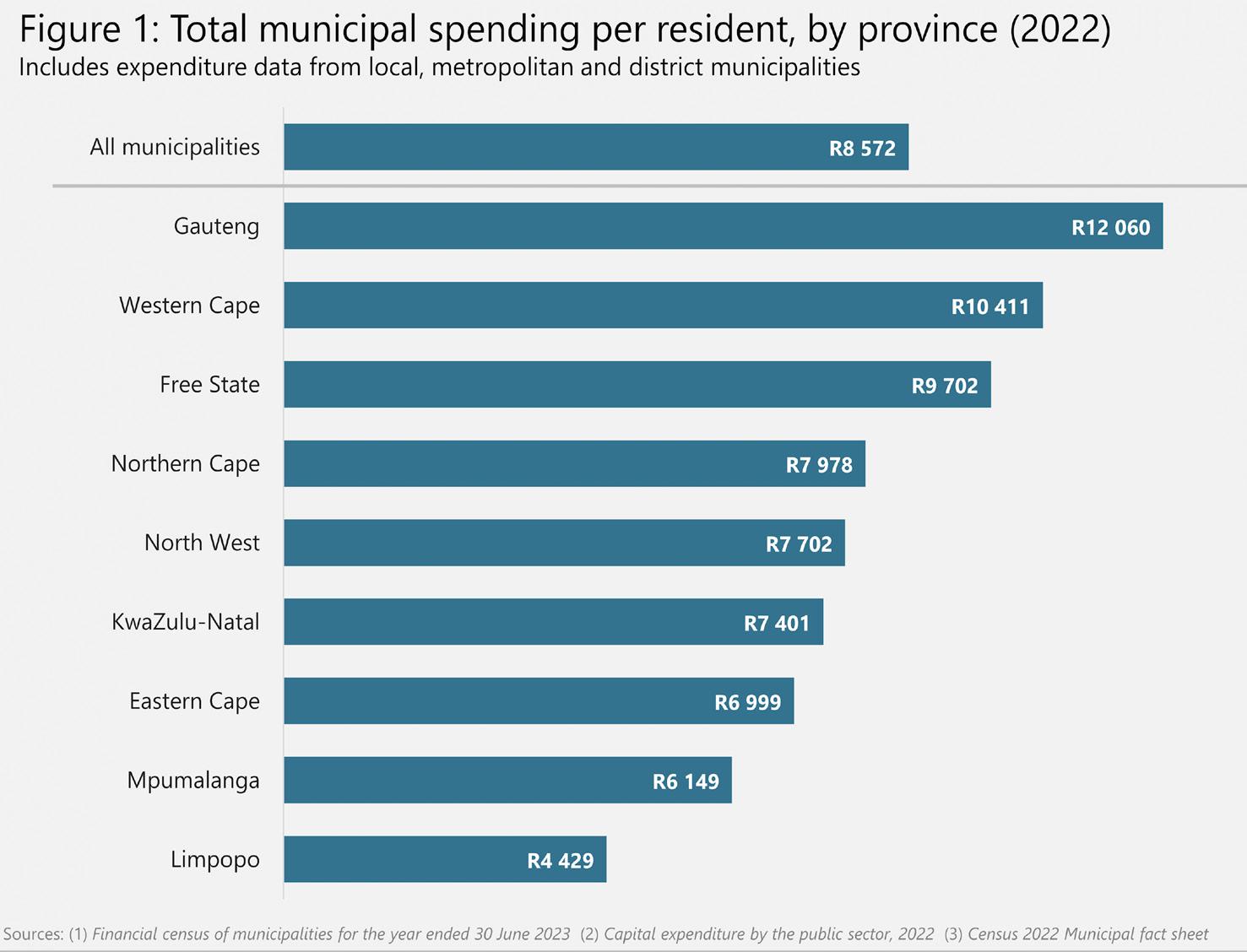
The top 20 list: Do you live in any of these municipalities?
If we filter this down to individual local and metropolitan municipalities, the analysis shows spending per resident ranging from a low of R1 389 (Nongoma LM in KwaZulu-Natal) to a high of R23 201 (Gamagara LM in Northern Cape). A list of the top 20 spenders shows a splattering of local and metropolitan municipalities across eight provinces (Figure 2).
the y-axis according to their provincial averages. Limpopo has the lowest average, with many municipalities clustered at the bottom end. Gauteng, with the highest average, has municipalities appearing higher up on the scale.
The range between the lowest and highest municipalities within each province tells a story.
Northern Cape had the largest spread between lowest and highest. This is attributed to the
outlier of Gamagara LM, which appears on the far right. But more on this later!
Apart from the Northern Cape, the provinces of Free State, Eastern Cape and North West registered the widest ranges between minimum and maximum. Municipalities in Gauteng and Limpopo are more clustered.
(Figure 4) might provide a clue to why these differences exist. >

Interestingly, several municipalities in the top 20 are clustered in an area that includes parts of Gauteng and Mpumalanga. Lighter-coloured municipalities – with relatively low per capita spending – are prevalent in provinces such as Limpopo, Eastern Cape, KwaZuluNatal and North West.
For the data nerds (Figure 3) shows where each local and metropolitan municipality fits on the per capita spending range. Provinces appear on

The Municipal Infrastructure Investment Framework (MIIF) –developed by the Department of Cooperative Governance and Traditional Affairs in partnership with the Development Bank of South Africa – categorises local and metropolitan municipalities into five groups. These are metropolitan municipalities (A), secondary cities (B1), municipalities with a large town as its core (B2), municipalities with small towns (B3), and municipalities that are predominantly rural (B4).
According to ( Figure 4), B4 (predominantly rural) municipalities recorded the lowest per capita spending figures in 2022, while A (predominantly urban) municipalities registered the highest. This shows that the more urbanised the municipality, the higher the municipal spending per resident.
The distribution patterns are also interesting. B4 and A municipalities are tightly clustered on the scale. In contrast, B1, B2 and B3 municipalities are more dispersed.
Gamagara LM, our wayward municipality, is again the notable exception. This B3 municipality spends more per resident than the country’s largest cities.
The outlier of Gamagara LM isn’t a once off occurrence. This municipality also recorded the highest level of per capita spending in a similar analysis using 2016 data. What might be going on?
In its annual financial statements, the municipality recorded a high value for the line item of ‘inventories losses/ write-downs’ in 2022. This contributed significantly to its total expenditure.Another

reason could be the town of Kathu. Situated in Gamagara LM, Kathu’s economy is mainly driven by Sishen, a large iron ore mine. The town attracts skilled workers and high-income earners. The Mail & Guardian in 2019 and BusinessTech in 2020 listed Gamagara as the third richest municipality in the country, based on average taxable income per resident.
The municipality is also relatively self-sufficient in terms of revenue. For every R100 of revenue in 2022, R90 was selfgenerated (i.e. sourced from property taxes, service charges, fines, etc.), while R10 was sourced from national and provincial government. This is notable, as the R90 figure is above the B3 municipality average of R62 and the national average of R73. If this metric is used as a measure of selfreliance, Gamagara was the most financially independent municipality in 2022.
Gamagara LM is ranked the 12th most populous municipality in the Northern Cape, with a population of 29 580. Despite its relatively small population, it was the fourth largest generator
of revenue and the fourth largest spender in Northern Cape.
There is a weakness in the analysis shown in Figure 2, Figure 3 and Figure 4, which may result in an underestimation of the per capita spending figures for rural municipalities. Only local and metropolitan municipalities are considered in the analysis; district municipalities are excluded. This is because each district oversees several local municipalities. If there is district expenditure that targets residents on the ground, it is not clear from the data how this spending is allocated across local areas.
Districts mainly fill an administrative function. However, there are several districts – mainly in rural provinces – that help with the provision of services, which is reflected in their financial reports. In other words, the analysis above excludes the benefits that may arise from district municipal spending, especially in provinces where districts play a more active role. Future research may find value in addressing this gap.


In terms of the Local Government: Municipal Structures Act 117 of 1998 as amended (MSA)




IEC provides the municipal segment of the national common Voters’ Roll Elections Act 73 of 1998.
Minister of CoGTA determines the formula for determining the number of councillors of Metros, Districts and Local Municipalities in terms of section 20(1) and (2) of the MSA.
MEC determines the number of councillors for all municipalities in their respective provinces in terms of section 20(3), (4) and (5) of the MSA.
Municipal Demarcation Board determines the number of wards for municipalities and delimit wards for local government elections in terms of schedule 1 of the MSA.
Municipal Demarcation Board publishes wards in provincial gazettes and invites any person aggrieved by a delimitation to submit objections within 14 days of publication.
Municipal Demarcation Board considers written objections received and either, confirm or vary its delimitation. The final decision is published in provincial Gazettes.
The MDB submits the final ward boundaries to the IEC to prepare for local government elections.

CCBSA’s Bizniz in a Box (BiB) initiative has seen the company support emerging and small businesses, particularly those run by youth and women, and especially in informal and rural areas.

CCBSA is a Proudly South African company, a subsidiary of Coca-Cola Beverages Africa (CCBA) and a bottler for the Coca-Cola Company. Our purpose is to refresh South Africa and make Africa a better place for all.
Our Study Buddy Fund comprises four pillars:
Bursary Programme
The bursary programme offers financial support to academically strong students from disadvantaged backgrounds who meet university entry requirements.
University Partnership
Through partnerships with universities, funding is made available to enrolled students who face financial challenges and lack access to bursaries or support
from the National Student Financial Aid Scheme (NSFAS).
Technical and Vocational Education and Training (TVET) College Support
TVET supports young people who do not meet university entrance requirements by focusing on technical skills development tailored to the CCBSA value chain, including fields such as electrical and mechanical engineering.
Programme
We use e-learning to improve the teaching and learning of mathematics and science.
CCBSA launched the Bizniz in a Box (BiB) initiative in 2016 to support small businesses, particularly those run by youth and women.
Bizniz in a Box’s primary focus is to create an ecosystem of viable microbusinesses offering complementary products and services in a community, using a spaza shop as the anchor. Each business operates out of a customdesigned container.
Since its inception, CCBSA has supported entrepreneurs in several provinces, including Limpopo, Gauteng, Mpumalanga, Eastern Cape, and KwaZulu-Natal.
At CCBSA, we aim to strengthen local procurement, enhance local supplier development programmes and increase financial support. We do this in a number of ways, including by

CCBSA Study Buddy Student
identifying and addressing some of the obstacles SMMEs face, such as access to funding and markets.
CCBSA once again took part in the annual Green Youth Indaba in Durban recently where young leaders had the opportunity to engage with industry experts, policymakers, and thought leaders.
We have designed programmes such as our SMME fund, called Khulanathi, to accelerate the growth and development of small and medium sized enterprises. Khulanathi means “grow with us” in isiZulu.
We also run regional Supplier Skills Summits where entrepreneurs participate in a series of workshops focused on capacity building and kills development programmes, as

well as business leadership content and insights.
Each Supplier Skills Summit is followed by an Access to Markets Bootcamp. This exclusive networking event connects SMMEs with senior executives of South African businesses to help facilitate introductions and engagement around opportunities offered by large corporates.
A further programme we have invested in is our Enterprise Supplier Development Postgraduate Diploma in Management Practice, which we run in conjunction with the Henley Business School.
These form part of our efforts to empower SMME owners with the knowledge, insights and skills to allow them to grow their businesses.
CCBSA 15 Axle Drive, Clayville, Olifantsfontein, Johannesburg, 1666
Tel: 011 848 2600
E-mail: media@ccbagroup.com
Website : www.ccbsaco.com
A trusted custodian who grows your investments for a secure retirement.


The National Fund for Municipal Workers (NFMW) is the largest fund in Local Government with approximately R30 billion in assets under management, serving a membership base of more than 56 000 (EMPLOYEES AND COUNCILLORS) across South Africa.
With a steadfast commitment to our members, we prioritise their needs in every decision and strategy we implement. Our dedication to excellence ensures minimal administration costs, maximising contributions towards retirement savings.
Achieving excellent long-term investment performance, puts us on par with the best global portfolios and ahead of our peers in Local Government. Recognised with numerous Institute of Retirement Funds Africa Best Practices Industry Awards, we set the benchmark for excellence in the retirement fund sector.
At the NFMW we go beyond financial support, offering comprehensive personal financial planning, retirement benefit counselling, and a unique health and wellness program for members and their families.
With our unwavering commitment to good governance, impactful investing yielding financially sound returns, care for our members, and responsible leadership, the NFMW assures unparalleled value to all our members.
Our focus remains on continuing to provide exceptional service to our members, ensuring their financial security and well-being. We aim to further improve our member value proposition to meet the evolving needs of our members and continue to contribute to socio-economic prosperity in various ways to positively impact the lives of our members, their families and communities today and tomorrow!


NEW INFRASTRUCTURE

PROJECTS IN ETHEKWINI Driving economic growth and development
WINNIE MADIKIZELA-MANDELA LOCAL MUNICIPALITY Honouring heritage and championing progress
CITY OF EKURHULENI Wins two awards from SALGA
RUSTENBURG LOCAL MUNICIPALITY A beacon of development and empowerment
JOBURG'S #READFORMANDELA BOOK DONATION DRIVE Honouring Nelson Mandela's legacy


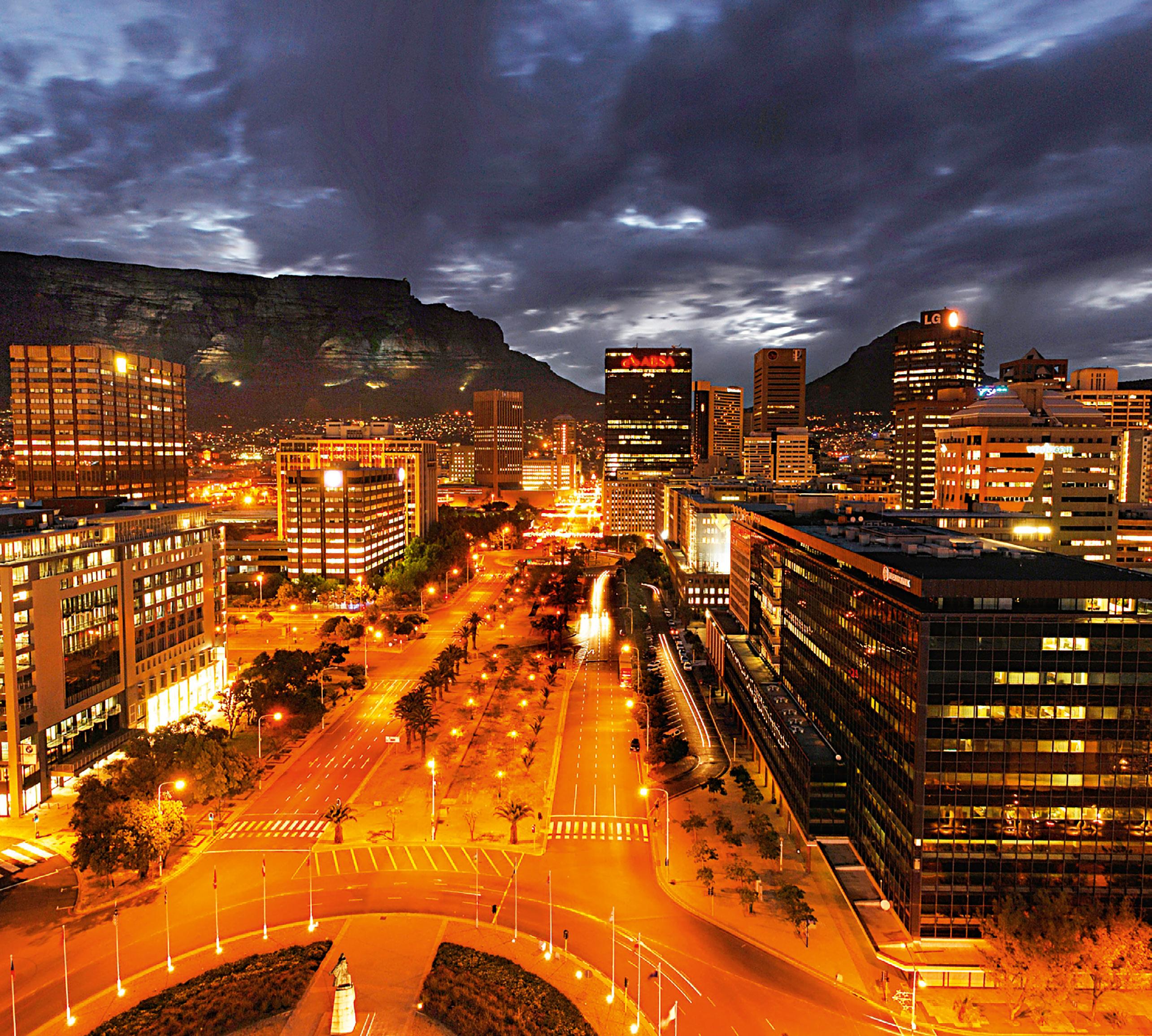



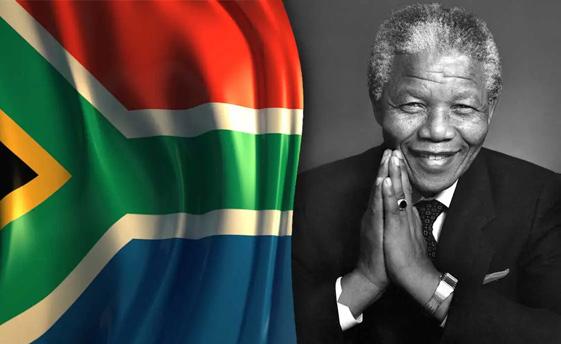

The City of Matlosana Municipality is
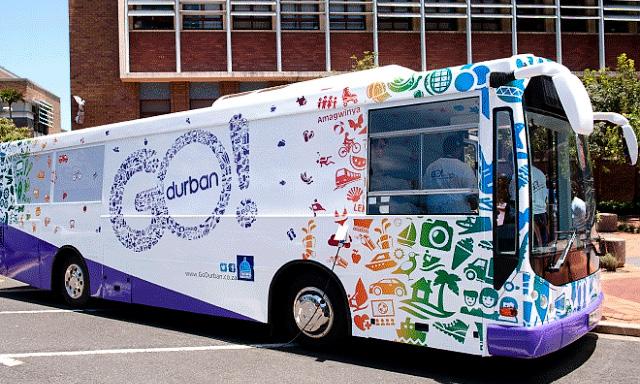
eThekwini Municipality is witnessing a wave of infrastructure developments aimed at enhancing the city's economic resilience and the quality of life for its residents. These initiatives are set to transform eThekwini into a more efficient, sustainable, and livable urban center.
It is the Transformation of the N12 Treasure Route that has unlocked regional opportunities and resulted in massive activity and mobility along the Matlosana portion of the corridor. It has a multi-dimensional character that has created employment, enhanced commuter movement, enhanced investment opportunities, increased economic activity, etc.
WHY VISIT THE CITY OF MATLOSANA?
advanced Intelligent Transport Systems (ITS), which include automated electronic systems for seamless travel, fiber communications, security cameras, and an integrated fare management system. These improvements aim to reduce waiting times to 5-10 minutes during peak hours and 10-30 minutes during off-peak hours, significantly enhancing the commuting experience.
Create unforgettable memories at our quality business and leisure accommodation venues which include conferencing, wedding and spa facilities.
MATLOSANA AS A MEDICAL HUB
carbon emissions, and contribute to a cleaner, more sustainable urban environment.
In response to the devastating floods that struck eThekwini in April 2022, the municipality has received additional funding to rebuild and strengthen its infrastructure. The National Treasury has allocated R1.5 billion to address damages to roads, bridges, stormwater systems, human settlements, and sanitation infrastructure. This funding is crucial for restoring essential services and ensuring the municipality is better prepared for future adverse weather events.
Long-term infrastructure upgrades are designed to support the city's growing population and economic activities, ensuring sustainable development for years to come.
Create unforgettable memories at our quality business and leisure accommodation venues which include conferencing, wedding and spa facilities. The City has a wealth of attractions for visitors:
• Adventure tourism
• Wildlife tourism
• Medical tourism
• Wellness tourism
One of the most ambitious projects currently underway in eThekwini is the Go! Durban integrated public transport network. This R22-billion initiative is designed to provide safe, affordable, and efficient transport for over 700,000 commuters daily. The network integrates various modes of transport, including rail, road, and nonmotorized transport systems, and aims to incorporate existing informal operators into the formal public transport system by 2030.
To us health care is of paramount importance as a healthy city is productive and constitutes prosperity. We boast well-developed medical facilities, which enhances and promotes the competitive advantage of Matlosana as a major Medical Hub in the North West Province. Services include: general and private medical fascilities, casualty/trauma and dental services. Most clinics focus on primary health care services.
The introduction of Go! Durban is expected to revolutionize the public transport landscape in eThekwini. The comprehensive network not only addresses the immediate need for efficient transport but also lays the groundwork for future urban mobility solutions. By integrating various transport modes, the project ensures a cohesive and streamlined commuting experience for residents, promoting a shift from private vehicle use to public transport. This transition is anticipated to alleviate traffic congestion, reduce
The city prides itself on having five private hospitals, two government hospitals, including the largest state hospital in the North West Province and 15 clinics including mobile clinics. It also boasts the only fully contained oncology unit in the North West Province, which offers a comprehensive service at four pathological laboratories and has the latest MRI scanner at the radiology unit.
The recovery efforts include the repair and upgrading of critical infrastructure to improve resilience against future disasters. The municipality has also reprioritized its budget to allocate an additional R600 million for urgent restorations in water and sanitation, electricity, and road services. This strategic reallocation aims to expedite the recovery process and restore normalcy for the affected communities.
N12 Development Route was identified by the municipality as a flagship project for golden opportunities in the following sectors: housing, business, industrial, heritage, mining, tourism, sport as well as recreation.



Agriculture is one of the mainstays of Matlosana, which proudly boasts a region rich with agricultural potential. The emphasis is focused on field crops, such as maize, wheat, sorghum, sunflowers, etc... (climatically suitable with a 70% probability of production success).
The flood recovery efforts underscore eThekwini's commitment to building a resilient urban infrastructure. By prioritizing the repair and upgrading of essential services, the municipality is taking proactive measures to mitigate the impact of future natural disasters. This approach not only ensures the safety and well-being of residents but also fosters confidence among investors and stakeholders, reinforcing eThekwini's position as a robust and dependable urban center.
Aside from attracting investment, the N12 Treasure Route connects communities to the economic hub of Matlosana City. The improved road infrastructure changes the lives of the City’s citizens making it easier to access employment opportunities and other services.
delivery, the municipality aims to create an environment conducive to economic growth and social well-being. The upgrades to water, sanitation, and electricity systems are particularly crucial in supporting the expanding urban population and ensuring that residents have reliable access to basic services. These efforts contribute to a higher quality of life and reinforce the municipality's reputation as a forwardthinking and responsive urban center.
innovation. The improved transport network, robust infrastructure, and enhanced service delivery capabilities make the municipality an attractive destination for investors, entrepreneurs, and skilled professionals. This influx of talent and investment is expected to drive sustained economic growth and development, creating a virtuous cycle of prosperity and opportunity for residents
Beyond immediate disaster recovery, eThekwini is focused on long-term infrastructure improvements to enhance service delivery and economic growth. Key areas of investment include upgrading water and sanitation systems, expanding electricity networks, and improving road infrastructure. These upgrades are designed to support the city's growing population and economic activities, ensuring sustainable development for years to come.
Shoppers can also be spoiled for choice between Matlosana Mall, City Mall, Flamwood Walk Shopping Mall, Tower Mall and other leading shopping centres in Matlosana.
A significant aspect of these improvements is the modernization of the city's water and electricity billing systems to ensure accurate meter readings and efficient revenue collection. This initiative is part of a broader strategy to enhance the municipality's financial health and service delivery capabilities.
The revitalization of essential services is a cornerstone of eThekwini's development strategy. By modernizing infrastructure and improving service
The ongoing infrastructure projects in eThekwini are expected to have substantial economic and social impacts. By improving transport efficiency and connectivity, the Go! Durban project will facilitate easier access to employment opportunities and stimulate local economic activities. Enhanced infrastructure resilience will attract investment, as businesses seek stable and well-serviced environments for their operations.
Agriculture is one of the mainstays of Matlosana, which proudly boasts a region rich with agricultural potential. The emphasis is focused on field crops, such as maize, wheat, sorghum, sunflowers, etc...
Additionally, these projects aim to improve the overall quality of life for residents by providing reliable access to essential services such as water, electricity, and transport. This, in turn, supports the municipality's goal of becoming one of Africa's most livable cities, fostering a sense of community and well-being among its inhabitants.
The economic and social benefits of the infrastructure projects extend beyond immediate improvements. By creating a more connected and resilient urban environment, eThekwini is positioning itself as a hub of economic activity and
The Market is the property of the City of Matlosana and was established in 1980 and it is ranked 8th out of 17 Fresh Markets in the country according to turnover.
With five Market agents, the market supplies customers as far as Botswana, Kimberly and Vryburg.
eThekwini Municipality is undergoing a transformative period, marked by significant investments in infrastructure development and recovery. The Go! Durban integrated public transport network, extensive flood recovery efforts, and the revitalization of essential services are set to drive economic growth and enhance the quality of life for residents. These projects exemplify the municipality's commitment to building a resilient, sustainable, and prosperous urban center. As these initiatives progress, eThekwini stands poised to become a model for urban development in South Africa and beyond.
CONTACT DETAILS
The strategic investments in infrastructure underscore eThekwini's vision for a future-proof urban environment. By prioritizing sustainability, resilience, and inclusivity, the municipality is laying the foundation for a thriving and vibrant urban center. As these projects come to fruition, eThekwini is set to emerge as a leading example of innovative and sustainable urban development, showcasing the potential of forward-thinking infrastructure planning and implementation.
Address: Cnr Braamfisher & OR Tambo Streets, Klerksdorp
Tel: 018 487 8000/ 018 487 8800
Email: communications@ klerksdorp.org
CityofMatlosanaUpdates @MatlosanaCom Cityofmatlosanamunicipal

The City of Matlosana Municipality is situated approximately 164 km South West of Johannesburg, strategically located on the N12 Treasure Route, which is the North West Province’s primary tourism corridor.
The scenic N12 starts from Mpumalanga and is the gateway to the Western Cape Province. The route takes you from eMalahleni, to the vibrant Gauteng Province and the Sterkfontein Cradle of Humankind World Heritage Site, and continues to Potchefstroom, Klerksdorp, Kimberley, Beaufort West, up until George.

Located in the Eastern Cape, the Winnie Madikizela-Mandela Local Municipality stands as a testament to the enduring legacy of Winnie Madikizela-Mandela, one of South Africa’s most iconic figures. Formerly known as Mbizana Local Municipality, it was renamed to honor Madikizela-Mandela's contributions to the fight against apartheid and her role as a stalwart for justice and equality. In celebration of Women’s Month, we explore the historical significance, current leadership, development initiatives, and future prospects of this vibrant municipality.
It is the Transformation of the N12 Treasure Route that has unlocked regional opportunities and resulted in massive activity and mobility along the Matlosana portion of the corridor. It has a multi-dimensional character that has created employment, enhanced commuter movement, enhanced investment opportunities, increased economic activity, etc.
Create unforgettable memories at our quality business and leisure accommodation venues which include conferencing, wedding and spa facilities. The City has a wealth of attractions for visitors:
• Adventure tourism
The renaming of the municipality to Winnie Madikizela-Mandela Local Municipality was a profound commitment to upholding the heritage and values she championed. Born in the village of Mbhongweni in Mbizana, Madikizela-Mandela's life and legacy are deeply intertwined with this region. The
• Wildlife tourism
• Medical tourism
• Wellness tourism
official recognition of the renaming in a provincial government gazette ensures that her legacy is not only remembered but remains an integral part of the community's identity, inspiring current and future generations.
The municipality is led by Mayor Daniswa Mafumbatha, who is committed to advancing the socioeconomic development of the area. The Mayor has been a vocal advocate for leveraging the municipality's rich historical and cultural heritage to promote community development and cohesion, and under her leadership the municipality has undertaken various initiatives to improve local infrastructure, education, and healthcare services, aligning with the broader goals of national development.
Create unforgettable memories at our quality business and leisure accommodation venues which include conferencing, wedding and spa facilities.
MATLOSANA AS A MEDICAL HUB
Under her leadership, the municipality has been ranked among the best-run local authorities in the country, claiming the 2nd spot, according to the 2024 Governance Performance Index (GPI) published recently by Good Governance Africa.
Mayor Mafumbatha's dedication to service, community empowerment and good governance are attributes that are valued in our women local government leaders today, and as we celebrate Women's Month in August, her leadership style that encompasses compassion for human dignity, and her core values of unity, resilience, and empowerment are celebrated in these and other achievements.
To us health care is of paramount importance as a healthy city is productive and constitutes prosperity. We boast well-developed medical facilities, which enhances and promotes the competitive advantage of Matlosana as a major Medical Hub in the North West Province. Services include: general and private medical fascilities, casualty/trauma and dental services. Most clinics focus on primary health care services.
Renaming the municipality to Winnie Madikizela-Mandela honours her legacy and ensures her values remain part of the community's identity.
Nelson Mandela Month in July and Women's Month in August are pivotal periods for the Winnie MadikizelaMandela Local Municipality. During Nelson Mandela Month, the municipality engages in various community service activities, reflecting Mandela's legacy of selfless service. These initiatives often include educational programs, clean-up campaigns, and other community-building activities aimed at fostering a spirit of ubuntu (humanity towards others).
The city prides itself on having five private hospitals, two government hospitals, including the largest state hospital in the North West Province and 15 clinics including mobile clinics. It also boasts the only fully contained oncology unit in the North West Province, which offers a comprehensive service at four pathological laboratories and has the latest MRI scanner at the radiology unit.
In August, the focus shifts to Women's Month, celebrating the achievements and contributions of women in the community and beyond. The municipality, under Mayor Mafumbatha's guidance, hosts events and programs that highlight women's empowerment, address gender-based violence, and promote gender equality. These efforts are in line with the national agenda to recognize and support the vital role of women in society.
N12 Development Route was identified by the municipality as a flagship project for golden opportunities in the following sectors: housing, business, industrial, heritage, mining, tourism, sport as well as recreation.
The Winnie Madikizela-Mandela Local Municipality is not only a region of historical significance but also one of potential economic growth. The


municipality is strategically positioned on the Wild Coast, an area known for its natural beauty and tourism potential. Efforts are underway to boost local tourism, leveraging the region's scenic landscapes and cultural heritage sites.
1. Education and Youth Empowerment:
1. Sustainable Development Goals:

1. Tourism Development:
Agriculture is one of the mainstays of Matlosana, which proudly boasts a region rich with agricultural potential. The emphasis is focused on field crops, such as maize, wheat, sorghum, sunflowers, etc... (climatically suitable with a 70% probability of production success).
The municipality has been actively promoting its tourism sector through various initiatives. This includes the development of eco-tourism projects, cultural heritage tours, and community-based tourism programs. These efforts are aimed at attracting both domestic and international tourists, thereby creating job opportunities and stimulating local businesses.
2. Infrastructure Improvements:
Aside from attracting investment, the N12 Treasure Route connects communities to the economic hub of Matlosana City. The improved road infrastructure changes the lives of the City’s citizens making it easier to access employment opportunities and other services.
Investments in road networks, water supply, and electricity are critical to creating a conducive environment for businesses and improving the quality of life for residents. The municipality has prioritized the upgrading of rural roads to improve connectivity and access to markets. Additionally, ongoing projects to enhance water and sanitation infrastructure are crucial for sustainable development.
3. Agricultural Initiatives:
Shoppers can also be spoiled for choice between Matlosana Mall, City Mall, Flamwood Walk Shopping Mall, Tower Mall and other leading shopping centres in Matlosana.
Agriculture remains a vital part of the local economy. The municipality has implemented programs to support small-scale farmers, including training on sustainable farming practices, provision of farming inputs, and facilitation of market access. These initiatives aim to boost agricultural productivity and improve food security in the region.
The municipality places a strong emphasis on social development programs that aim to uplift the community and improve the overall well-being of its residents.
The municipality has invested in improving educational facilities and resources. Programs such as bursary schemes for tertiary education, after-school support for learners, and vocational training for youth are designed to enhance educational outcomes and equip young people with skills for the job market.
2. Healthcare Services:
Enhancing healthcare services is a priority, with efforts to improve facilities, increase healthcare personnel, and provide better access to medical services, particularly in rural areas. Health awareness campaigns and mobile clinics have been introduced to ensure that healthcare reaches all corners of the municipality.
3. Community Welfare Initiatives:
The municipality has launched various welfare programs targeting vulnerable groups such as women, children, and the elderly. These programs include food security initiatives, shelter for victims of gender-based violence, and support for orphans and vulnerable children. These efforts aim to build a compassionate and supportive community.
Agriculture is one of the mainstays of Matlosana, which proudly boasts a region rich with agricultural potential. The emphasis is focused on field crops, such as maize, wheat, sorghum, sunflowers, etc...
Looking ahead, the Winnie Madikizela-Mandela Local Municipality aims to build on its rich heritage to create a future marked by progress, inclusivity, and innovation. The leader-ship under Mayor Mafumbatha remains committed to addressing the persistent challenges of poverty, unemployment, and inequality. By fostering a culture of unity, resilience, and shared responsibility, the municipality is poised to become a model of community-driven development and sustainable growth.
The municipality is aligning its development plans with the United Nations Sustainable Development Goals (SDGs). This includes initiatives focused on clean energy, sustainable agriculture, and inclusive economic growth. By adopting these global targets, the municipality aims to ensure long-term, sustainable progress.
2. Digital Transformation: Embracing technology and digital solutions is a key part of the municipality’s strategy for future growth. Efforts to improve digital infrastructure, promote e-governance, and support techbased startups are expected to drive innovation and efficiency in service delivery.
3. Public-Private Partnerships:
NATIONAL FRESH PRODUCE MARKET
The Market is the property of the City of Matlosana and was established in 1980 and it is ranked 8th out of 17 Fresh Markets in the country according to turnover.
The municipality recognizes the importance of collaboration with the private sector. By fostering public-private partnerships, it aims to leverage additional resources and expertise to accelerate development projects. These partnerships are crucial for large-scale infrastructure projects and economic initiatives.
Winnie Madikizela-Mandela Local Municipality is a beacon of hope and progress, embodying the values of its namesake. Through dedicated leadership and community engagement, it continues to honor the legacy of Winnie MadikizelaMandela while striving towards a brighter future for all its residents.
With five Market agents, the market supplies customers as far as Botswana, Kimberly and Vryburg.
Focusing on economic development and infrastructure, Winnie Madikizela-Mandela Local Municipality is poised for sustainable and inclusive growth.

The City of Ekurhuleni scooped two awards for excellence in governance during the 2nd Annual South African Local Government Association (SALGA) Municipal Audit Awards held in Johannesburg on Friday, 05 July 2024. This was after scooping four awards for excellent governance at the 2023 inaugural wards ceremony.
The City of Matlosana Municipality is situated approximately 164 km South West of Johannesburg, strategically located on the N12 Treasure Route, which is the North West Province’s primary tourism corridor.
The scenic N12 starts from Mpumalanga and is the gateway to the Western Cape Province. The route takes you from eMalahleni, to the vibrant Gauteng Province and the Sterkfontein Cradle of Humankind World Heritage Site, and continues to Potchefstroom, Klerksdorp, Kimberley, Beaufort West, up until George.
The awards recognized and celebrated municipalities in Gauteng for their exemplary financial management and adherence to the Municipal Finance Management Act (MFMA) for the 2022-2023 financial year as per the Auditor general’s Report.
The awards promote accountability and consequence management, rewarding excellence while addressing mediocrity and maladministration in local authorities.
It is the Transformation of the N12 Treasure Route that has unlocked regional opportunities and resulted in massive activity and mobility along the Matlosana portion of the corridor. It has a multi-dimensional character that has created employment, enhanced commuter movement, enhanced investment opportunities, increased economic activity, etc.
WHY VISIT THE CITY OF MATLOSANA?
Among the dignitaries and key sector stakeholders at the awards were advocate Kholeka Gcaleka, the Public Protector of South Africa and the Auditor General of SA, Tsakani Maluleke, who are both responsible for maintaining governance standards across South African public institutions.
Create unforgettable memories at our quality business and leisure accommodation venues which include conferencing, wedding and spa facilities. The City has a wealth of attractions for visitors:
• Adventure tourism
• Wildlife tourism
• Medical tourism

The City of Ekurhuleni walked away with the award for Reducing Unauthorised, Irregular, Fruitless and Wasteful Expenditure, and also Implementing Consequence Management in the 2023/24 financial year.
Create unforgettable memories at our quality business and leisure accommodation venues which include conferencing, wedding and spa facilities.
MATLOSANA AS A MEDICAL HUB
“We are extremely excited by the achievements as they demonstrate our continued commitment to run a clean and accountable institution,” says City Manager Dr Imogen Mashazi. “A lot of work goes into financial prudence, and we are very fortunate to have team that understands that.”
also motivate us to do more.”
• Wellness tourism
SALGA’s approach to municipal audit outcomes has always advocated for enforcing accountability and consequence management. A carrot and a stick approach – where excellence is rewarded while mediocracy and maladministration are punished – as a strategy to turn local government around.
To us health care is of paramount importance as a healthy city is productive and constitutes prosperity. We boast well-developed medical facilities, which enhances and promotes the competitive advantage of Matlosana as a major Medical Hub in the North West Province. Services include: general and private medical fascilities, casualty/trauma and dental services. Most clinics focus on primary health care services.
The City Manager emphasised that the municipality “remains resolute to always revisit our systems and controls to ensure that we run a tight ship that is guided by the Municipal Finance Management Act among other legislation.” Adding that, “Such recognition
The city is not new to being recognized for its good governance achievements, having walked away with two first-place certificates for the 2021/22 financial year clean audit outcome, and for good record keeping – a critical process in the audit purposes and measuring service delivery achievements. The city then got a second-place award for capital expenditure on the allocated budget, and another second place for revenue collection and management.
The city prides itself on having five private hospitals, two government hospitals, including the largest state hospital in the North West Province and 15 clinics including mobile clinics. It also boasts the only fully contained oncology unit in the North West Province, which offers a comprehensive service at four pathological laboratories and has the latest MRI scanner at the radiology unit.
“We are extremely excited by these achievements as they demonstrate our continued commitment to run a clean and accountable institution."
N12 Development Route was identified by the municipality as a flagship project for golden opportunities in the following sectors: housing, business, industrial, heritage, mining, tourism, sport as well as recreation.
- City Manager, Dr Imogen Mashazi.

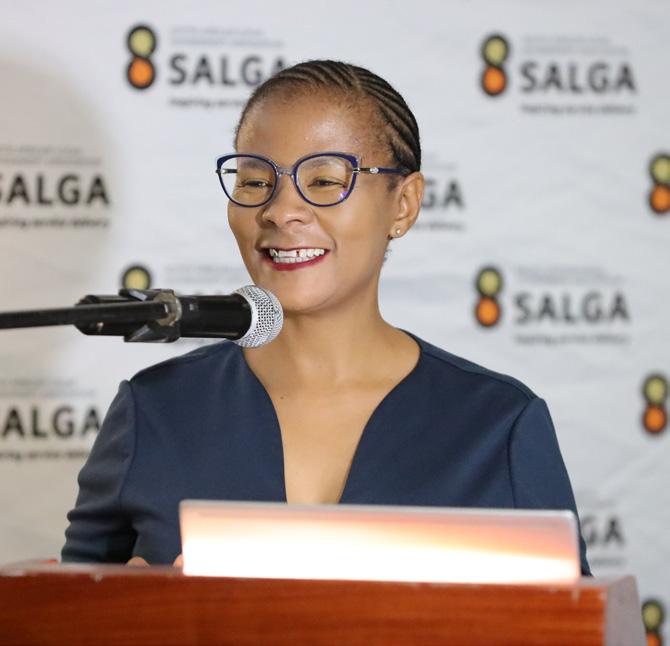
Aside from attracting investment, the N12 Treasure Route connects communities to the economic hub of Matlosana City. The improved road infrastructure changes the lives of the City’s citizens making it easier to access employment opportunities and other services.
Under the leadership of Mayor Cllr. Sheila Mabale-Huma, the second woman in democratic South Africa to hold that position, Rustenburg has made significant strides in infrastructure, social development, and economic growth. As we celebrate Women's Month, it is fitting to highlight the efforts and achievements of the municipality under the leadership of a dynamic woman.
Shoppers can also be spoiled for choice between Matlosana Mall, City Mall, Flamwood Walk Shopping Mall, Tower Mall and other leading shopping centres in Matlosana.
Rustenburg... committed to inclusivity, empowerment and sustainable growth for the betterment of all who live there.
One of the most notable achievements of the Rustenburg is its commitment to improving infrastructure. The recent completion of the Rustenburg Rapid Transport (RRT) system, which includes modern bus services and upgraded road networks, has significantly enhanced the mobility of residents. This project not only reduces traffic congestion but
also provides a reliable and efficient public transport system, contributing to the economic vitality of the region.
Additionally, the municipality has invested in the upgrading of water and sanitation facilities. These improvements are crucial in ensuring that all residents have access to clean water and proper sanitation, which are fundamental to public health and quality of life.
Under Mayor Mabale-Huma's leadership, the municipality has prioritized economic development and job creation. The establishment of the Rustenburg Industrial Zone is a key initiative aimed at attracting investment and promoting industrial growth. This zone provides a conducive environment for businesses to thrive, offering incentives such as tax breaks and infrastructure support.
Agriculture is one of the mainstays of Matlosana, which proudly boasts a region rich with agricultural potential. The emphasis is focused on field crops, such as maize, wheat, sorghum, sunflowers, etc...
Furthermore, the municipality has launched several programs aimed at supporting small and medium-sized enterprises (SMEs). These programs provide training, funding, and mentorship to budding entrepreneurs, enabling them to establish and grow their businesses. This focus on SMEs is critical in creating jobs and stimulating local economic growth
Mayor Mabale-Huma has also been a strong advocate for social development and community upliftment. The


municipality has implemented numerous programs to improve the quality of education, healthcare, and social services.
NATIONAL FRESH PRODUCE MARKET
One such initiative is the establishment of community learning centers, which provide adult education and skills training. These centers are instrumental in equipping residents with the skills needed to secure employment and improve their livelihoods. The municipality has also partnered with local NGOs to provide healthcare services, including mobile clinics that reach underserved areas.In addition, the municipality has focused on youth development through sports and recreational programs. These programs not only promote physical health but also foster a sense of community and belonging among the youth.
The Market is the property of the City of Matlosana and was established in 1980 and it is ranked 8th out of 17 Fresh Markets in the country according to turnover.
With five Market agents, the market supplies customers as far as Botswana, Kimberly and Vryburg.
Looking ahead, the Rustenburg Local Municipality aims to build on its successes and address ongoing challenges. Plans are underway to further expand the RRT system, enhance waste management facilities, and promote green energy solutions. These efforts are aligned with the broader goals of national development and sustainability.
CONTACT DETAILS
Address: Cnr Braamfisher & OR Tambo Streets, Klerksdorp
Tel: 018 487 8000/ 018 487 8800
The municipality's focus on infrastructure development, economic growth, and social upliftment highlights the significant strides made in improving the quality of life for its residents. As we celebrate Women's Month, the achievements of this municipality stand as a testament to the power of visionary leadership and the potential for positive change.
Email: communications@ klerksdorp.org
CityofMatlosanaUpdates @MatlosanaCom Cityofmatlosanamunicipal

The City of Matlosana Municipality is situated approximately 164 km South West of Johannesburg, strategically located on the N12 Treasure Route, which is the North West Province’s primary tourism corridor.
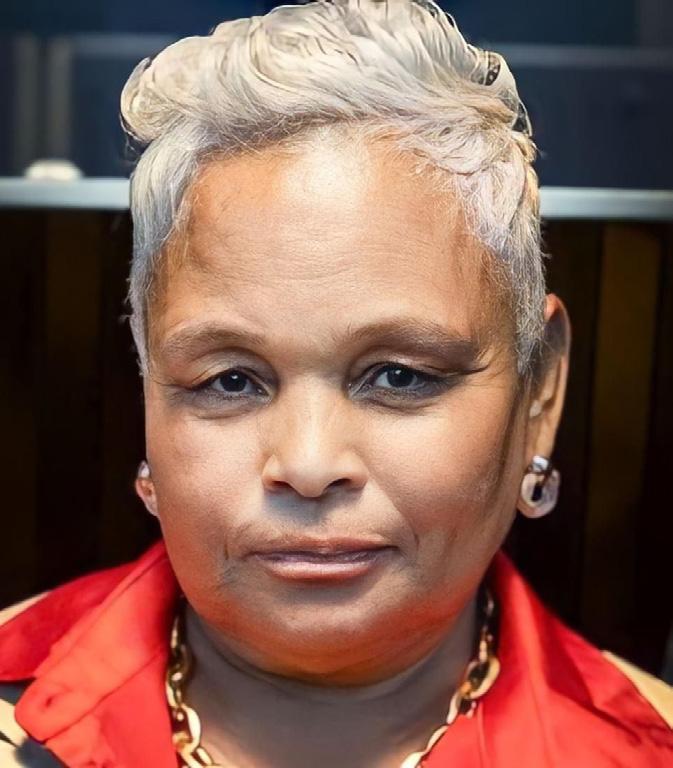
Speaker of Council: Cllr. Margaret Arnolds
The scenic N12 starts from Mpumalanga and is the gateway to the Western Cape Province. The route takes you from eMalahleni, to the vibrant Gauteng Province and the Sterkfontein Cradle of Humankind World Heritage Site, and continues to Potchefstroom, Klerksdorp, Kimberley, Beaufort West, up until George.
In a heartfelt initiative, the Speaker of Council, Cllr. Margaret Arnolds, has called on residents and stakeholders in Johannesburg to participate in the #ReadForMandela Book Donation Drive. This campaign aims to collect over 106 books to celebrate what would have been Nelson Mandela’s 106th birthday.
It is the Transformation of the N12 Treasure Route that has unlocked regional opportunities and resulted in massive activity and mobility along the Matlosana portion of the corridor. It has a multi-dimensional character that has created employment, enhanced commuter movement, enhanced investment opportunities, increased economic activity, etc.
WHY VISIT THE CITY OF MATLOSANA?
This drive embodies his belief that education is the most powerful weapon to change the world. The collected books will be donated to under-resourced libraries, schools, and Early Childhood Development Centres, in partnership with the City’s Department of Community Development, Gauteng Department of Education, and Department of Social Development.
Create unforgettable memories at our quality business and leisure accommodation venues which include conferencing, wedding and spa facilities. The City has a wealth of attractions for visitors:
• Adventure tourism
• Wildlife tourism
• Medical tourism
to educational resources, the campaign aims to foster cognitive development, critical thinking, and empathy. For many in underserved communities, access to books is limited, creating barriers to education and personal development.
According to the 2021 Progress in International Reading Literacy Study (PIRLS) report, more than 80% of grade 4 pupils in South Africa cannot read and write for meaning. By providing books through this donation drive, the initiative seeks to bridge this gap and offer resources that can change lives.
The #ReadForMandela Book Donation Drive is more than just a collection of books; it’s a movement to perpetuate Mandela's vision of an educated and empowered society. Contributing to this drive means joining a global effort to bridge educational gaps and foster a brighter future for all.
Create unforgettable memories at our quality business and leisure accommodation venues which include conferencing, wedding and spa facilities.
#ReadForMandela Drive
MATLOSANA AS A MEDICAL HUB
and shared responsibility, bringing people together for a common cause.
• Cultural Awareness: Exposing readers to different cultures and perspectives promotes understanding and empathy, aligning with Mandela’s commitment to diversity and respect.
Reading is a powerful tool for change, and promoting literacy is a fitting way to honor Nelson Mandela’s legacy. A book donation drive provides access to valuable resources and instills a love of reading in those who may not have had the opportunity otherwise.
By contributing to such initiatives, we help create a more informed, compassionate, and empowered society, reflecting the ideals that Madiba stood for throughout his life. In his memory, let us continue to champion the transformative power of education and reading for all.
• Wellness tourism
The #ReadForMandela initiative seeks to honor Mandela’s enduring legacy of education and empowerment. By promoting literacy and providing access
• Access to Education: Many schools and libraries lack resources. This drive will help supply valuable materials, enhancing educational offerings.
• Promoting Literacy: Literacy is foundational to education and personal empowerment. By increasing access to books, literacy rates can improve, helping individuals develop essential skills for success.
• Community Engagement: This drive fosters a sense of community
To us health care is of paramount importance as a healthy city is productive and constitutes prosperity. We boast well-developed medical facilities, which enhances and promotes the competitive advantage of Matlosana as a major Medical Hub in the North West Province. Services include: general and private medical fascilities, casualty/trauma and dental services. Most clinics focus on primary health care services.
The city prides itself on having five private hospitals, two government hospitals, including the largest state hospital in the North West Province and 15 clinics including mobile clinics. It also boasts the only fully contained oncology unit in the North West Province, which offers a comprehensive service at four pathological laboratories and has the latest MRI scanner at the radiology unit.
“Reading is not just about acquiring knowledge but also about fostering empowerment, improving livelihoods, and advancing social progress in underdeveloped societies,” stated, Vusimuzi Gumbi, Spokesperson in the Office of the Speaker of Council in the City of Joburg.
“When we read, we are able to travel to many places, meet many people and understand the world.”
- Former President Nelson Rolihlahla Mandela
N12 Development Route was identified by the municipality as a flagship project for golden opportunities in the following sectors: housing, business, industrial, heritage, mining, tourism, sport as well as recreation.


Processes
Systems
Data Technology

In South Africa and communities worldwide, the need for robust road infrastructure is more critical than ever. At Komatsu, we acknowledge these challenges and we are actively working to overcome them.
As a leading manufacturer and supplier of capital equipment we are committed to providing you with equipment to ensure higher returns with peace of mind.
Our market-leading 20 tonne hydraulic excavator PC210-MO is more productive, powerful and economical and offers our customers improved operator safety and comfort with the latest cab-based information technology.
Safety and comfort
Creating value together to address South Africa’s road infrastructure needs and beyond.